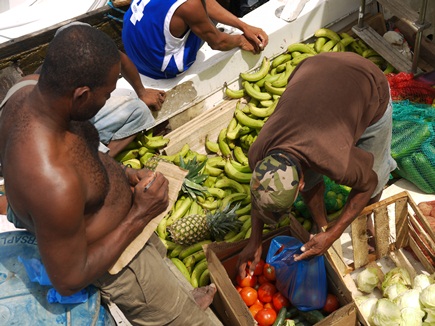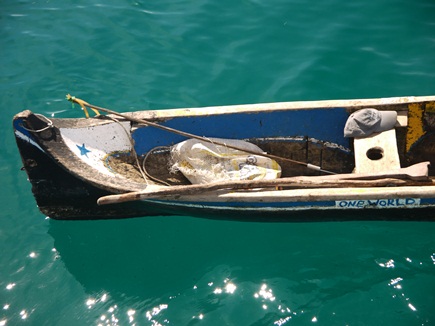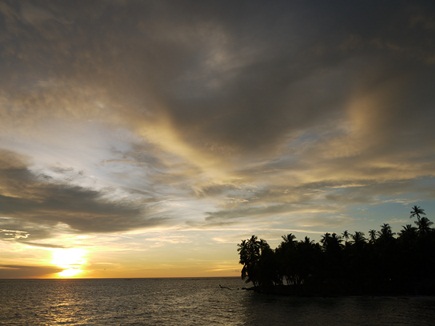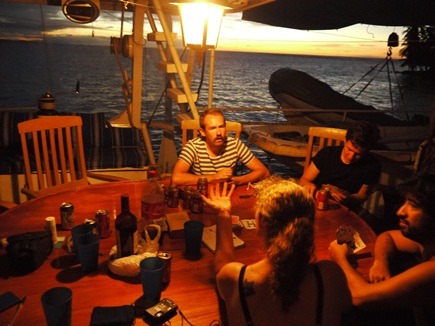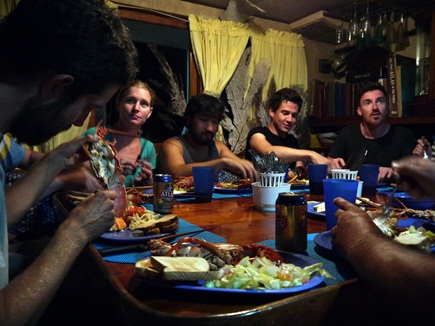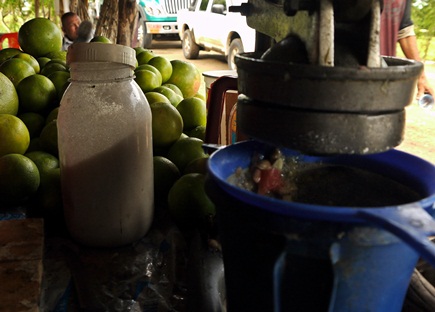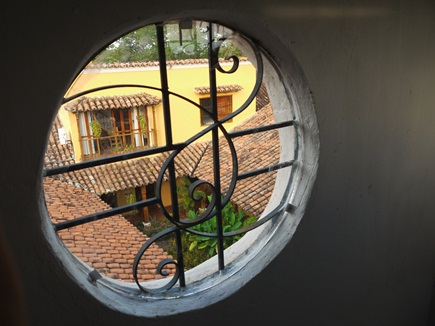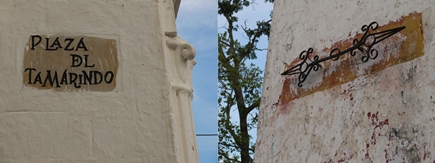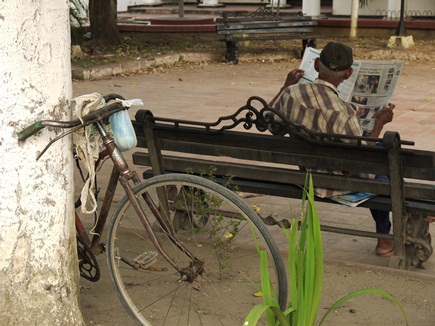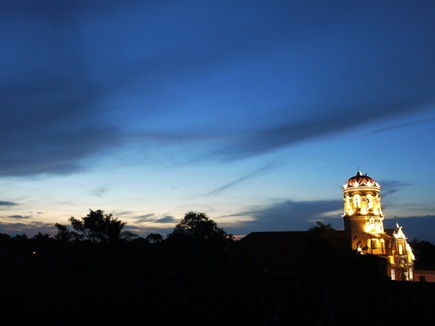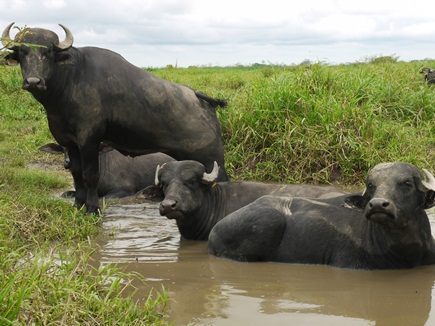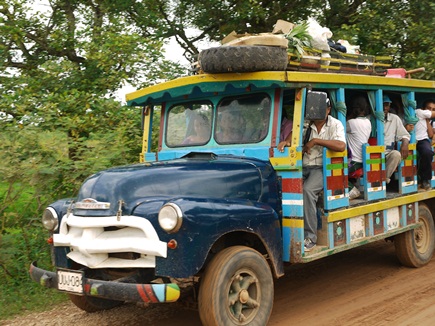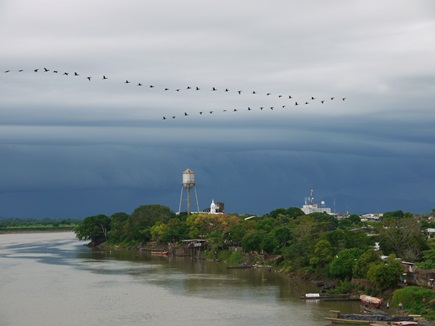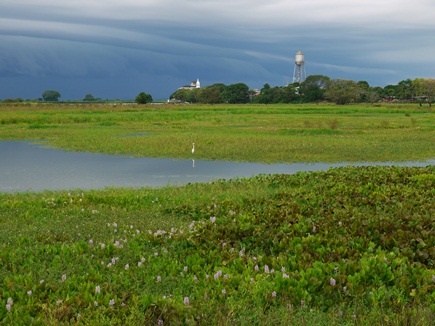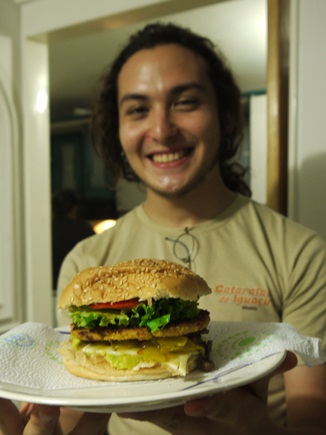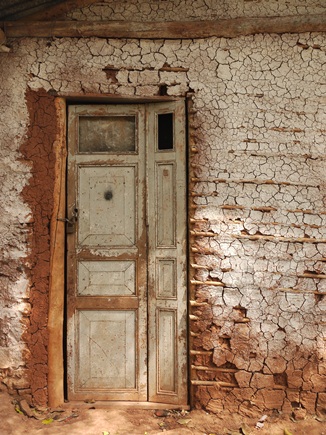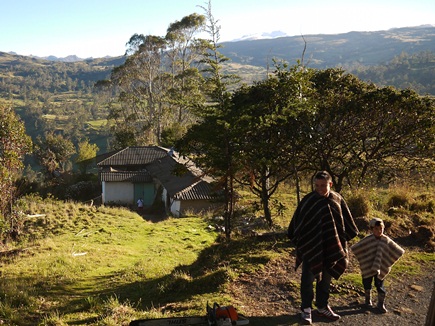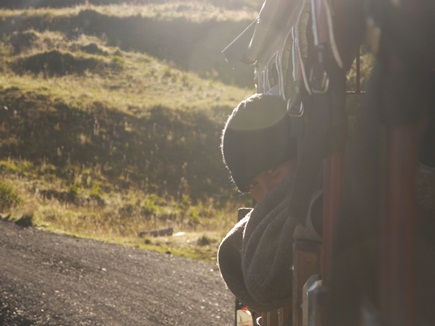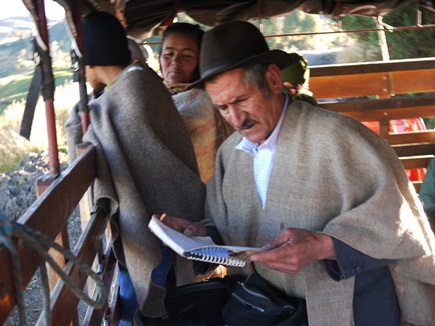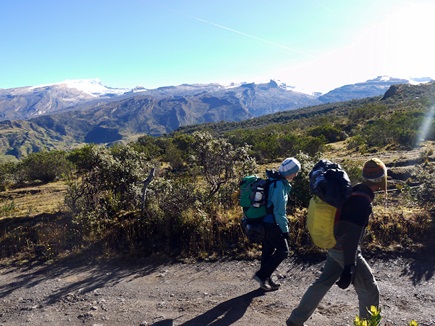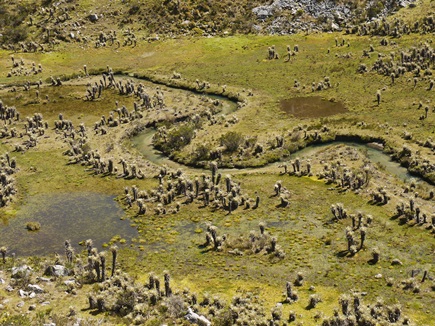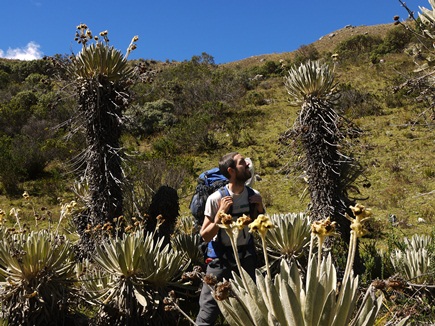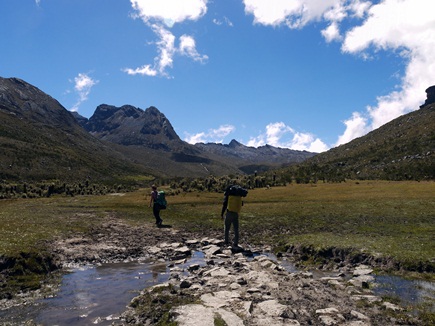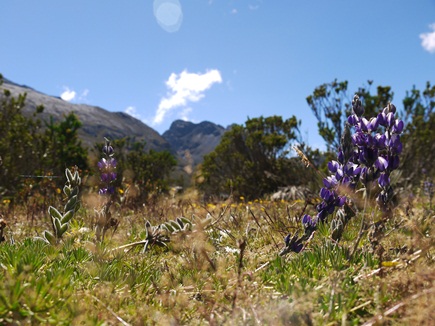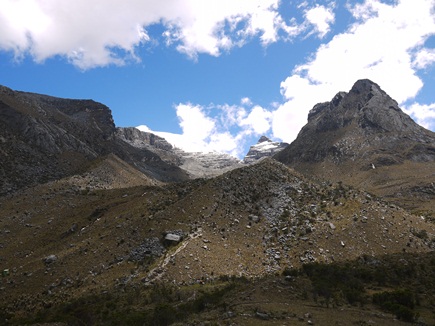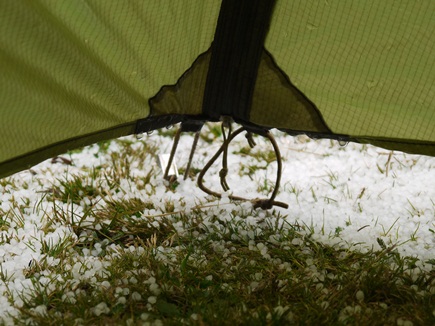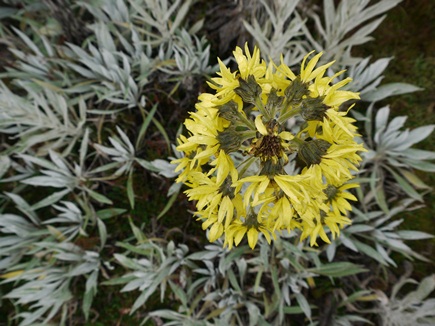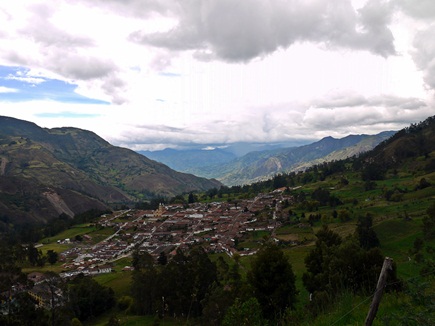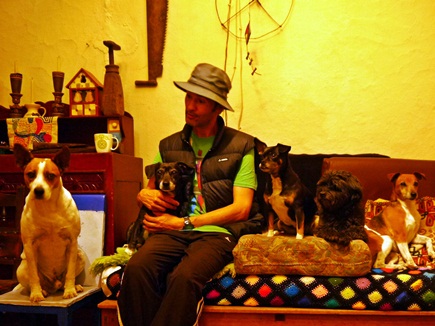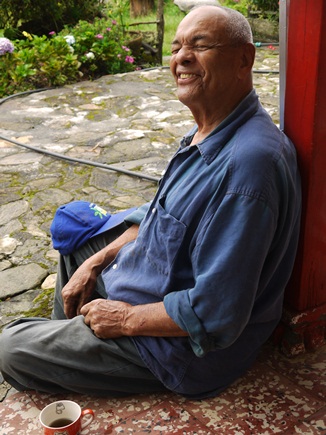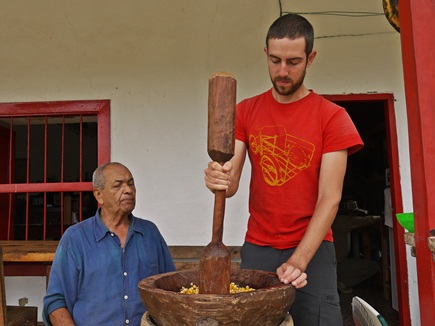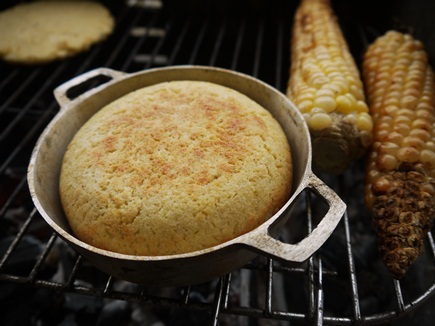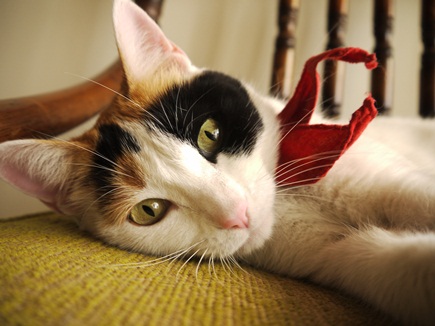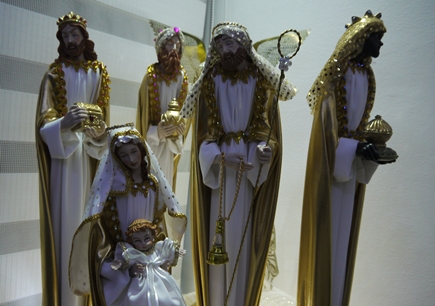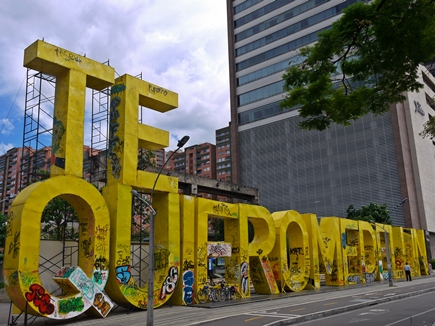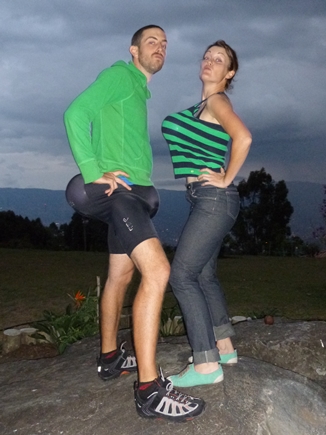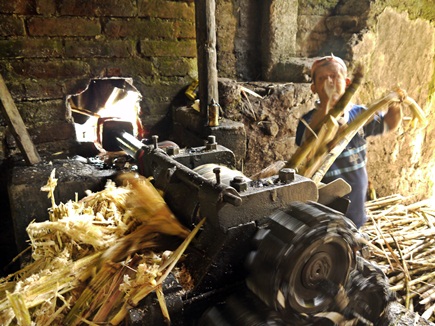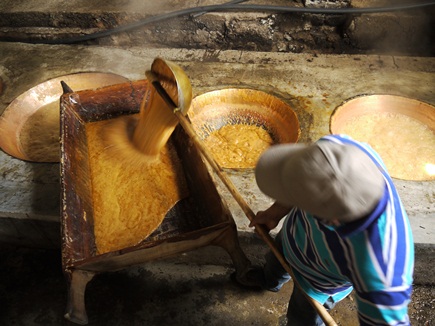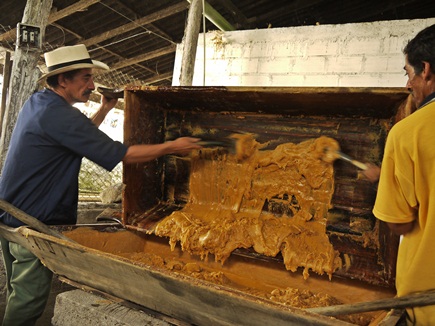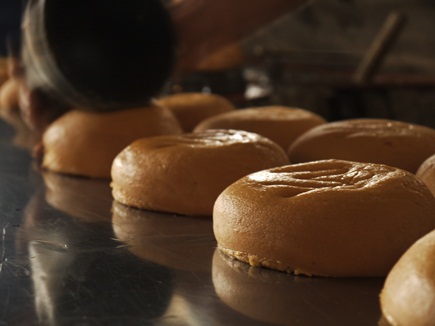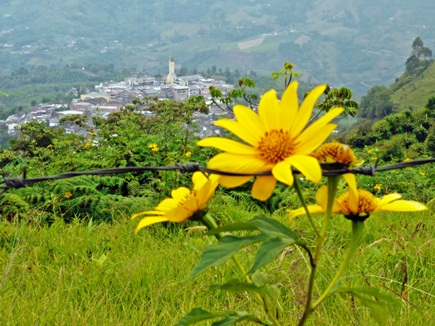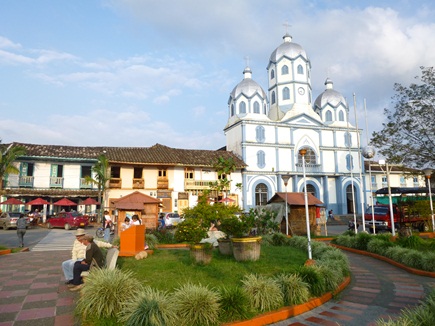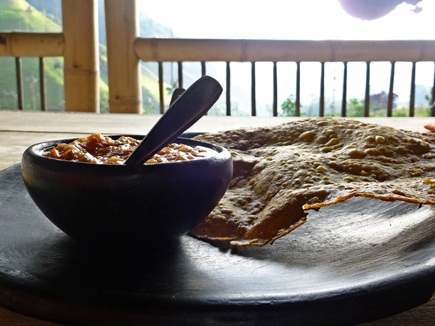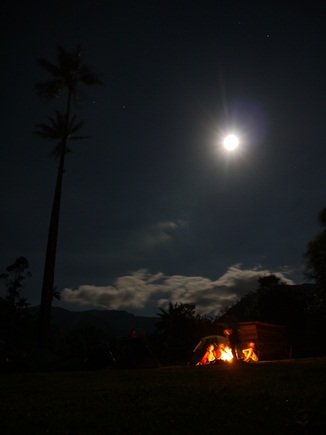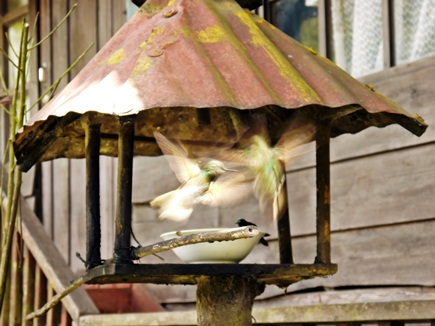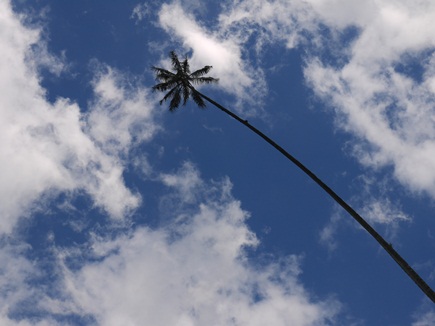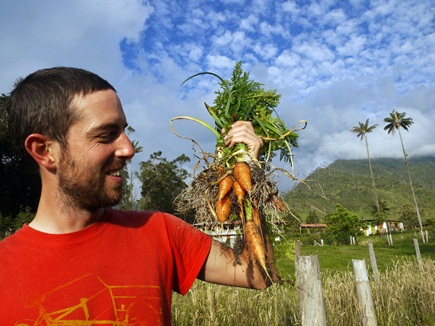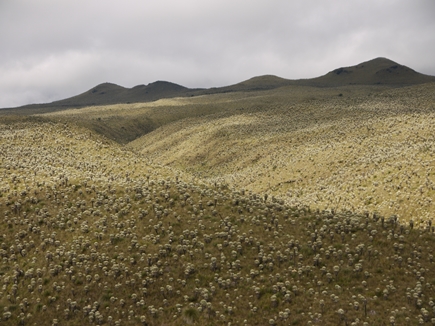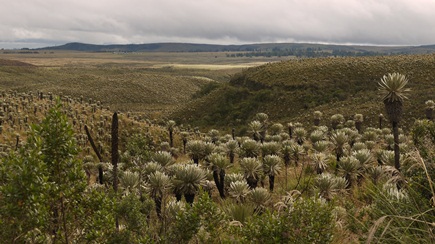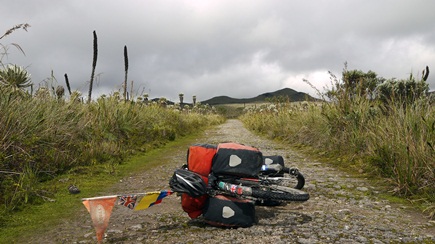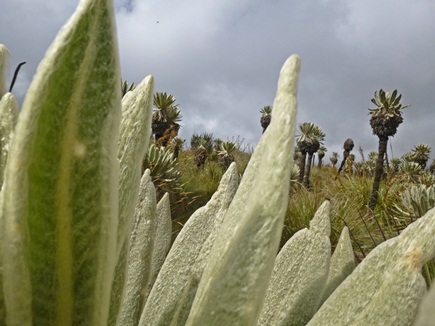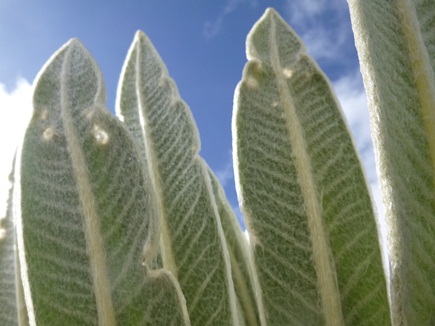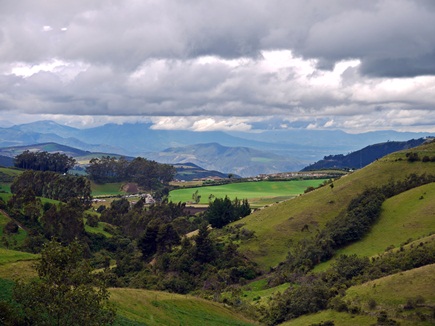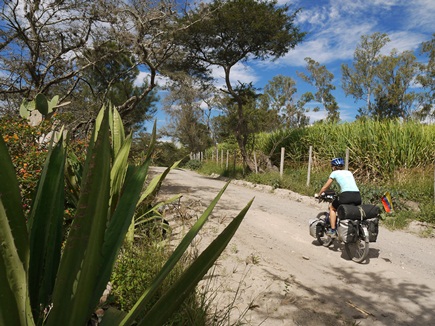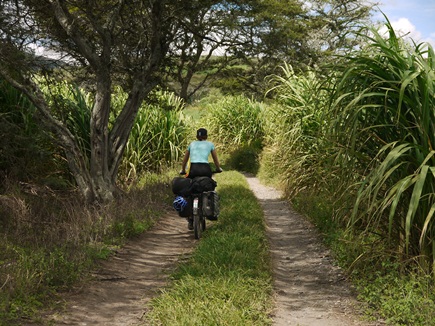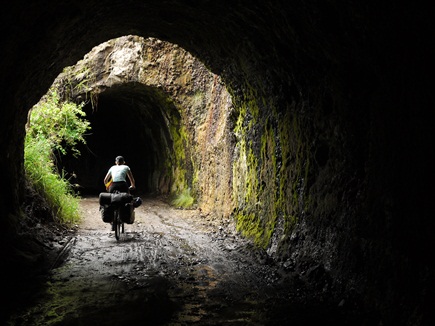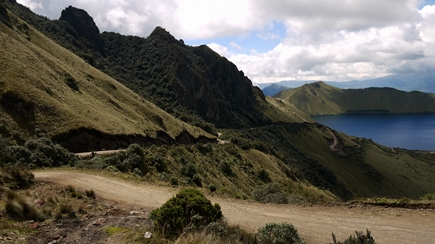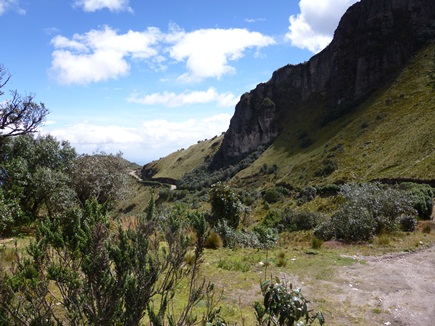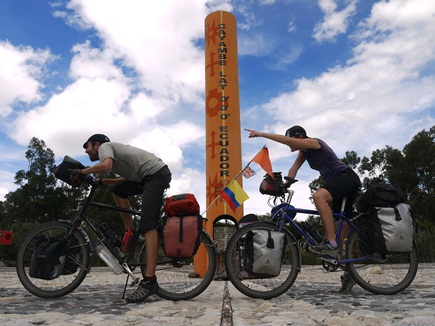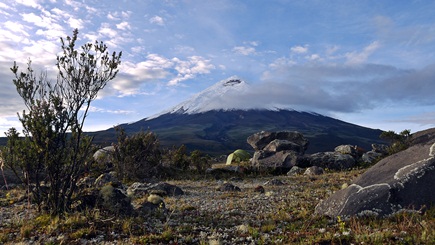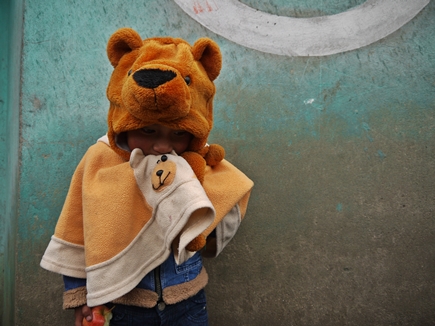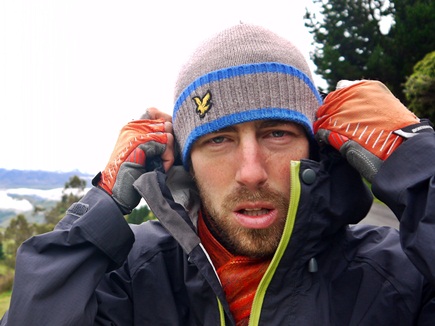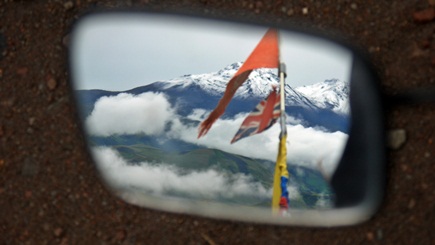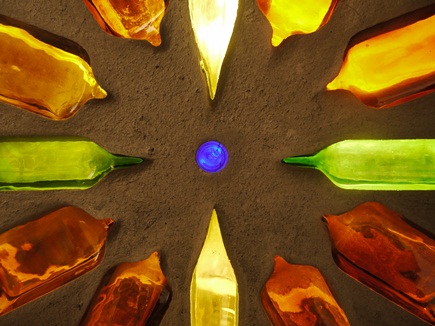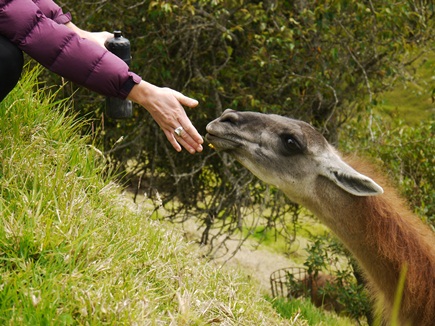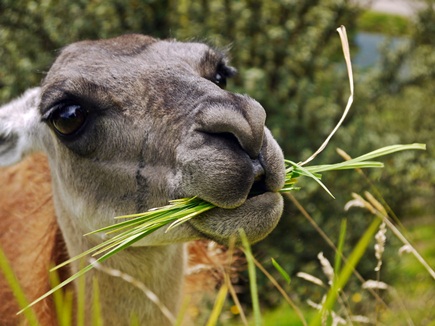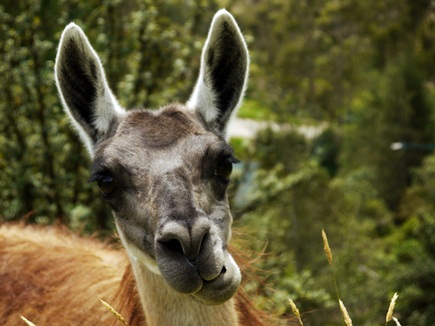Sailing in the San Blas
August 31st, 2012
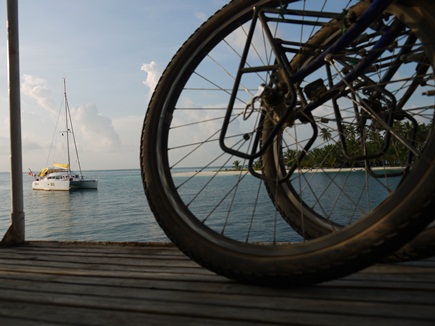
So we set sail from El Porvenir, Panamá to Cartagena, Colombia. The fact that the Darién Gap between Panamá and Colombia is an inhospitable and dangerous place to be riding a bike was the perfect excuse for us to load the bikes onto a boat and for James' brother Ed to join us for a holiday cruise across the Caribbean to the start of our next cycling leg in South America.
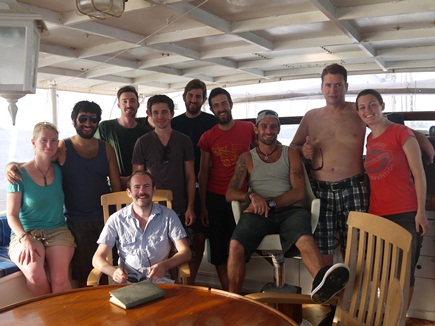
The eleven of us (Seamus is hiding!) who sailed together on the M/S Indpendence. A mix of nationalities and stories…we all rubbed along together very nicely. The boat has space for twenty four people but we were all grateful for it being less than half full.
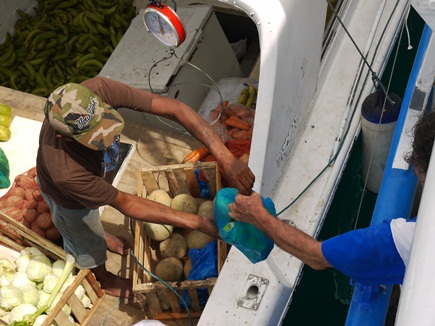
Once we were on board for our five day journey, the captain also needed to take on supplies. Handily, the fruit and veg boat pulled up alongside the Independence and he did a little bit of shopping….
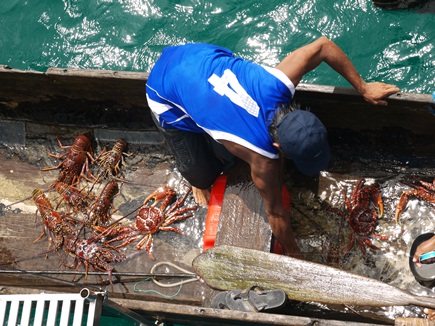
Then it was time to visit the next shop. This time it was the lobster man who was selling his catch from a dugout canoe. Our captain Michel bought us a lobster feast for the first night on board.
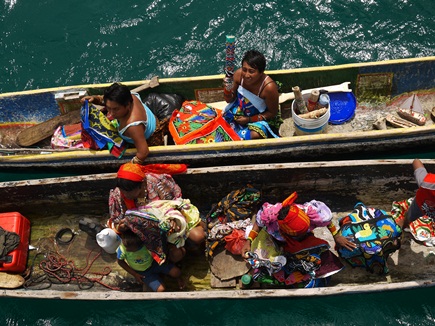
We spent three days sailing in the San Blas, a collection of 378 islands just off the coast of Panamá. 49 of the islands are home to the indigenous Kuna tribe who make their living fishing and selling food and souvenirs to boats like ours….
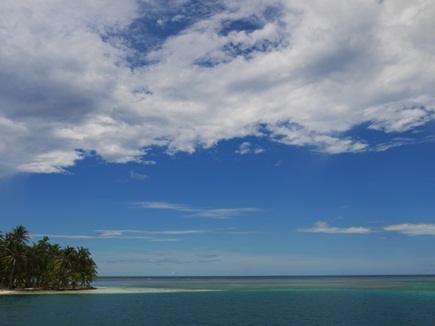
…while the uninhabited islands are just cocunut trees and blinding white sand. Close your eyes and think of your typical “tropical island paradise”…yep, exactly. I felt like we'd stepped into the pages of a luxury travel brochure when we woke up each morning to scenes like this.
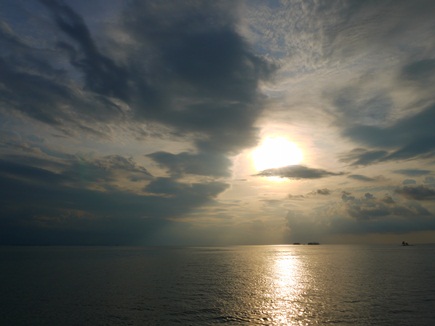
The days then took on a hypnotically laid back routine; spending our time basking in the sunshine and bathing in the pristine Caribbean: snorkelling, kayaking, eating and reading.
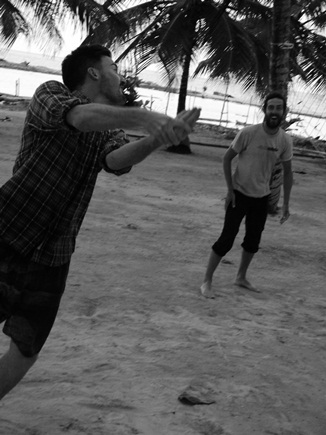
A little more activity on the evening of day two as we headed to one of the islands for a beach bbq. The more energetic of us dabbled with a spot of beach volleyball – Australian Mike showing us how it's done!
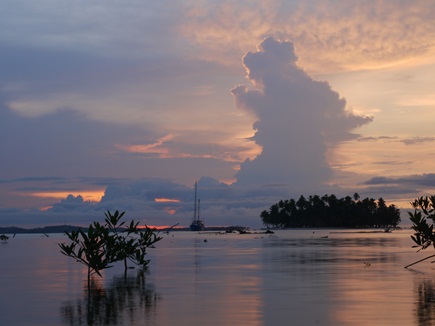
Having delicious grilled fish on the island, we could look back and admire our yacht from afar: the M/S Independence bobbing in the water as the sun goes down.
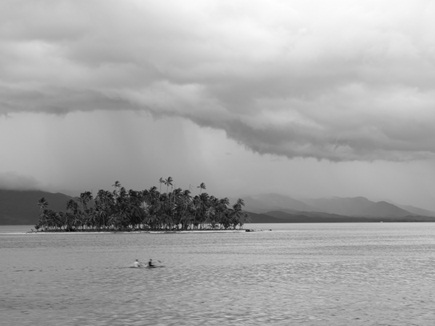
Dolphins came to visit on day three. Most of us watched from the boat but Mike and Seamus were lucky enough to be out on the kayak and gave chase for a close up view.
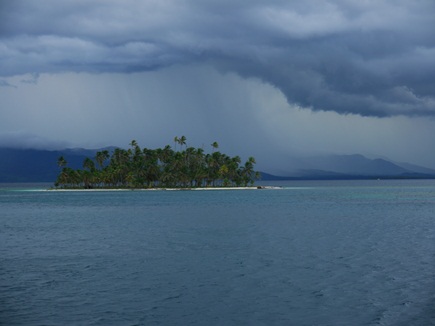
The dolphins beat a hasty retreat as black clouds started to gather; we could see a storm brewing and then someone spotted a tornado on the distant horizon. I half expected the captain to shout “batten down the hatches”! He wasn't quite so melodramatic but it was definitely time to move away from the San Blas and set sail for Colombia.
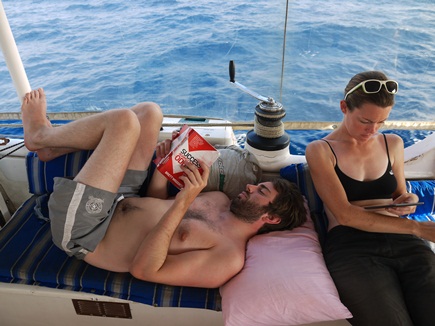
The storm never reached us and a calm day of open water sailing meant nothing more to do except read…
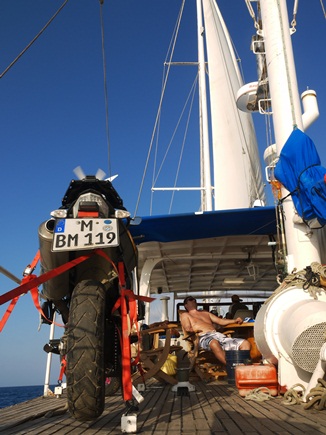
…and sleep. We weren't the only ones using the boat as a delivery service. In between snoozing on deck, Marcus kept close watch on his motorbike that he was shipping over to Colombia from Germany.
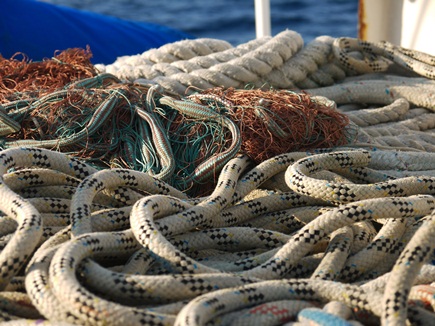
The rest of us had little to do as captain Michel took charge and navigated across the open water. It was a relief not to have to helplessly tackle ropes, sails and nautical language as we had done on the Sea of Cortez in Mexico back in December last year.
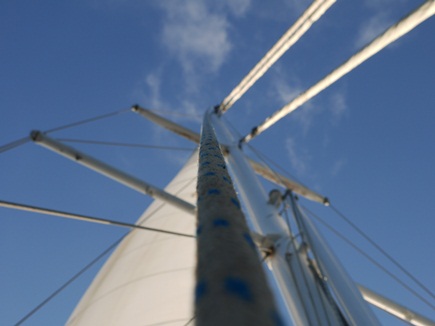
Despite being a sailing boat the wind wasn't right and we did the entire journey using the motor. Michel proclaimed this was the calmest crossing he had made in forty years – much to my relief; the sea sickness I was dreading never came.
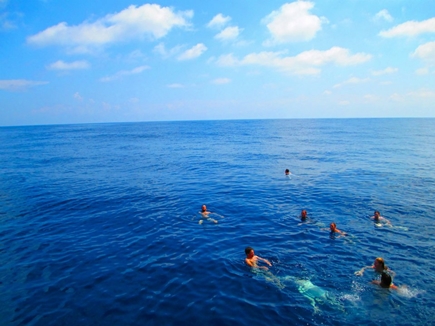
When Michel cautiously offered us the chance to swim in open water, peppered with warnings of sharks and other beasties, we jumped at the chance to take a delicious dip in the vast ocean. Thankfully all eleven of us came back out in one piece. (Photo: Dean Murphy)
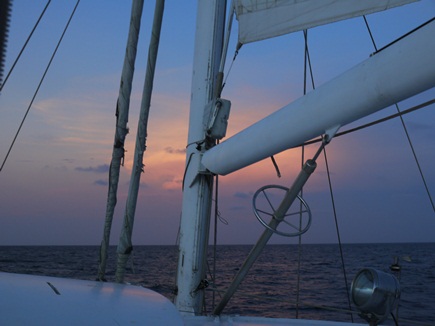
We made quick time sailing under the motor and as the sun went down on a full day spent in open water we were only a few hours from Cartagena, where we slept in the harbour.
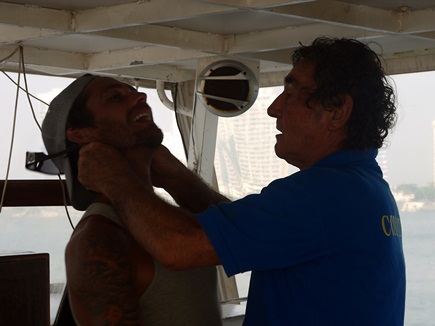
The next morning, before we unloaded, there was just time for our quirky captain Michel to show Dean and the rest of a us a few essential self defence moves for survival in Colombia, and then we went our separate ways.
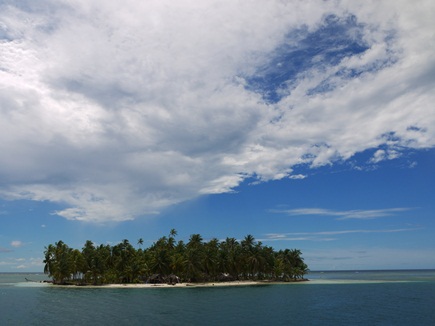
A final, gratuitous shot of the islands we fell in love with. The memorable boat journey was well worth the expense; blessed with fine weather, capable crew, good people, great food and exquisite scenery we couldn't have wished for a finer way to travel from one continent to the next.
Sarah
La Guajira: North meets South
September 12th, 2012
Snapshots from the second half of Ed’s trip: a journey north into the desertscape of the Peninsula de la Guajira, the most northerly tip of South America, followed by a side trip to La Mina, in the foothills of the Sierra Nevada.
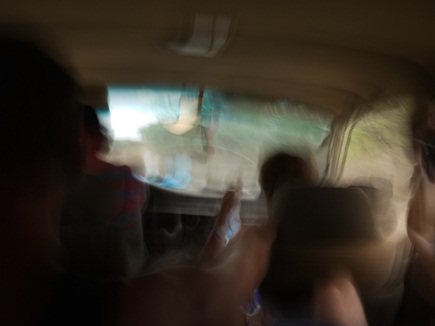
From two wheels to four (by four) – double the discomfort
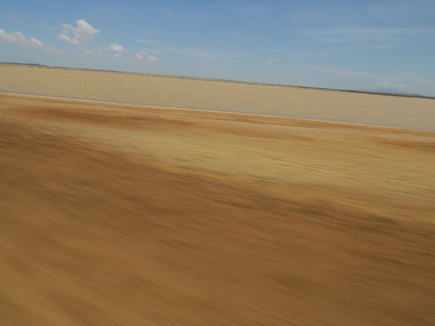
fleeting vistas distract: arid desert
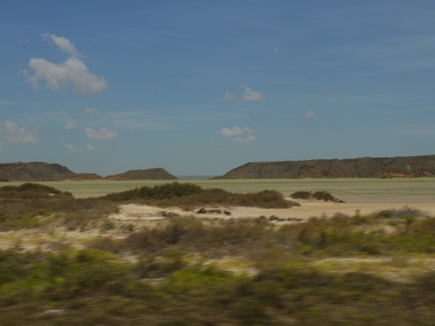
and hidden coves.
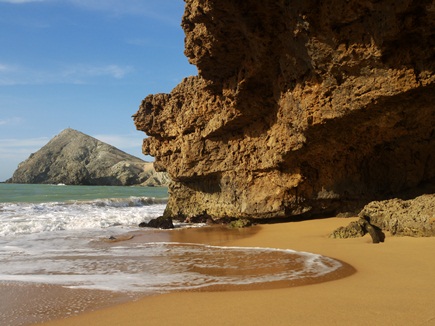
Guajira colours: burnt orange cliffs meet turquoise sea
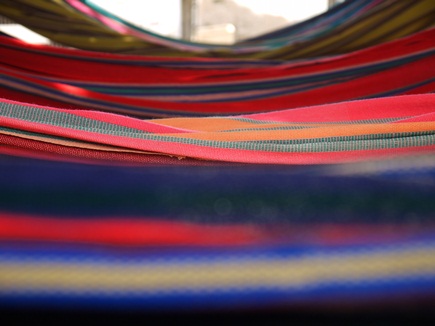
rainbow hammocks
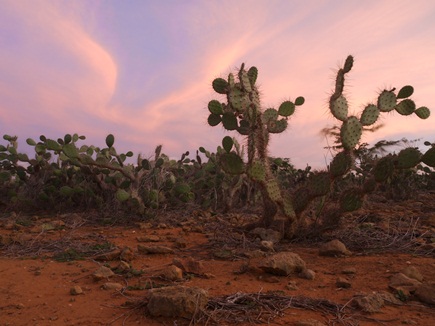
deep red earth
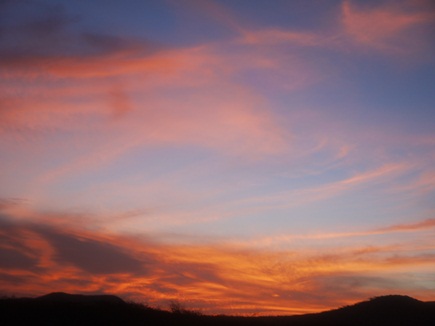
and fiery skies.
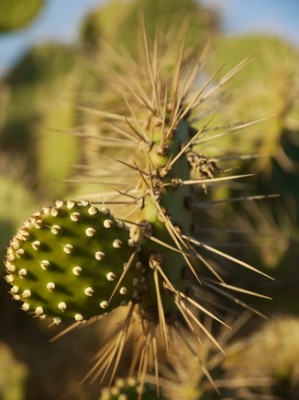
Textures: the spiky
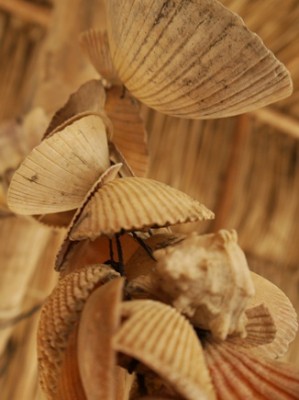
the weathered
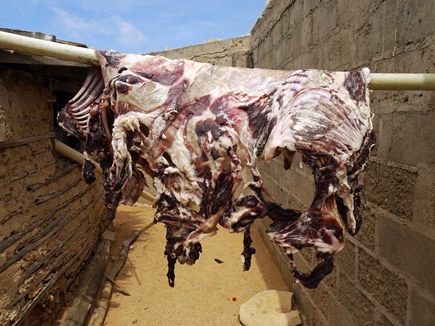
the leathery
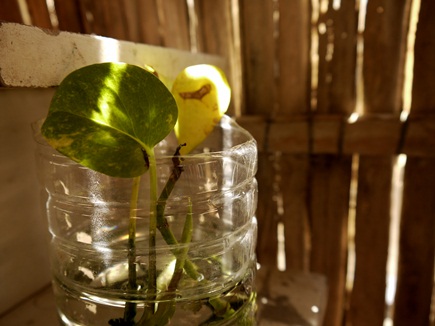
and the smooth.
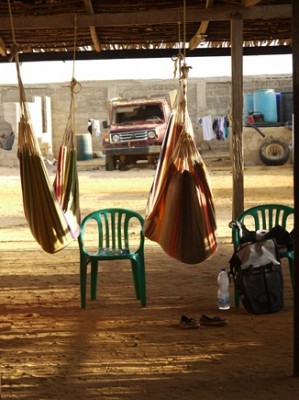
Settling into desert accommodation
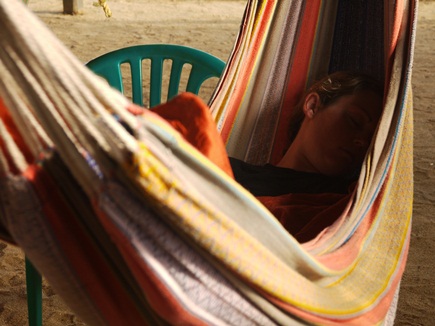
and adjusting to desert pace.
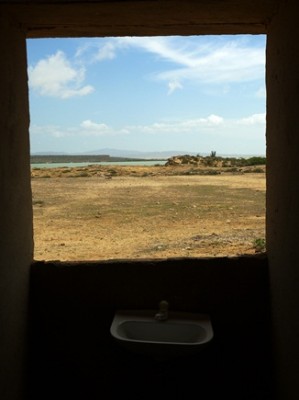
Facilities with a view
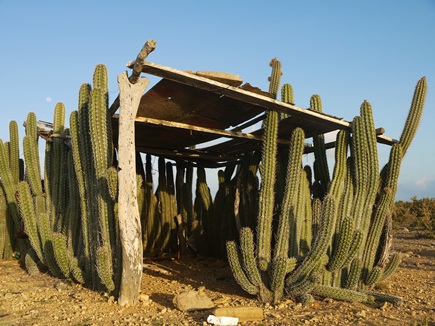
Admiring the penthouse suite
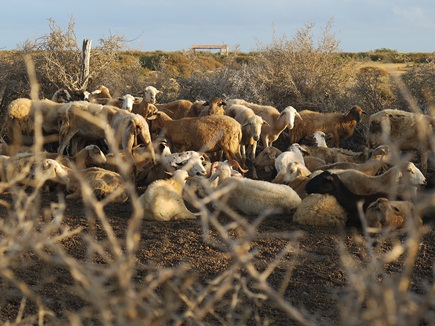
and meeting the neighbours.
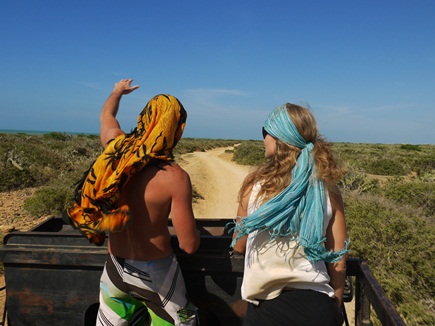
Heading north in style
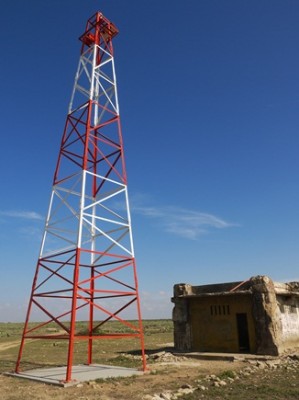
past the lighthouse
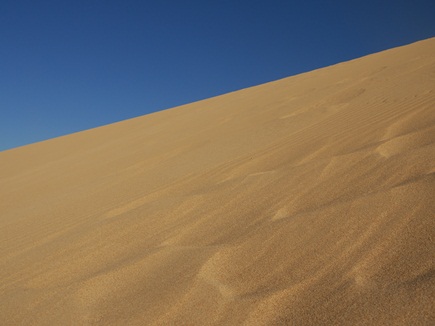
Mountains of sand
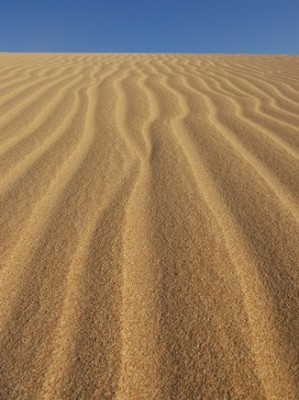
shaped only by the wind
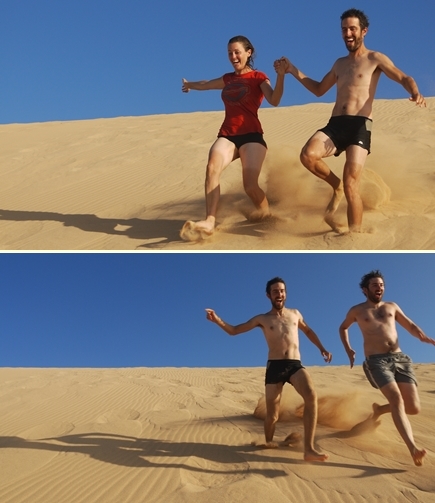
and our feet, running, running…
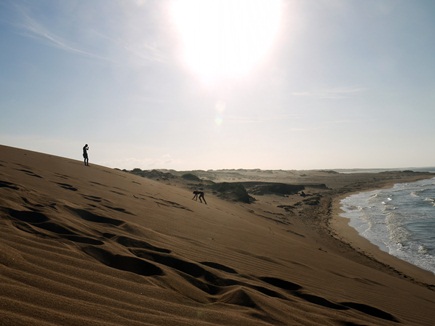
…until the land runs out. A new continent starts and ends
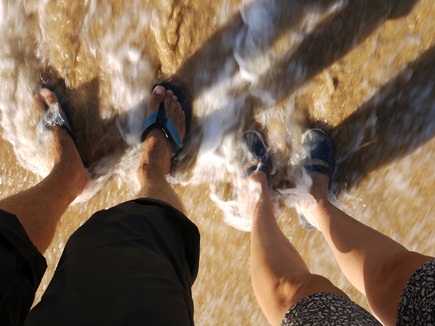
In the absence of tyres, we dip our toes
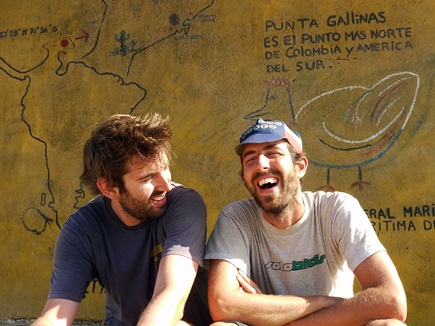
Only 17,000km to Patagonia
One last sunset
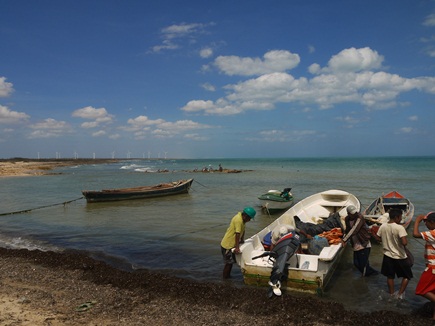
before a smoother ride back south
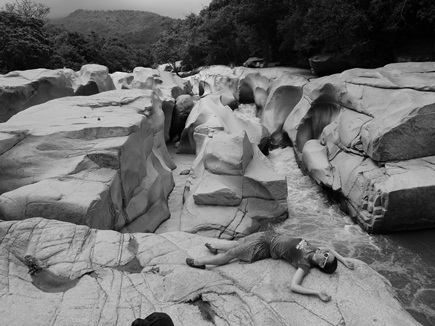
and a mountain detour. Naturally carved sunbathing
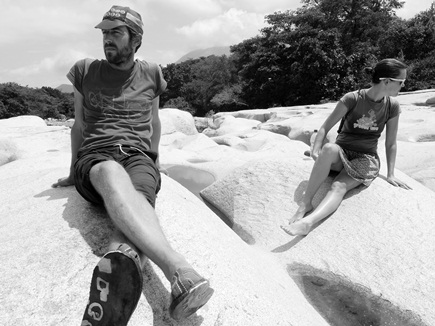
lounging
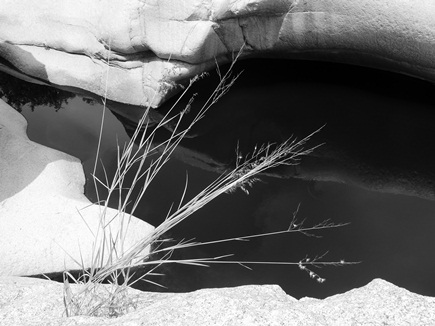
and reflecting.
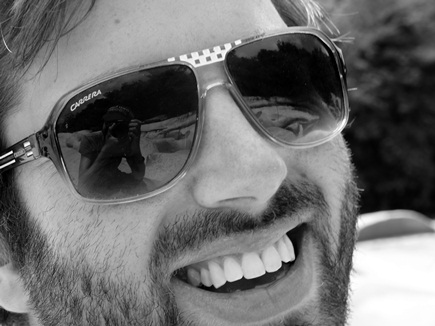
Hasta la proxima, Eduar Vuchier…
James
Cartagena to Bucaramanga – via the swamps
October 1st, 2012
For a supposed cycling trip, sometimes we seem to be very good at avoiding our bikes. With Ed’s visit and then some serious bike faffing and mechanical manoeuvring in Cartagena (my hub finally returned and was fitted), suddenly it was mid September and another month had passed by without our feet touching the pedals. We’d definitely found a limit to our personal comfort boundaries in Cartagena. A pleasant enough city, it’s stiflingly hot and I was more than ready to hit the road.
Colombia’s mountains lay ahead, waiting for us with famously tough cycling along switchback roads at high altitude but before we reached them we had a warm up (literally) of a couple of weeks cycling away from Cartagena and into the hot and steamy swamps…
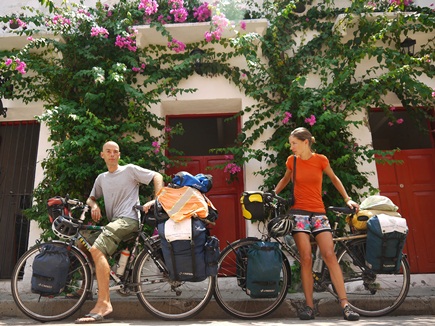
During our last few days in Cartagena we met Raul and Marta, fellow cyclists from Spain and Poland, who are doing the same north-south route as us. It was great to share food, experiences and ideas – we hope to meet them again somewhere along the road in South America…
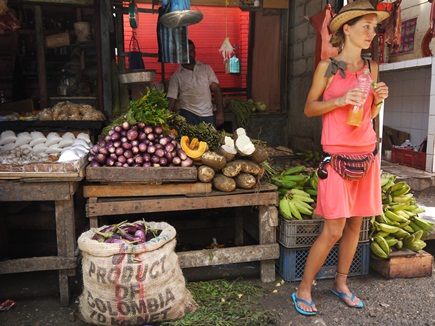
A trip to the market in Cartagena with Raul and Marta before we all left was an education. They're far better acquainted with the delicious but baffling tropical fruits of Colombia and they introduced us to some new sweet treats such as granadilla and pitahaya.
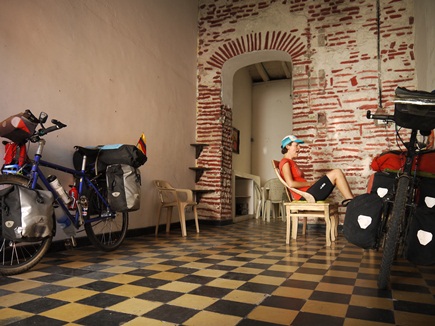
…then it was time for us to leave too. Our home for ten days had been in a beautiful old colonial house with five Colombian university students. Initially they thought we were very odd; even more so when the lycra came out.
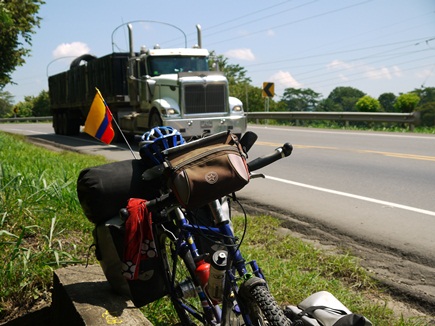
The first 150km out of Cartagena, along a very busy flat road, couldn't be counted as a highlight of our trip…
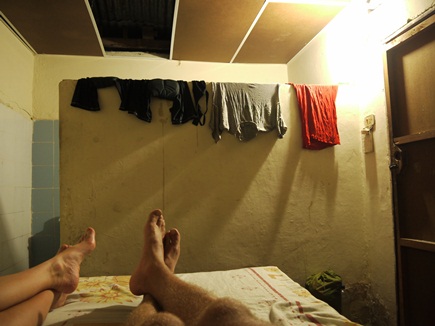
…especially when we found oursevles staying in shabby roadside hotels instead of camping as we had hoped. The rooms were cheap enough but often not dissimilar to a concrete cattle stall, and definitely inferior to spending the night in our tent.
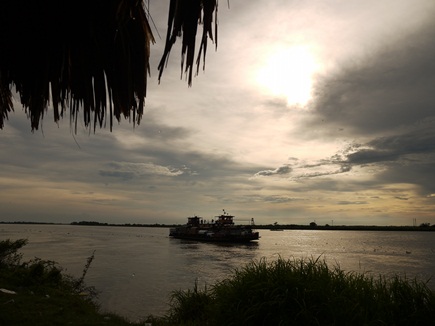
Happily, we reached the end of the busy road and the pace slowed considerably. The only sensible way to reach Mompos is by a slow river ferry across the Río Magdalena, the largest river in Colombia.
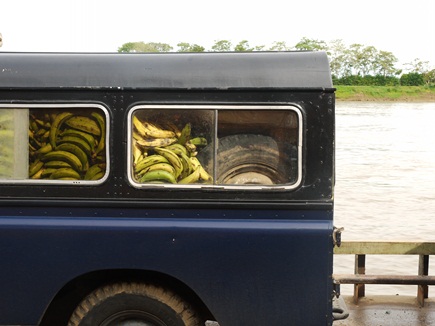
…and then hungrily eyed up this jeep filled with plantains. Fried and squashed and then fried again, plantains become patacones, a starchy, filling staple which appeals to the ravenous cyclist.
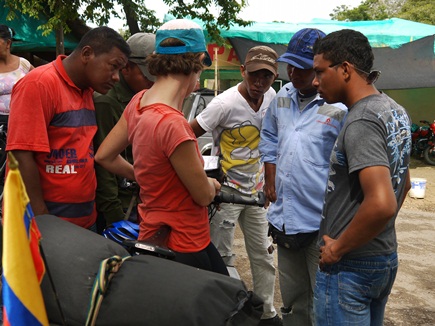
Our arrival on the other side of the river in La Bodega caught the attention of some local taxi drivers who insisted on knowing where we were going….
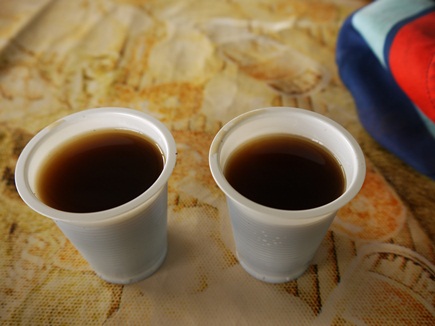
…and so we stopped for a big breakfast, a chat and the obligatory café tinto. Served from a thermos flask with added sugar, tinto comes in small shots and never costs more than about 15 US cents. It's pleasing to see that Colombians drink their own coffee (some of the best in the world) instead of sending it all for export like may of the Central American countries we've passed through.
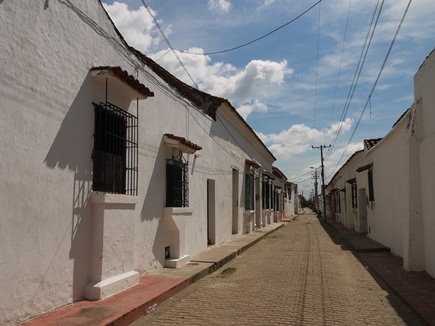
After breakfast, a short ride through the wetlands and we were in Mompos, a sleepy town that's stuck in a colonial time warp. Sun baked streets…
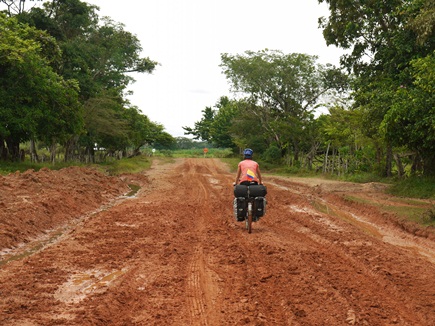
After a blissfully relaxed rest day in Mompos and a big thunderstorm we set off toward El Banco through lots and lots of sticky red mud.
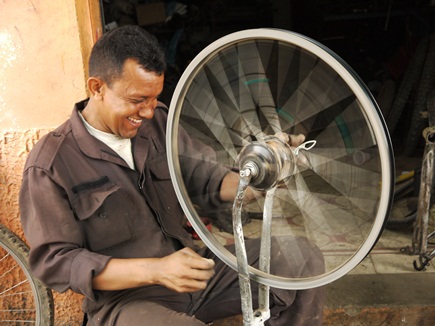
We made it through the mud but suffered another snapped spoke for James – the third in three days. The grin on expert mechanic Eliseo's face as he trues the wheel is a stark contrast to the disgruntled frown that James wears when he tries the same repair out on the road.
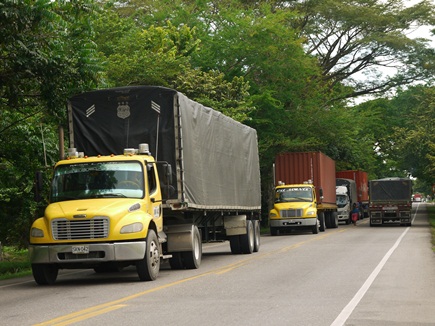
All too soon we were back on the main road. Heaving with trucks on just two lanes, this was some of the scariest riding we had done on the entire trip and renewed our commitment to finding quiet back roads and dirt tracks whenever we can.
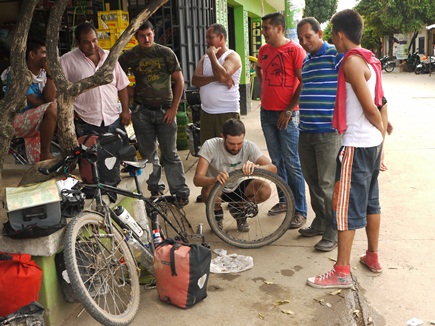
Another interested group in another town. This time it's watching James change as puncture that draws a crowd; at times there were up to fifteen men looking on!
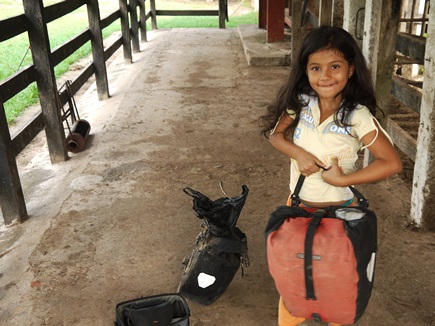
After a long afternoon on the busy road we looked around for a place to stay and wanting to avoid another shabby hotel, we opted to ask at a finca. And so instead of a cow stall style room, we actually did stay in a cow stall. Joanna, daughter of one of the farm workers, was keen to learn some English words and help us with our packing.
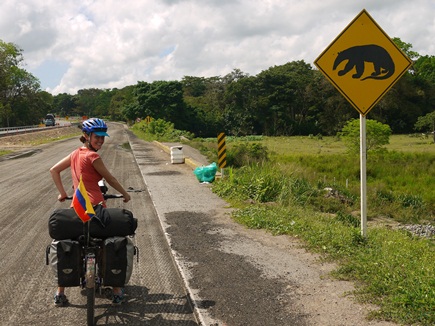
Back on the busy road for the day and we were relieved to find some stretches of new carriageway not yet open to traffic but perfect for cycling…sadly we didn't spot any ant eaters along the way.
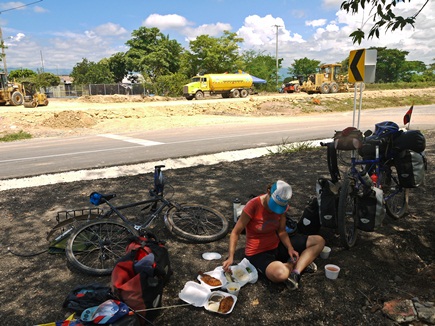
Another snapped spoke and then two punctures left us stuck in a lay-by for the best part of two hours. This long stretch of road is full of construction crews and we happened to stop next to one and swear and sigh with frustration at James' mechanical problems. They looked on amused and then took pity, gifting us two leftover lunches. As always with free food, the stress fizzled away and we gratefully tucked into fish, soup and rice.
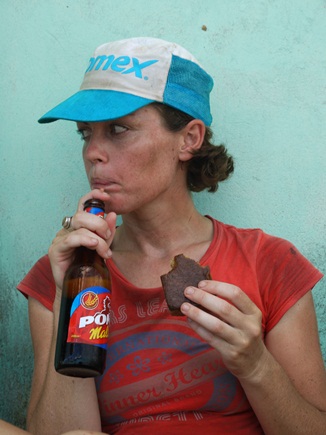
The incredibly kind construction crew sent us on our way with even more goodies. On the afternoon dash to San Alberto, feeling tired, sweaty and filthy, their gift of banana cake and apples, along with a cold bottle of Malta, made the nasty road seem a bit more palatable.
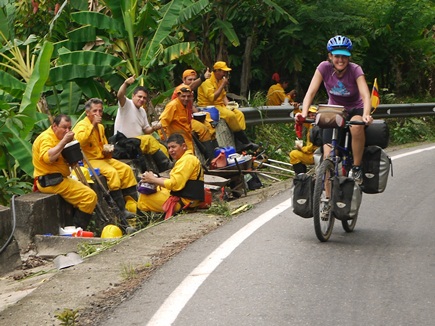
Thankful for less traffic the following day, we got stuck into the first proper climbing we had done for months; passing more friendly workers along the way…
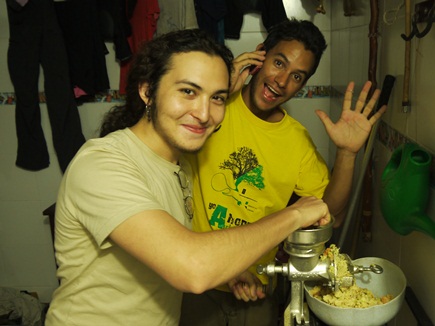
…and we arrived in Floridablanca near Bucaramanga to the most hospitable of Colombian welcomes from Julian (right) and his family and friends. He and his friend, also called Julian, spent hours in the kitchen making delicious veggie burgers…
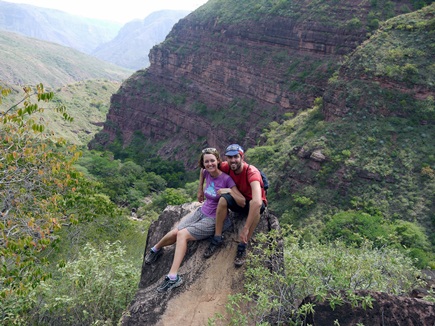
Julian convinced us to take an extra day off and took us out into the countryside to see the Cañon de las Iguanas, a place we could never have accessed by bike.
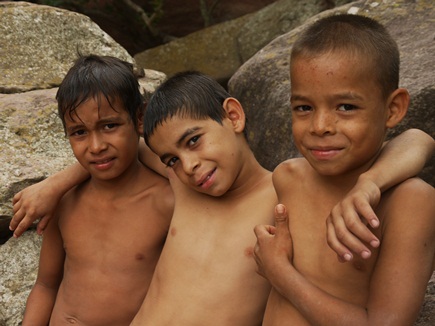
These three brothers acted as our guides down into the canyon and then spent the afternoon lazing, swimming and chatting with us….
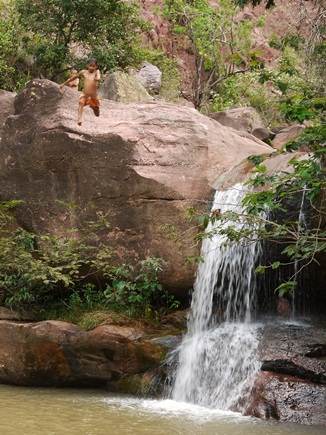
….and taking the risky jump into the water in the afternoon sun that the three of us didn't feel energetic enough to try.
Sarah
Into the foothills: an Andean warm-up
October 6th, 2012

Our Andean “warm-up” ride: start at 850m, drop to 300m. Climb up to 1800m, before descending again to 500m. Then a final climb up to 1600m, followed by a final descent to 1100m. If I'd have been wearing a heart rate monitor, the print out might have looked similar…
“It is by riding a bicycle that you learn the contours of a country best, since you have to sweat up the hills and coast down them.”
Ernest Hemingway
I’m not sure if Hemingway ever dragged himself away from his Cuban daiquirís long enough to explore Colombia by bike – but if he had, he may have found his theory tested to its limits.
For southbound cyclists like us, Colombia is where the foothills of the Andes begin. From here down through Ecuador, Peru, Bolivia, Chile and Argentina, chances are we are either going to be crawling uphill very slowly, or bumping downhill slightly faster – and not much else in between. As they say around here with a mischievous wink of understatement, it’s about to get very columpio (“lumpy”).
Second only to the prospect of saddle soreness, climbing is perhaps the one aspect of cycling that sends non-cyclists’ eyebrows upwards, and their hands reaching for their car keys. It is definitely cycling at its most masochistic – an orgy of sweat, burning lactic acid and hyperventilation…all for what? Just to say that you’ve conquered a hill? And then, chances are, to freewheel all the way back down again to where you started. Surely it doesn’t get much more pointless than that.
Yet for me climbing is also cycling at its rawest and most addictive. It’s escapism in its purest, most physical form. Hit a serious climb and for that moment, it’s just you versus the hill: second by second, pedal stroke by pedal stroke, hairpin by hairpin. Add in 50kg of heavy steel touring bike, a tent, stove, fuel, food, water, clothes and assorted clutter, and the equation definitely tips in favour of the hill. The romanticism quickly evaporates – but somehow the addiction remains.
It will be interesting to see just how quickly the Andes cure my addiction and beat any remaining drops of romanticism out of me. I have a feeling that it might not be too long before I’m daydreaming about those sweaty days on the flat coastal plains of Central America…
And so, with the mountains looming ahead, we decided the only option was to get stuck straight in. After dragging ourselves away from the warmth and hospitality of Julian’s wonderful family in Bucaramanga, we headed out for a serious warm up in Colombia’s Cordillera Oriental.
I remembered reading about a back route that Cass Gilbert (as ever our PanAm dirt road guru – thank you Cass!) had taken from Bucaramanga to San Gil on his own journey through Santander over a year ago. Having spent much of the last few days from Mompos truck-dodging on main roads, we decided to give it a try.
Add in a healthy dose of Colombian hospitality, and it turned into one of my favourite dirt road rides of the trip so far. The climbs were definitely tough, but as always the rewards of riding in the mountains made all the effort worthwhile: stunning landscapes, beautiful pueblos and generous people.
James
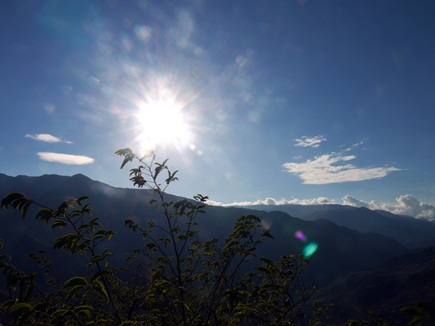
A gentle day's ride out through Giron led us past the Cañon de las Iguanas that we had visited with Julian the day before, and to the foot of the first 1500m climb up towards Zapatoca. The next morning we set off, putting into practice the seven steps to hill climbing glory we have learned over the past 15 months…
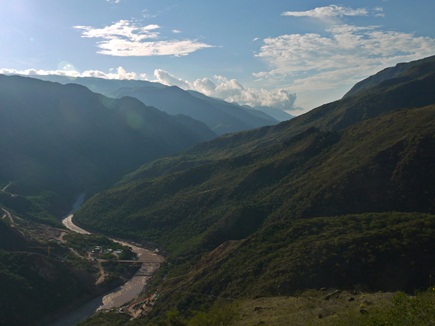
1. Rest. Make sure you get a good night's sleep. Like a pair of trolls, we camped under the bridge at the base of the climb. It turned out that we were in the middle of a massive construction site for a new hydroelectric dam project – but needless to say we still slept like logs. It takes more than a few industrial drills to keep us awake these days.
2. Rhythm. Hit play on Hot Chip’s new album – current hill climbing soundtrack of choice.
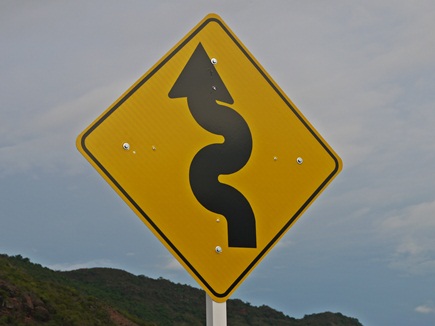
3. Navigation. Make sure you're going the right way, ie up. Follow this sign and you can't go wrong. In universal cycling language it generally translates as “sweat, swearing and pain ahead”.
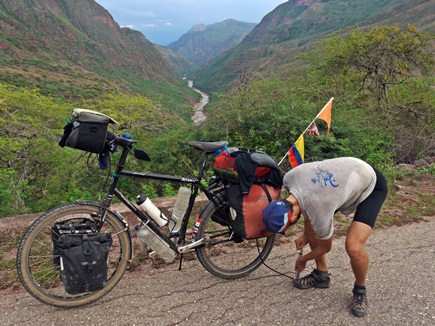
4. Pressure. After five minutes climbing, convince yourself that your tyre pressure must be low – and that's why it feels like you're trying to cycle through treacle. Tyre pressures are fine. Add some more air anyway. It still feels like cycling through treacle.
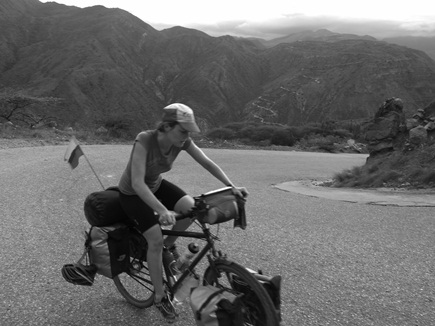
5. Breathing. We've found this definitely helps. Drop bottom jaw as much as possible and add in a thousand yard stare for good measure.
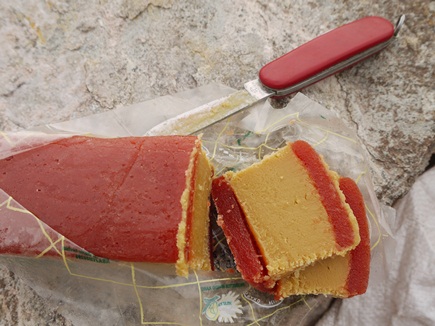
6. Nutrition. Ideally as much sugar as possible – in this case a brick of bocadillo courtesy of Julian's mum Edu in Bucaramanga. Think Kendal mint cake a la colombiana: a slab of arequipe (caramel) sandwiched between two layers of mermelada de guayaba (guava jam). Guaranteed sugar high for at least ten minutes.
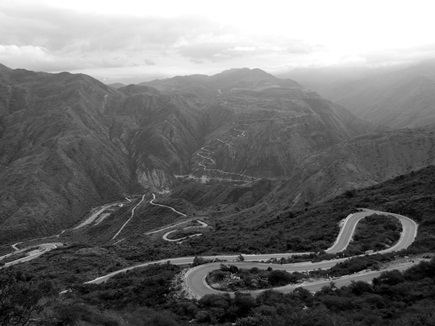
7. Smugness. Not recommended until you reach the top – but then don't forget to look back and bask in the sweat and glory of your spaghetti-like route up the mountain.
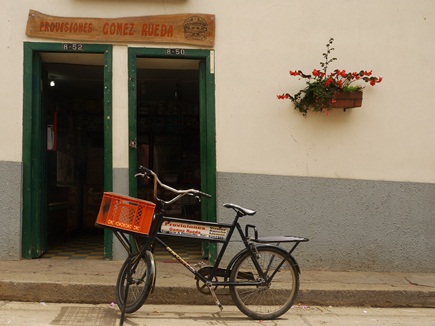
And so after a morning of climbing, we arrived in Zapatoca – a magically laid-back santandereño mountain town where groceries are delivered by cargo bike…
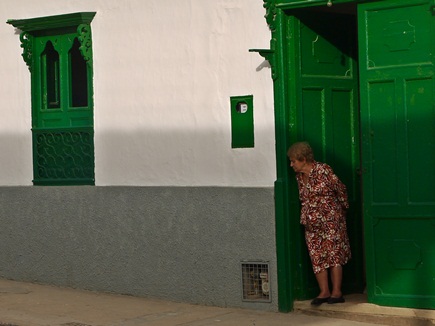
…and ladies peer from colour-co-ordinated doorways. About to drag ourselves back onto the road, we met Eduardo. A reporter for the local community TV channel, he asked if he could interview us about our trip. Of course, we said – always open to distraction and thinking it would be funny. It was indeed funny (you can watch it here if you're really bored and happen to speak pigeon Spanish), and we thought that was it. However, it seems not much happens in Zapatoca, and so Eduardo had plans for us…
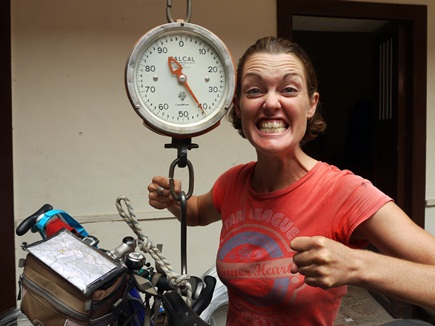
First up, he insisted on a visit to the local ferretería (ironmongers) for a bike weigh-in. Mine tipped the scales at 46kg, and Sarah's 41kg – slightly disturbing considering we both currently only weigh about 60kg ourselves, and that we had run our water and food rations down to nothing in preparation for all the climbing.
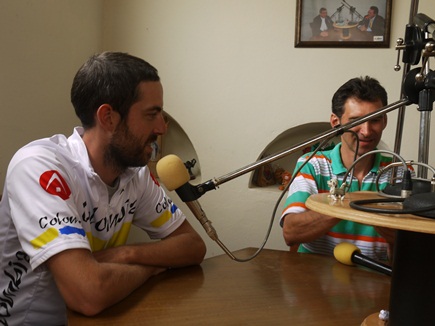
Then, before we knew it we were in the studio of the local radio station Radio Lenguerke – it turned out Eduardo had his own afternoon show and we were just in time for a live interview – cue plenty more cringeworthy moments.
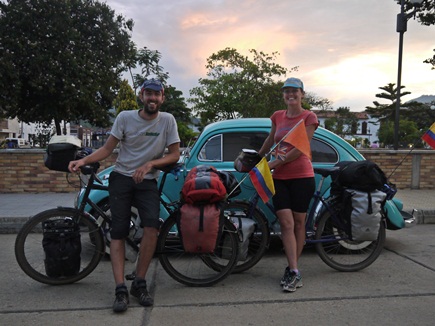
By this point it was clear that we weren't going to leave Zapatoca that day. No problem, said Eduardo – I have a finca and you can sleep there. So time for a last quick snap in the town square…
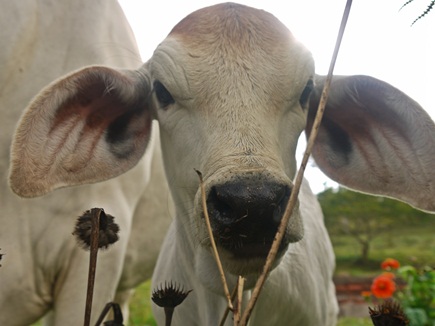
…before heading up to the finca to meet our by now familar cast of rural neighbours – from the curious…
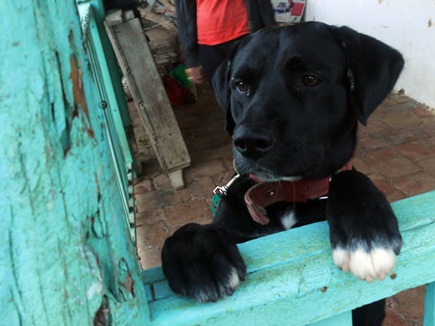
…to the downright soppy. Eduardo and his wife fed us hot chocolate, sweet bread and cheese – and for the first time since Guatemala we dug our sleeping bags from the bottom of our panniers, and slept in delicious mountain coolness.
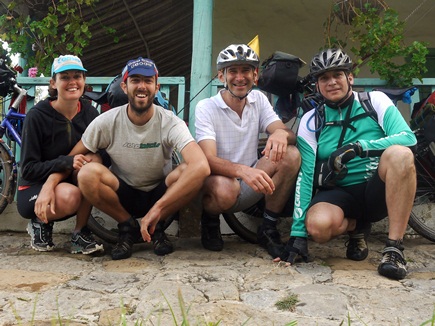
A keen cyclist himself, Eduardo couldn't resist the opportunity to tag along for the ride the next day. And so, having found a stand-in for his radio show and recruited his friend Manuel for the ride, the next morning our new team of four set off from the finca.
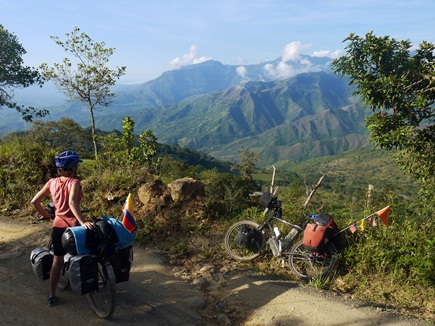
From Zapatoca we wound our way along the ridge…
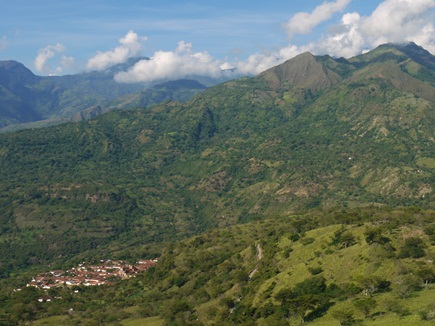
…before diving down through the switchbacks to the small village of La Fuente in the valley below.
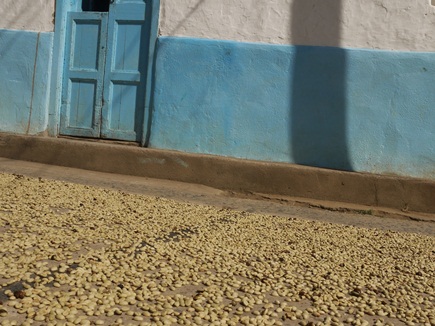
La Fuente was another immaculate, laid back pueblo santandereño, where coffee was laid out to dry in the streets…
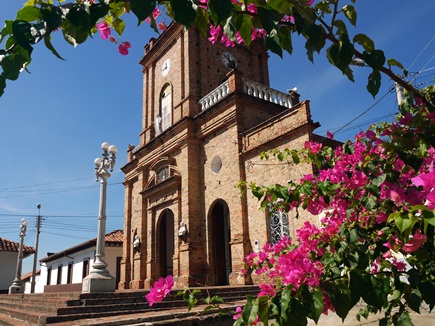
…and the school PE lesson was in full flow in the main square in front of the church.
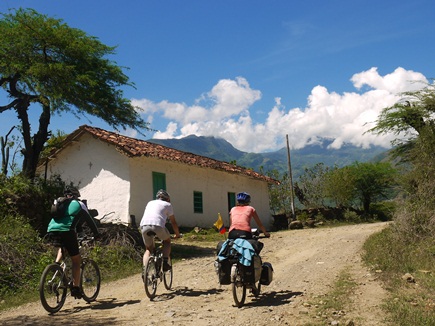
From La Fuente the climbing began again, up towards the village of Galán. A quick stop for the obligatory mid-morning malta, and then it was a rocky downhill…
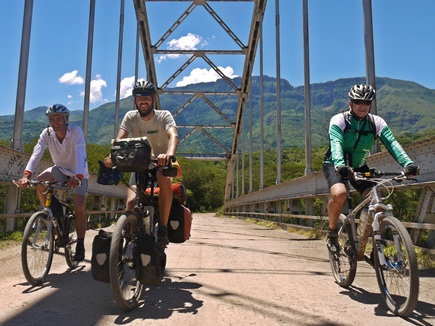
…all the way to the Puente Eduardo Santos over the Río Suarez – the very same river we had started from the morning before, just a little further along the same valley. Good to know we were making progress then…
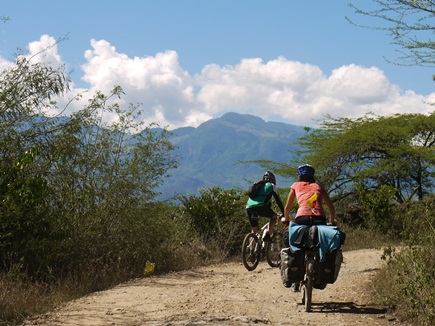
By now the midday heat was really starting to take its toll. We crawled slowly up the final climb of the day and into the village of Guane.
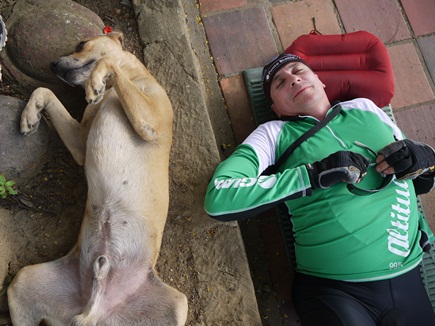
After a well-earned hearty plate of comida corriente (no-one mixes their carbs like the Colombians – rice, pasta, yucca and plantain on a single plate is common), we retired to the square in a carb-induced coma…

…interrupted only by Eduardo calling back into Radio Lenguerke for an update on the day's progress. The boys were headed back towards Zapatoca the same day, and so we bid a sad farewell to our new friends. ¡Gracias hermanos, esperamos la próxima vuelta con mucha anticipación!
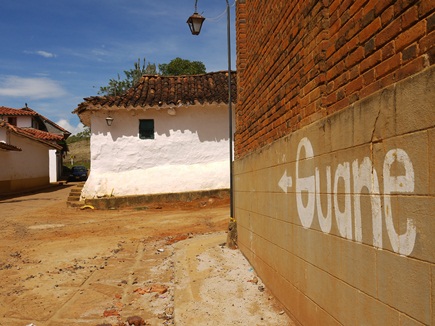
The next morning, after a night camped on a nearby finca, we headed up the final leg of the climb into Barichara – touted as the most beautiful village in Colombia and the setting for many telenovelas (soap operas) and films.
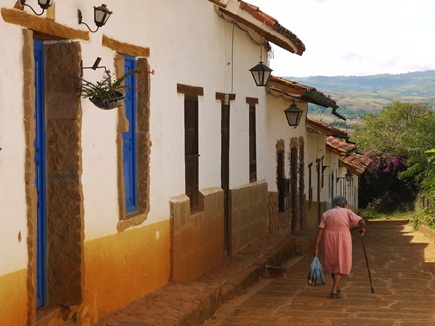
It certainly ticks all the boxes for a picture postcard colonial village: old ladies wandering down paved sidestreets with mountain backdrops…
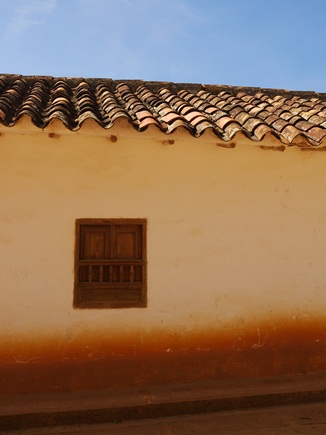
…whitewashed walls and terracotta-tiled rooftops under blue skies…
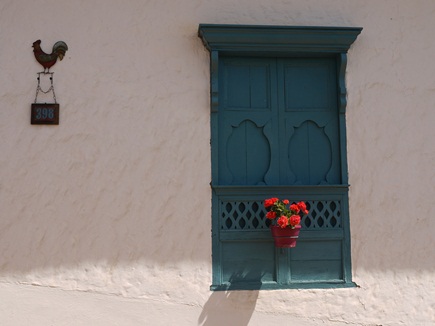
…and a tasteful colour palette of flowers and shutters. As beautiful as it was, for us it didn't quite have the magical charm of Zapatoca – somewhere that is definitely on our list of places to return sooner rather than later.
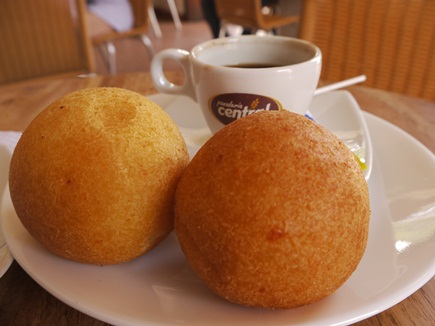
Of course, there was only one way to celebrate a ride this good: tinto and buñuelos from the local panadería. After all, we must have burnt a few calories on those climbs…
Breathtaking
October 18th, 2012
El Cocuy. A Colombian national park that we’d never heard of wasn’t exactly on our bucket list but from the moment we were shown pictures of this little known treasure, we decided that it was worth a visit.
Julian our fantastic host from Bucaramanga wanted to see the park too and so having spent a week cycling away from him, a two hour bus journey took us back to his house. Plans gradually came together for a five day walking trip and with the bikes safely stowed away, we embarked on an epic 18 hour bus journey from Bucaramanga to the village of El Cocuy, gateway to the park itself.
From here the journey got a bit tougher as the park is tucked away in the mountains and access isn’t easy….by the time we hopped off the truck ready to start hiking, our journey had taken three days and we hoped it would be worth it. Little did we know we’d be trekking back down to El Cocuy in less than 24 hours.
Sarah
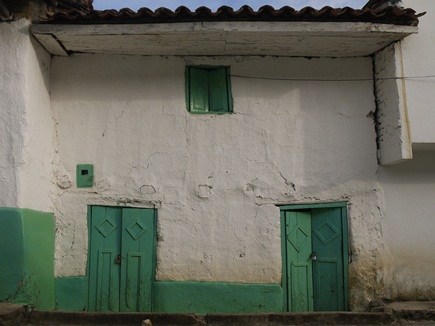
Arriving late in El Cocuy we decided to take the next day to acclimatise, have a look around town, and prepare for our journey into the park. The external walls of every building in town are painted the same colour; whitewashed walls with blocks of sea-green. In the early mountain light it gives the town a welcoming, peaceful feel.
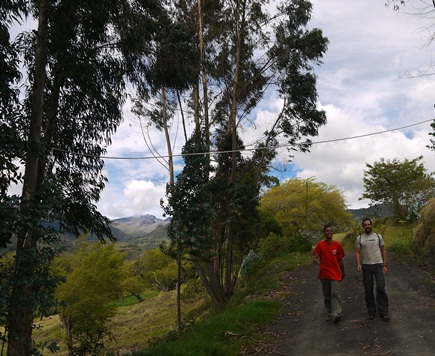
With a bit of time to spare, we hit the surrounding hills for a brief walk. It was some sort of feeble attempt at a warm up, knowing full well that the climbs and altitude in the park waiting for us were much more serious.
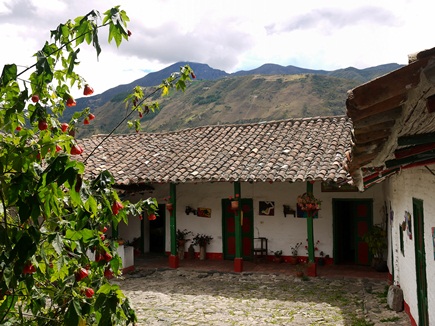
We made time to indugle in a heavy lunch (as always, any excuse to load up on calories) in the dining room of this pretty colonial house. In true Colombian style, it was high in carb content, came with fresh fruit juice, and was a bargain – we were all stuffed for about $2.50 each.
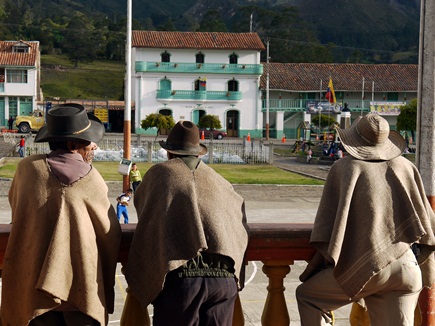
In the early evening, there was a wander around the town square, soaking up the refreshing mountain air alongside men in hats and ruanas (warm ponchos)…
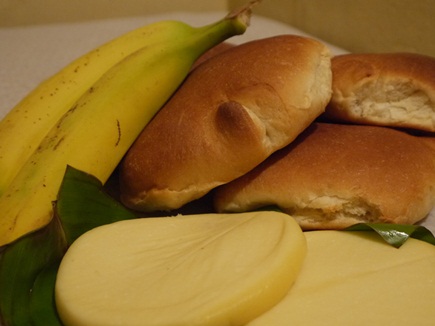
…and then back to the guesthouse for a typical mountain supper which in these parts is fresh bread, bananas, hot chocolate made with fresh milk and mountain cheese wrapped in leaves.
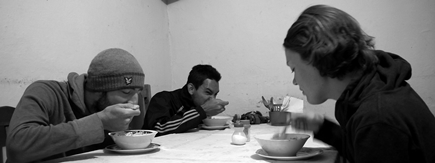
We were up before the roosters on the day of departure to the park but the lady of the house was up even earlier, making us “caldo de papas”, potato soup with poached eggs. A hearty breakfast to prepare us for some serious walking.
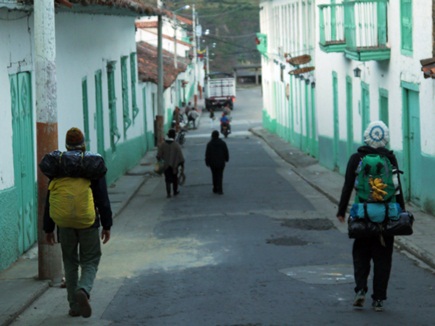
Walking through the sleepy streets, with fully laden rucksacks in place of heavily loaded bikes, we headed for the town square…
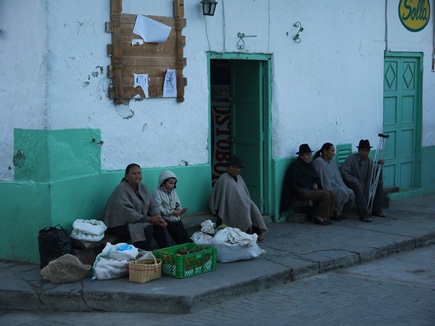
…with many others who were up at the same hour, huddled in their ruanas, wiping the sleep from their eyes too.
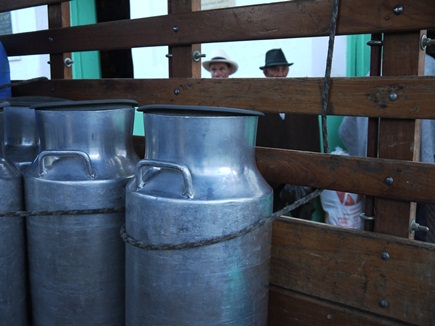
Our early start was to make sure we didn't miss “El Lechero”, Colombia's answer to the milk float. Not quite the battery powered runaround us Brits remember, this truck is one of the only heavy duty vehicles that goes as far as the park boundaries and so we get a lift with the churns….
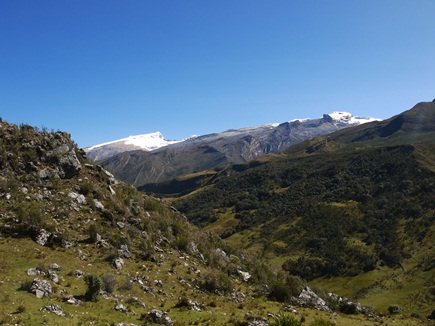
The ride on El Lechero took over an hour as we wound our way through the mountains, climbing from 2700m to 4000m. For two people from the flatlands of East Anglia, we couldn't help feeling on top of a very beautiful world. Julian had never seen snow before and so he was suitably impressed by it all too.
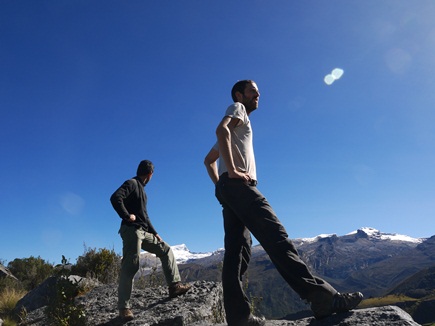
Just a few minutes in and James and Julian feel compelled to pose for the obligatory outdoor catalogue shot complete with spectacular backdrop.
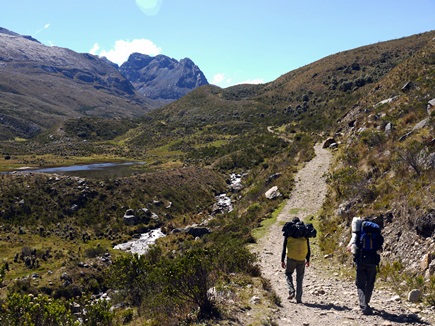
And then we were off again, breathing heavily and crisping slightly in the bright sun. We'd felt breathless walking up hill in El Cocuy at 2700m but this was a whole new level. At 4000m and with fierce sunshine added in, the few hours walking to the first camping ground was not steep or particularly technical but it was tough in other ways.
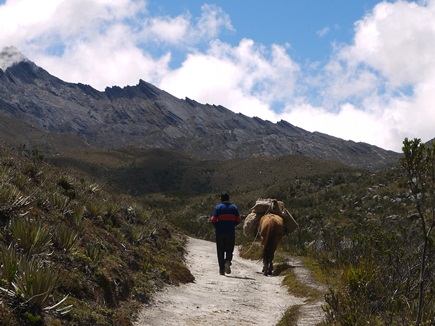
We stop a local to check we were heading the right way and he assures us we're just twenty minutes away…
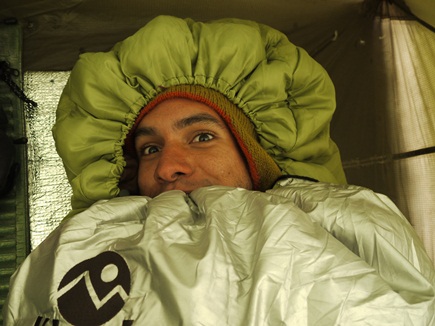
Suddenly the bright blue sky and fluffy white clouds disappear and the tent is up just in time, before the rains come. Weary from the early start and our first high altitude hike, we take the opportunity to snuggle into sleeping bags and get cosy.
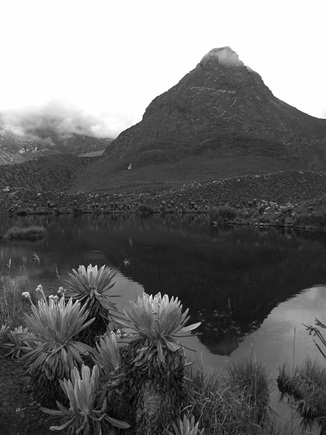
The skies are clear for long enough for us to escape the tent for an hour and explore some of the nearby lagoons. The landscape, even under cold grey skies, is stunning; like nothing we've seen before. We look forward to more climbing and hiking tomorrow.
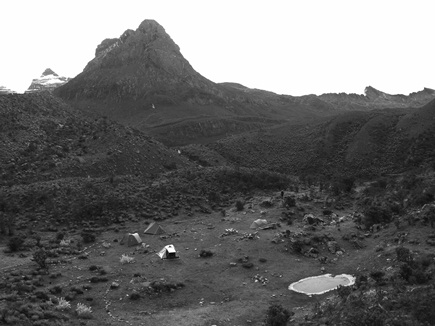
But our enthusiasm is not matched by our capacity. The quick ascent in the milk truck to 4000m proves too much for former fen-dwellers James and I and through the night we suffer from altitude sickness: nausea, headaches and fatigue. We're definitely not up to further hiking at greater altitude and the next morning we make the difficult decision to return to El Cocuy, three days earlier than planned. We pack up the tent.
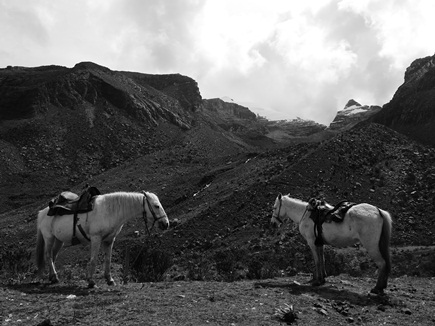
We were obviously gutted to cut our trip to such a beautiful place short but the sheer height had literally knocked the wind out of our sails and the only way to deal with it was to descend and let our bodies recover. These hardy mountain ponies don't seem to suffer from the same problem.
Making for Medellín
November 23rd, 2012
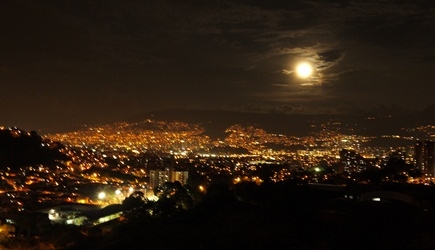
A Halloween full moon over Medellín, Colombia: our home until January as we take our half-time break, sit out the rain, and plot our route south…
No doubt you’ve worked out the pattern by now – give us a few weeks in a new country and chances are we will soon be extolling its virtues to anyone that will listen. “We love [insert name of latest country here]! The food is delicious, the scenery is beautiful, and the people – well, the people are just sooooo friendly!”
After almost 16 months of hospitality wherever we have been, it really shouldn’t come as any surprise that Colombia is also full of wonderful, generous people. Yet even by the high standards of hospitality we have become accustomed to on this trip, this country definitely raises the bar. After decades of civil war which kept all but the most intrepid tourists away, it feels like Colombians are still genuinely delighted to see visitors enjoying the country they proudly refer to as paradise.
“Cómo les parece Colombia?” (“What do you think of Colombia?”) they ask, before checking that their fellow colombianos have been looking after us well – and then invariably trying to outdo them in the hospitality stakes. We never ask for more than water and advice – but here you almost always get far more. I sometimes wonder if we are the unwitting (yet happily willing) beneficiaries of some kind of national hospitality competition.
It’s definitely the first country in which we have rolled into a tiny village to find the mayor and chief of police waiting in the square to formally welcome us. And the first where every day people on motorbikes slow down and ride alongside us for 10 minutes just for a chat and to wish us well. It’s also the the first where we have regularly tried to pay the bill for lunch or a snack, only to find that the friendly local we have been chatting to has already paid it for us. “Les invito!” (“I’ll get this!”), they say with a grin, telling us we need to save our money – and plainly ignoring the fact that we are clearly the rich gringos in this exchange.
And so, when we took the decision to sit out the worst of the Andean rainy season until the New Year, spending our time off the bikes in Colombia was an easy choice to make. The only difficult question in a country so huge and diverse was where to make our base. Colombians – never short of an opinion – were almost unanimous. “Medellín!” they said, directing us west from Santander towards the capital of the neighbouring state of Antioquia. “It’s the best place in Colombia to spend Christmas”.
And so here we are, puros campesinos (country bumpkins) finding our feet in a bustling city of 2.5 million people nestled high in the Cordillera Central. Somehow we’ve already been here a month, and it’s flown by. We’ve landed on our feet with a great group of new friends who in true Colombian style have been keen to immerse us in antioqueño culture and – even better – food. Chances are we will be leaving here a lot fatter than when we arrived which, given the climbs ahead of us, probably isn’t a bad thing. In between eating, we’re managing to squeeze in some volunteering, Spanish study and a much-needed overhaul of well-worn bikes and kit.
But first of course, we had to get here from San Gil, where we had stashed our bikes during our detour to El Cocuy. Like any east-west journey in this part of Colombia, it involved some range-hopping: from the Cordillera Oriental down to the Río Magdalena, before a steady two and a half day climb up into the Cordillera Central. Inspired by our back roads ride out of Bucaramanga, we chose to avoid the main road from San Gil to Barbosa, opting instead for a second dose of tough climbs and tranquil Santander pueblos…
James
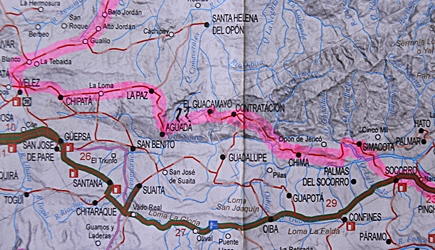
Our back route from Socorro to Vélez, taking in the string of pueblos nestled in the foothills of the Serranía de los Yariguíes: Simacota, Chima, Contratación, El Guacamayo, Aguada, La Paz and Chipatá.
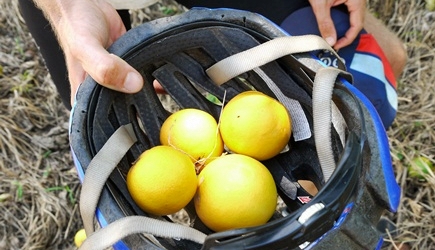
From Socorro it's a fast, paved descent down to the Río Suarez, interrupted only by a stop to pick up some fallen roadside oranges.
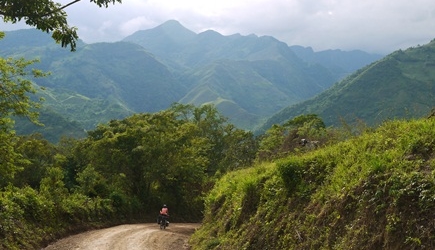
After a quick lunch of bread and queso de hoja (a traditional mountain cheese wrapped in banana leaves) in Simacota, we hit dirt and the beautiful Serranía de los Yariguíes opens up before us. In Colombia, down only means one thing…
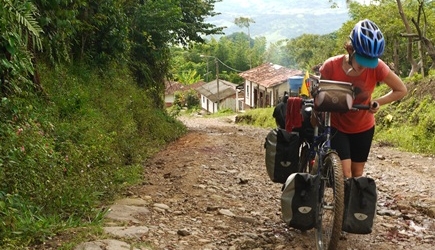
…pretty soon you'll be going up. Sure enough, leaving Chima, we hit a steep, rocky ramp which – Bedders would like to point out – has us both off and pushing. Despite my long-standing photo campaign to make it look like I never push my bike, I do. Regularly. I just push mine a bit quicker and happen to carry the camera…
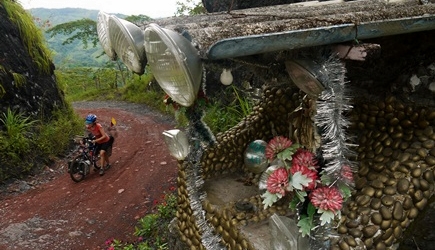
Up and up it winds, past a roadside shrine decked with car headlamps as offerings to ensure safe passage…
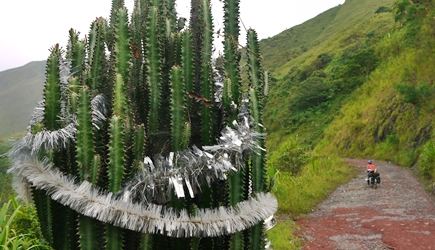
…and a slightly incongruous festive cactus.
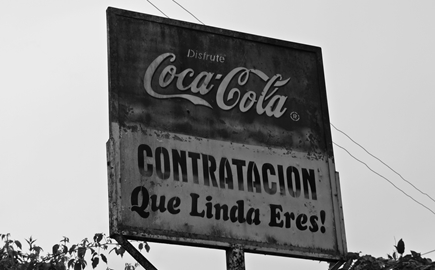
“Contratación – how beautiful you are!” – and indeed she was a welcome sight as we crawled in, wet and slightly bedraggled after an afternoon climbing through the mist and rain.
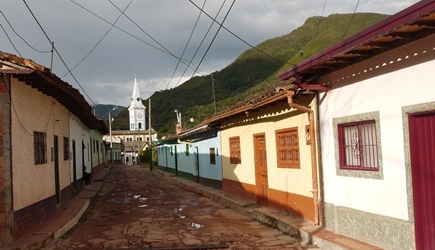
Making for the town square as usual to get our bearings, we don't even have chance to dry off before Colombian hospitality strikes.
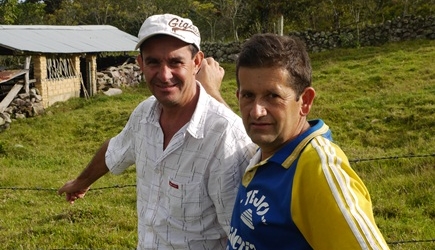
Rodrigo has a finca just outside town, and insists that we will be spending the night there. We certainly don't argue, and so off we set up the hill with him and his friend Orlando.
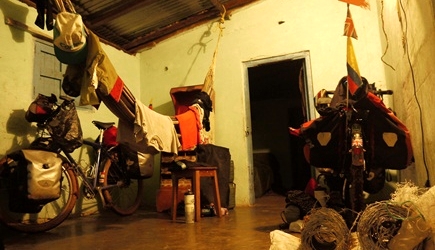
We expect to be staying in his house, but it turns out Rodrigo doesn't even live there, and we have the finca all to ourselves. Soon we have our wet clothes drying…
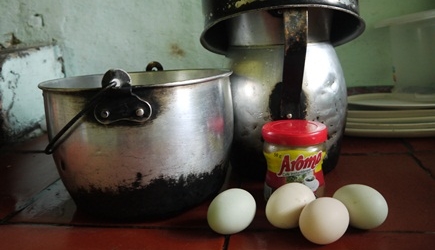
…and are tucking into the eggs that miraculously appear in the kitchen. Gracias miles Rodrigo!
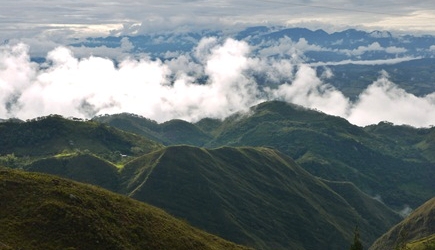
After a good night's sleep, we wind our way upwards again towards El Guacamayo, past the beautiful folds of the Serranía…
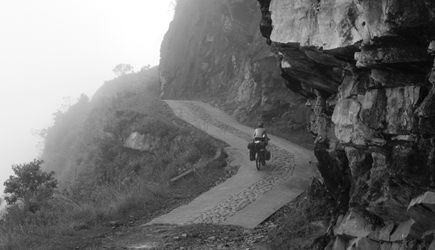
…and into the mist. A bemused local on a motorbike stops us to find out our story, and by the time we arrive in El Guacamayo the mayor and chief of police are waiting in the square to formally welcome us. “Is there anything we can do to help?”, they ask as the rain starts to lash down again. “The nearest bakery?”, we ask hopefully…
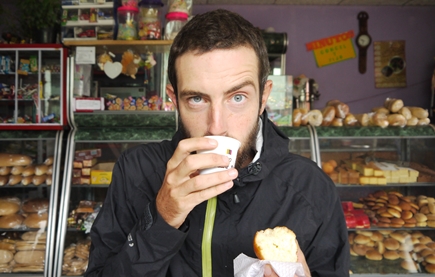
And so with our now obligatory second breakfast of tinto and buñuelos devoured, we set off for Aguada. Our map shows no route between the two, but according to the chief of police we have two options: the first steep and rocky, but shorter; the second longer but slightly less punishing. With memories of rocky pushes in Guatemala slow to fade, we opt for the second.
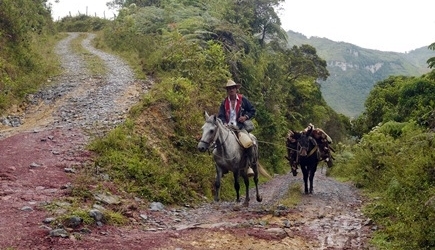
A fork in the road – up or down? Brain says down, horseman says up. Try asking again, just in case I misunderstood. It's still up – less rocky he says…
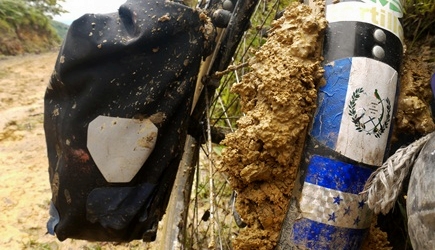
…which is true – but instead of rock, we get mud. Thick, slippery mud which within minutes clogs the gap between tyres and mudguards. With de-clogging sticks (technical term) now strapped to the back, it's a tedious descent to the river interrupted by stops to dig out the mud every couple of minutes…
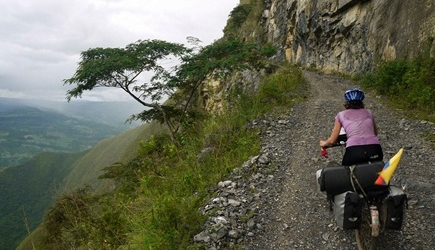
…followed by a punishing slog back up the other side on tired legs. Up and over the top, and finally we roll into Aguada – the end of a long day.
The next morning dawns cool, misty and wet as we skid our way up and down a final slippery dirt section to La Paz…
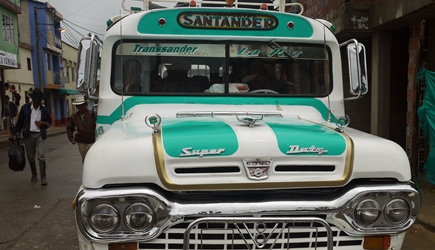
…where the paved road joins from Vélez, and the buses start again. It's a small village, but feels like a heaving metropolis after the peace and solitude of the last few days.
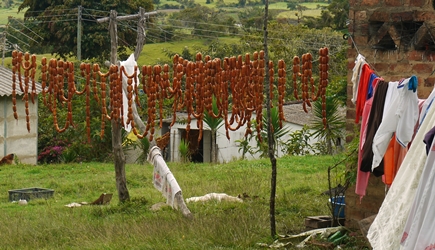
Now this is my idea of a washing line: locally made chorizo hanging out to cure along our route to Chipatá. It's a small village which proves to be the perfect place for a much needed day off to rest weary legs and dry soggy kit.
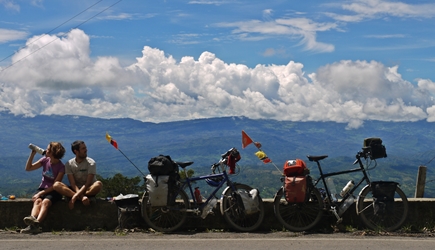
Refreshed and re-fuelled, we set off on the much smoother and faster second half of our journey to Medellín. Up and over the ridge beyond Vélez…a brief pause to take in the view…and then downhill all the way through Landázurri and Cimitarra to the Río Magdalena at Puerto Berrío.
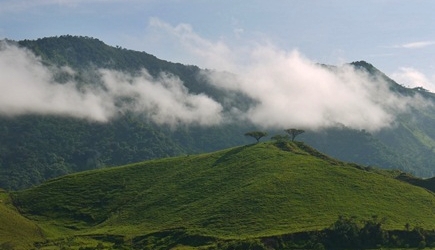
From Berrío we climb up into Antioquía, through idyllic pasture and sleepy villages. It's a rollercoaster ride: Medellín sits at only 1500m, but we climb a total of 5000m over two and a half days as the road inches its way up and up into the Cordillera Central until finally…
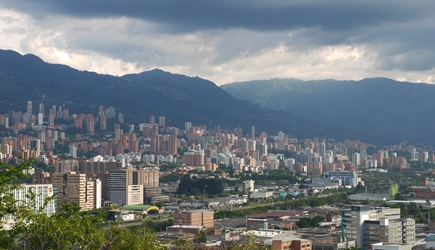
…the valley opens up and Medellín appears spread before us. After almost 16 months of very slow but almost constant movement, the prospect of stopping has never felt so appealing. We're ready for a break.
Family
December 11th, 2012
Anyone who knows me, even slightly, will testify that Christmas is without a doubt my favourite time of year (to one friend, I am known as “Sarah Christmas”). The Christmas I love is a nostalgic, traditional British one: Midnight Mass with my family, frosty dark village lanes, twinkling lights on real Christmas trees, mulled wine and mince pies in front of a roaring fire, friends drunkenly dancing arm in arm in the pub to classic Christmas tunes…
All the twee, obvious images we associate with Christmas are what makes it special to me and I am not ashamed to admit that I wholeheartedly embrace them all. This will be our second Christmas away from home and so the festive nostalgia is reaching new heights. I have realised that all of the things that I miss about this time of year are more about the people than the things themselves. The Christmas tree and endless strings of lights makes me think fondly of my dad and the extremely serious trip that we usually take every year to pick the perfect tree. Mince pies – in fact anything food related – makes me think of my mum and her spectacular baking skills which come into their own at Christmas. The cheesy Christmas songs mean so much more when I am surrounded by amazing girlfriends who indulge my childish Christmas glee.
This realisation has made me promise myself to make the absolute most of future Christmas celebrations with those people when we are back in the UK. For this Christmas however, we aren’t sure yet what the festive season in Medellín will hold for us. As I write this (listening to Christmas music of course!) we don’t have any special plans. Up to now however, our time in Medellín has highlighted that when your family and friends are a long way away, what better way to deal with the pain of missing them than by embracing new people and being grateful when they have generously shared their time and traditions with us.
We’ve been welcomed into so many different homes and lives in the last six weeks. We had hoped that we would manage to put down some roots and make some connections in Medellín; our expectations have, as always, been exceeded. In true Colombian style, doors have been opened, room has been made at the family table, we’ve been showered with invitations, love, laughter and affection.
It’s been overwhelming at times and has made me ache more than ever to see my family and friends at home, but of course I am also truly thankful and humbled by the warmth and friendship we’ve been offered here. Wherever we spend Christmas this year, I don’t doubt we’ll be soaking up the hospitality and affection of our new friends and surrogate families in Medellín, whilst remembering the traditions and love of our wonderful family and friends at home too.
Sarah
The first family we were welcomed into in Medellín was Carlos and Balti. A connection through a friend of a friend (thanks Emma and Sarah!) led to us staying with Carlos and his three year old son Balti for over two weeks.
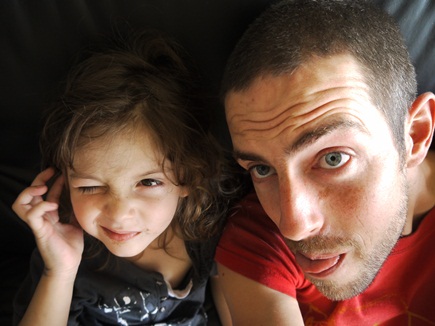
Shy at first, Balti eventually warmed to us, particularly to James and their favourite pass times included balloon football, apartment tag and pulling silly faces.
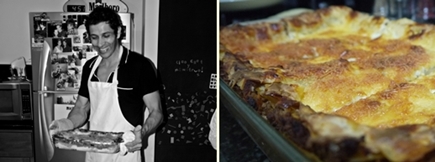
Carlos recently reached a landmark birthday and although we had since moved out, he invited us back to his place to help him celebrate. He insisted on cooking and as he's a very talented chef, we had no intention of arguing. Scrumptious lasagne followed by decadent tiramisu…thanks Carlos!
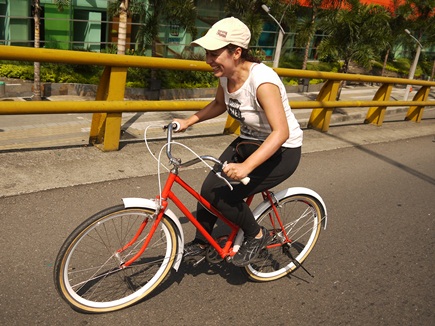
Through an informal language exchange, I met Ana Paulina. Aside from sharing conversations in Spanish and English, we had some cultural exchanges too; James and I encouraged Ana back onto her bike for the first time in years….
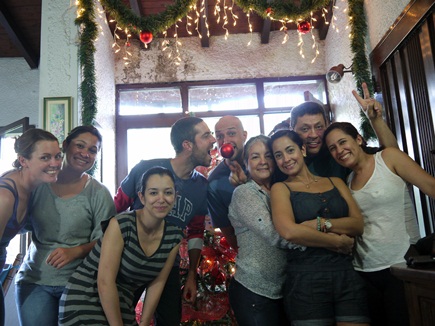
…while Ana encouraged James and I to join her and her family for delicious Antioquian food and to help decorate their Christmas tree.
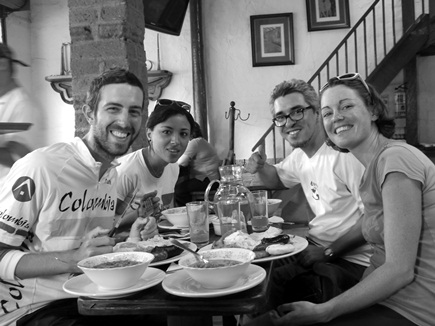
We owe an enormous thank you to Jorge and his girlfriend Dorancy (aka “La Flaca”) for introducing us to an extended family of friends, cyclists and opportunities. Jorge was our first point of contact in Medellín and without him, we certainly wouldn't have got to know the city and its wonderful inhabitants half as well. Our culinary introduction to Medellín came in the form of the gut busting Bandeja Paisa – the Antioquian equivalent to the “Full English”.
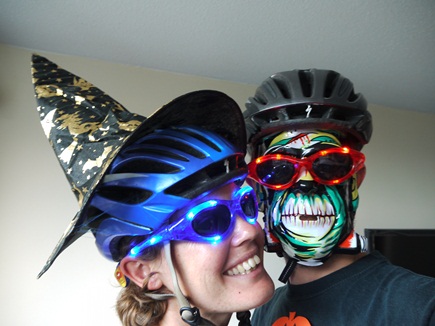
We arrived in Medellín in time for Halloween so Jorge and Dorancy invited us to a mass cycle ride…in fancy dress…
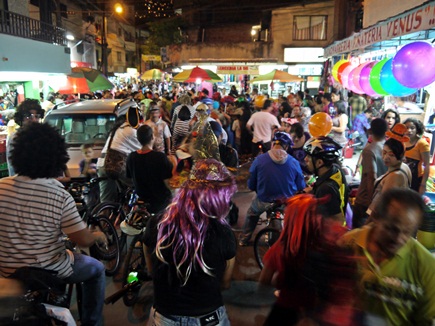
…and so we joined Medellín's tight knit family of cyclists. Around 2000 people in fancy dress and on bikes took to the streets of Medellín's Moravia neighbourhood. Handing out sweets to the kids and generally causing chaos, it was great to be a part of something so big and exciting.
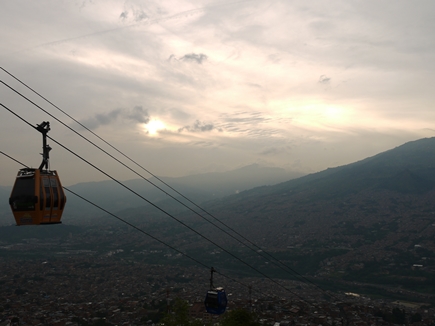
Jorge has made sure we take in the essential experiences of Medellín too; we rode the breathtaking cable car above the city for amazing views and on to pretty Parque Arví, a nature reserve just outside of Medellín.
Through Jorge, we had a chance meeting with one of his friends, Pacho. It didn't take long to discover a shared interest in bikes, coffee and of course food….
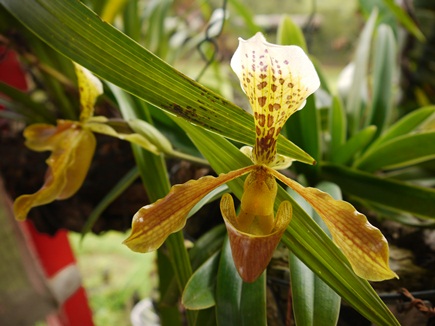
Pacho lovingly introduced us to some of his beautiful orchids (this one is called orquidea zapato de dama or lady's shoe)…
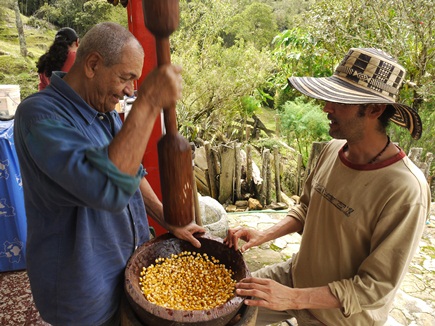
…before we got down to business. We were invited to help with a family tradition of making “mazamorra”, an indigenous drink made from maize. First Raul and Pacho have to agree on the best way to grind the maize in a traditional 'pilón'…
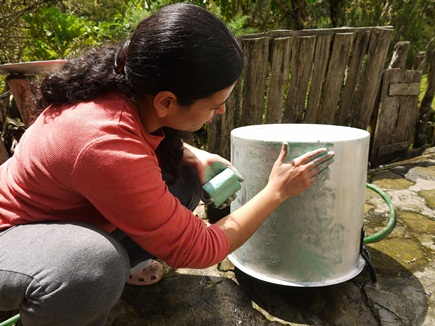
Cata, Pacho's partner, also gets to work. Preparing the enormous pan that will hold the mazamorra, she has to rub it all over with soap to stop the outside from burning when it's placed on the woodfired stove.
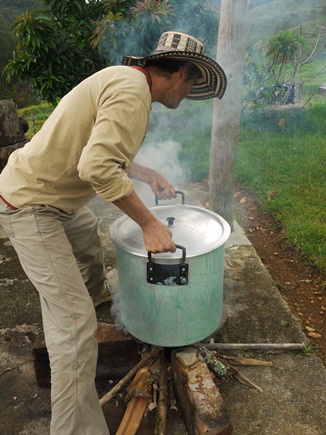
…and after another grinding in the pilón, the maize is washed and added to water. It's placed carefully over the outdoor fire for more than two hours.
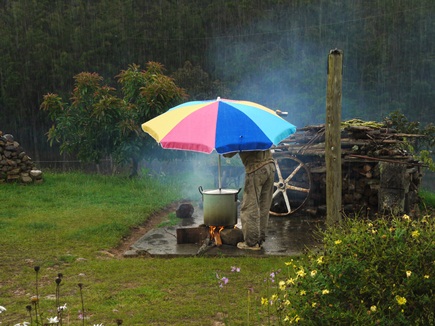
Not even a torrential downpour that lasts all afternoon can distrct Pacho from his dedication to getting the traditional mazamorra just right.
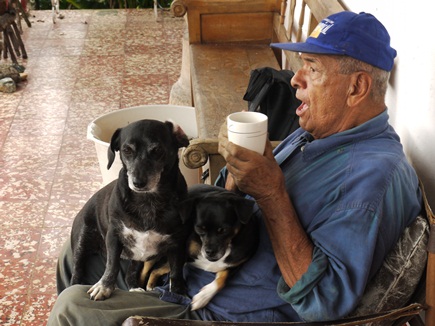
With Don Raul's experience, he has the right to oversee the whole process from the dry patio, shouting encouragement and advice.
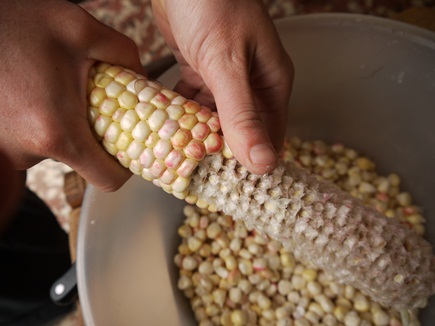
More maize on day two and we're enlisted to help strip the kernels off the cobs of corn in preparation for making arepas – a thick maize tortilla, usually topped with butter and soft cheese.
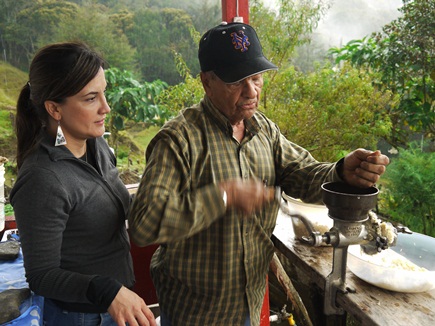
There's more grinding to be done and this time it falls to Pacho's sister-in-law Lina to be shown the ropes by Don Raul.
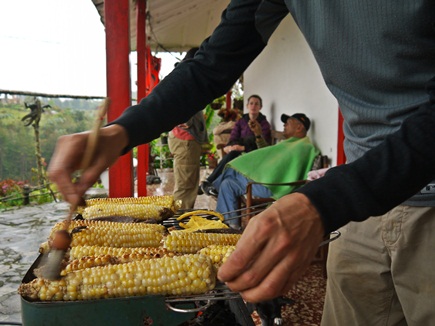
The folks of Antioquia are known as “men of maize” – they just can't get enough of corn. So, true to their name, more corn is put on the bbq to grill and Pacho oversees the cooking while the rest of us chat on the patio after a long muddy walk with the dogs.
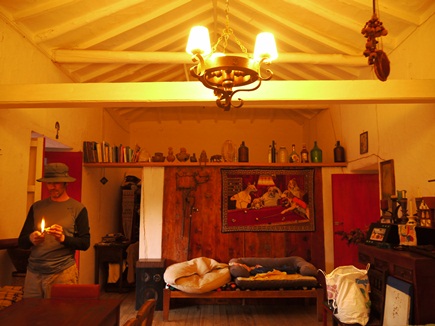
After our maize feast, we retreat into the cosy finca, learning Colombian jokes and soaking up the banter of Don Raul, Pacho and the rest of the family.
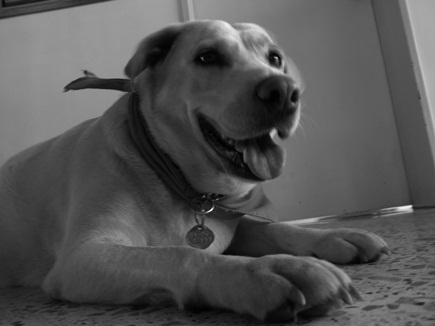
Back in the city, we should mention our own home in Medellín. Our temporary family consists of Nora our landlady, her 18 year old French poodle Pookie, the slightly rotund but adorable labrador Carola…
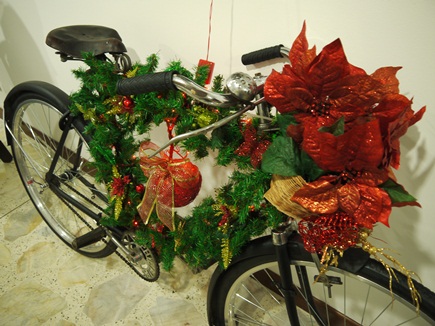
The dinner invites kept on coming, this time with Harold and Lina. A delicious combination of roast pork, good chat and too much tequila. We couldn't help but admire a novel take on the traditional Christmas tree…
Antioquia: una vuelta navideña por el suroeste
January 12th, 2013
Nuestro regalo de navidad que nos dimos: una vuelta por el suroeste de Antioquia con nuestro amigo Pachito. Un viaje de lujo: dejamos la carpa, la estufa y los sacos de dormir y salimos con bicicletas livianas – 5kg por persona en lugar de los 50kg a las cuales estámos acostumbrados. Nos esperaba uno de los mejores recorridos de todo el viaje : paisajes increíbles, ríos cristalinos, un calor feroz, comida casera y nuevos amigos paisas…
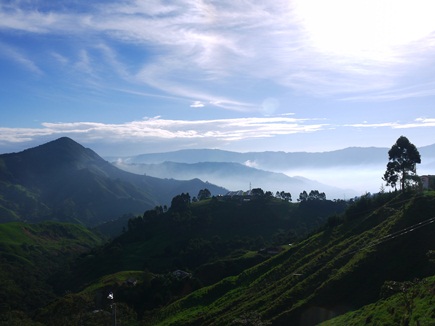
Día 1: una salida temprano de Medellín y la primera subida del día por San Antonio del Prado. Una hora y ya estámos en puro campo…
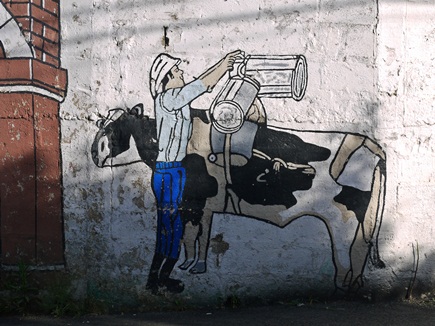
…y tierra de leche.
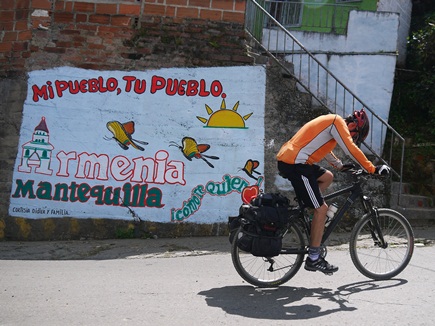
Desde la cima empieza la destapada: una bajada larga, una subida dura en el calor de mediodía y llegamos a Armenia Mantequilla. Un almuerzo típico…
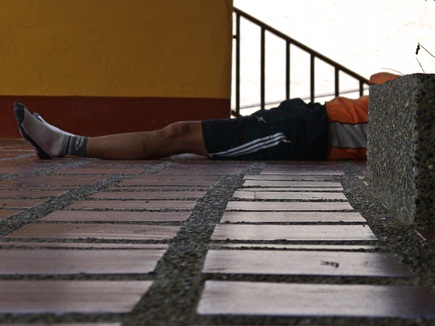
…con los resultados esperados.
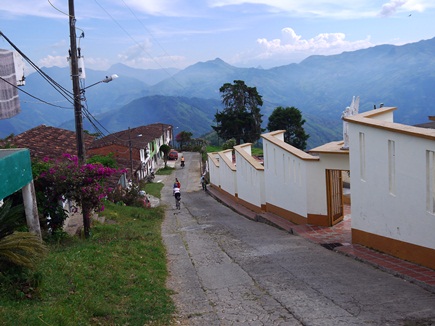
“..y el camino para Titiribí, cómo está?” preguntamos. “Más o menos” dice un chivero. “Muy, muy feo!” dicen los abuelitos jugando dominó. Un tinto para despertarnos y arrancamos.
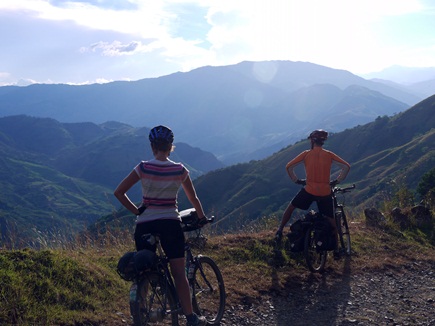
Dentro de 5 minutos me quiebra un radio – estámos al limite de nuestras bicicletas rigidas sin amortiguadores. Una reparación rápida y seguimos bajando, atravesando una cordillera hermosa por La Herradura…
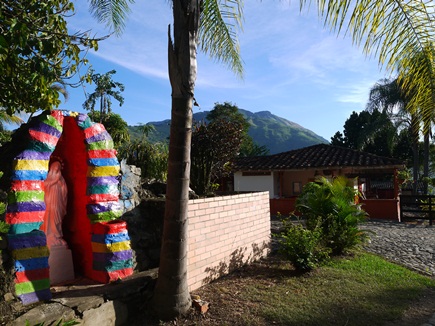
…hasta que llegamos a una finca sin salida. Nos perdimos. La familia nos orienta y nos invita a un guarapo – frío, rico y refrescante.
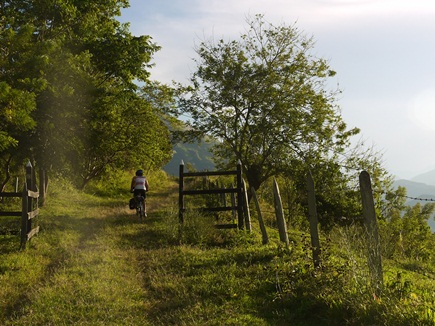
Regresamos 3km, esta vez subiendo hasta encontrar la salida correcta…
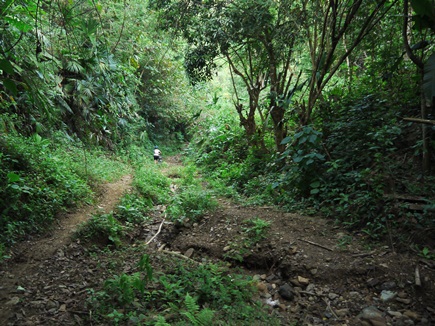
…una trocha que se convierte en camino de bestia. Me pregunto como el chivero de Armenia se metió por aqui – seguro que no fue en los ultimos 10 anos. Cruzamos el Río Amaga y se oscurece. Encendemos las luces y seguimos, ahora subiendo hacia las luces de Titiribí…o así pensamos. Pero son las luces de Sitio Viejo – todavía nos espera una subida de una hora más para finalmente llegar a Titiribí a las 10pm. Recorrido: 91km, 9h28min.
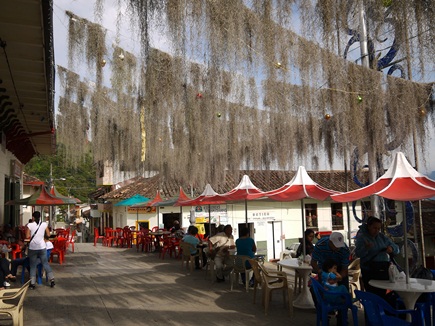
Día 2: Me despierto con las piernas pesadas. Disfrutamos la plaza de Titiribí (mi pueblo natal) con sus decoraciones de navidad y salimos rumbo a Ciudad Bolívar.
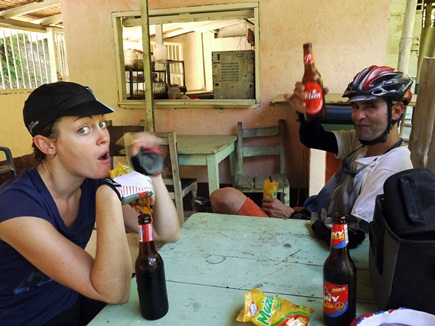
Nos espera un día mucho más suave en pavimento bajando al calor del Cauca por Bolombolo y Penalisa. Nos bañamos en el Río San Juan y buscamos la sombra en Remolinos…
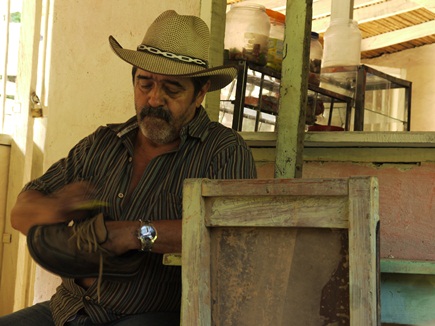
…donde un señor prepara sus zapatos de baile para la fiesta del 31.
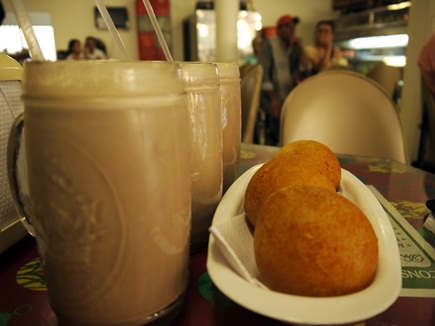
Una subida suave hasta Bolívar donde nos esperan milo frío, buñuelos y la familia de Pachito. Bolívar es el pueblo natal de Don Raul, y coincidimos con una reunión familiar: una noche de alegría, musica y chicharrón. Recorrido: 73km, 5horas1min.
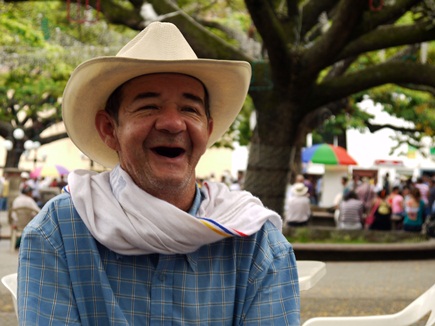
Día 3: un día de descanso y como siempre grandes risas con la familia López: conociendo a los personajes en la plaza de Bolívar: el cantante sin dientes de la famosa “Ja ja ja”…
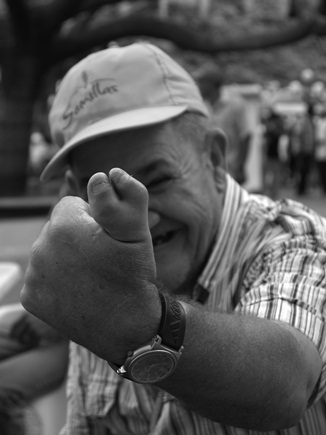
…y el hombre-langosta.
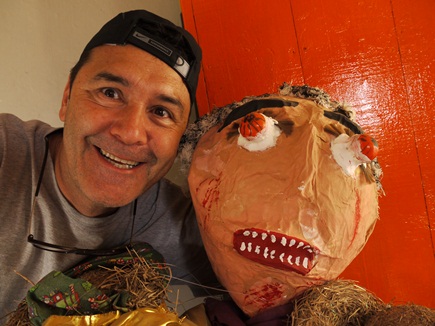
De Bolívar, subimos en carro hasta la Mansa, el primero pueblo del Chocó donde Raul conoce al año viejo “Seleputio”…
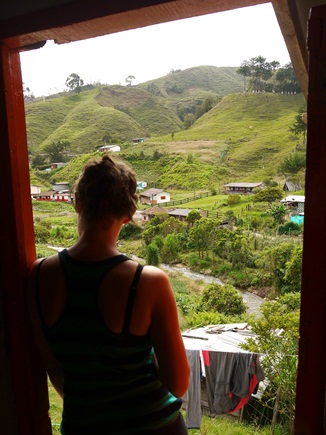
…y admiramos la vista.
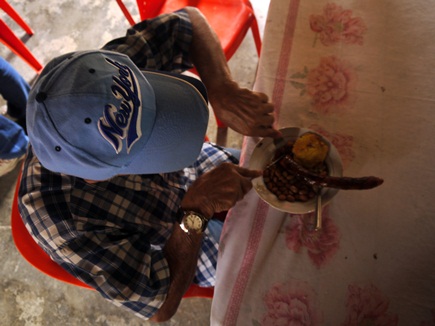
…mientras Don Raul da las ordenes en la cocina y sale primero con un plato de fríjoles, chorizo y patacones.
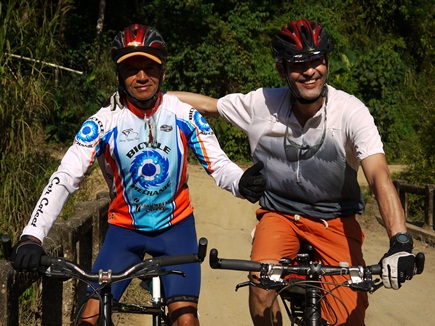
Día 4: El equipo de 3 se hace 4 con la adición de Jaime, un amigo de Pacho y un montador de Bolívar que nos acompaña hasta Hispania.
Primero regresamos hacia Remolinos, antes de meternos por una bonita subida destapada en la sombra…
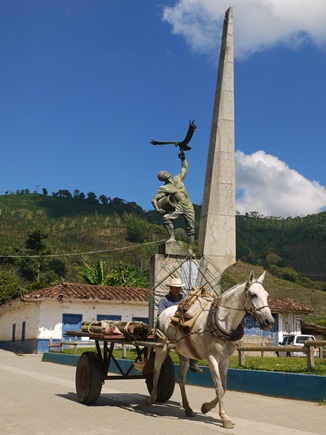
…que nos lleva a Betania.
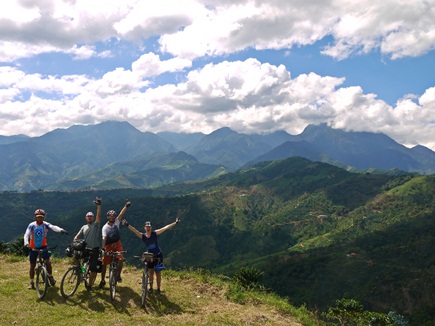
Despues del segundo desayuno y una interpretación impresionante del “Tócame el aguacate…” de Jaime y Pachito, salimos por una travesía increíble que nos conduce a una cancha de futbol con una vista espectacular…
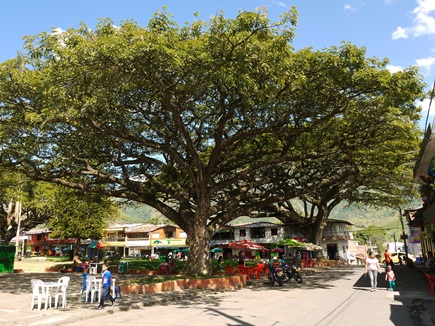
…antes de bajarnos a la plaza de Hispania y la sombra de sus lindos samanes.
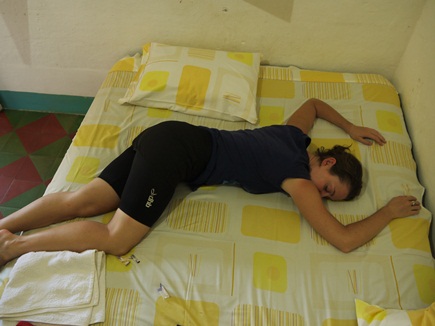
Una siesta…
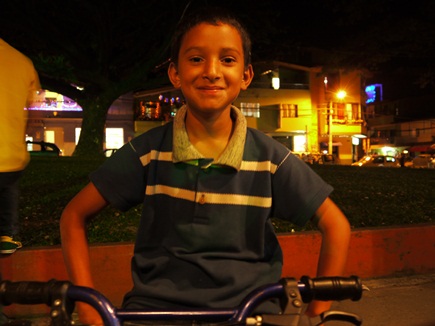
…y salimos para disfrutar el ambiente del 31. En el parque conocimos a Jason (el ratoncito), un niño que da vueltas y vueltas en su bicicleta sin frenos. Gracias a los esfuerzos mecánicos de Jaime, los frenos se quedan peores que antes, y le regalamos un poco de dinero para repararlos, con promesas de regresar algún dia. Recorrido: 49km, 4h16m.
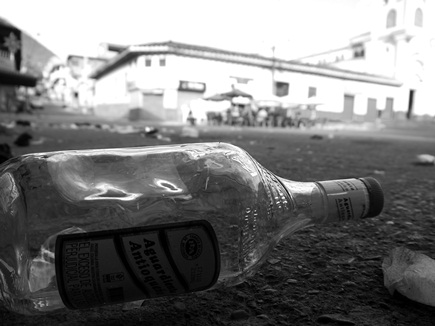
Día 5: el primero de enero y la fiesta sigue en Hispania cuando salimos. Seguimos por el pavimento casi hasta Andes, donde nos doblamos para arriba, subiendo por una zona linda de puro café…
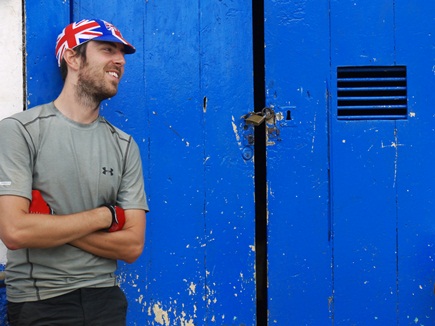
…hasta Buenos Aires, donde los británicos buscan la sombra…
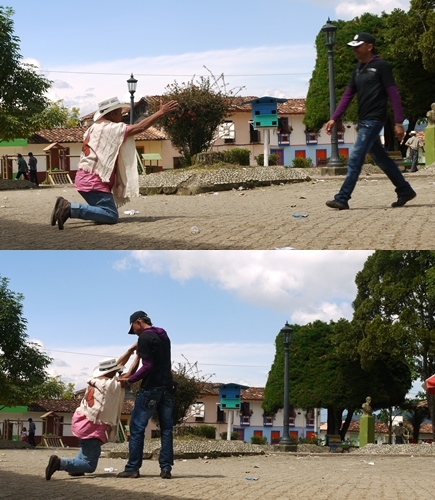
…y el pueblo sigue de guayabo con los borrachos pidiendo ayuda para regresar al bar. De aquí una subida corta pero dura en piedra suelta nos lleva hasta el altiplano lindo de La Playa…
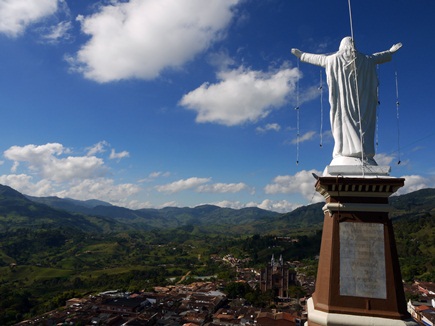
…y a Jericó: un pueblo bello con una vista de la sierra alrededor…
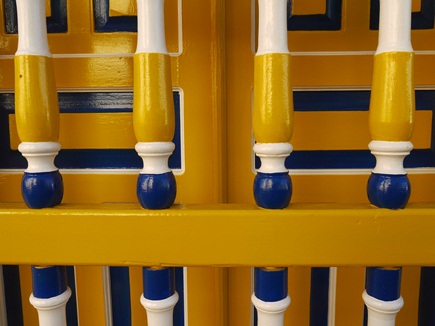
Colores lindos…
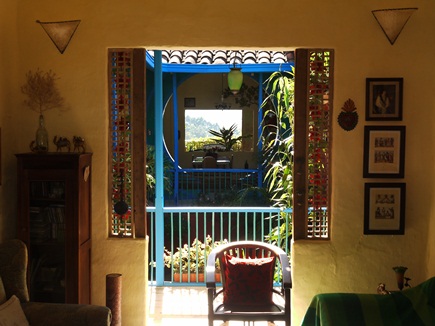
…y casas con vistas increíbles. Recorrido: 53km, 5h28m.
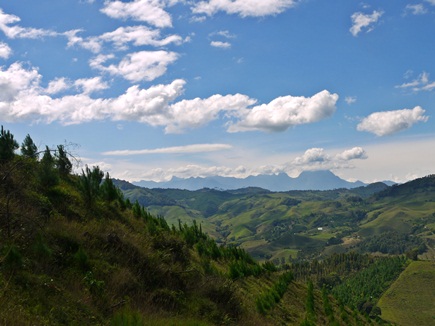
Día 6: Despues de una mañana explorando Jericó y su excelente museo, subimos por destapada para Támesis con una vista espectacular hacia los Farallones de Citará…
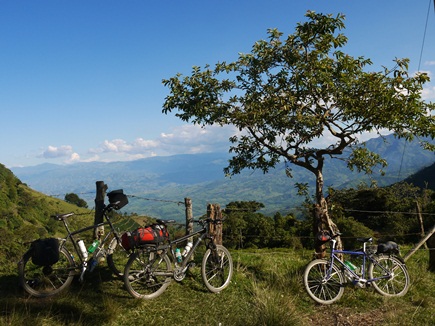
…y el Valle del Cauca en la bajada.
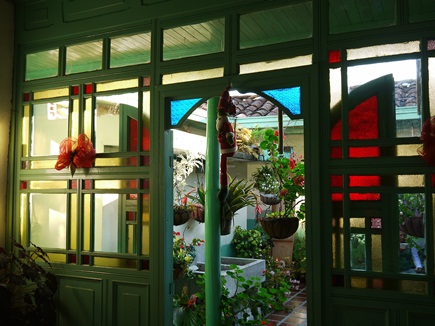
En Támesis, relajamos en la tranquilidad del hotel del turismo. Recorrido: 28km, 2h48m.
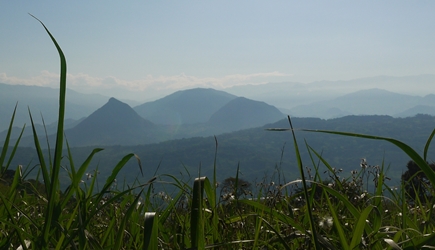
Día 7: Volteamos hacia el norte, rumbo a Fredonia. Primero una bajada en destapada con una vista de los Farallones de la Pintada…
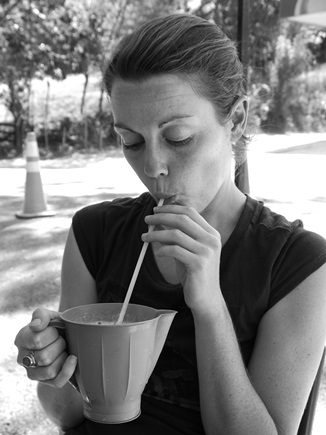
…una parada en Puente Iglesias para tomar jugos ricos…
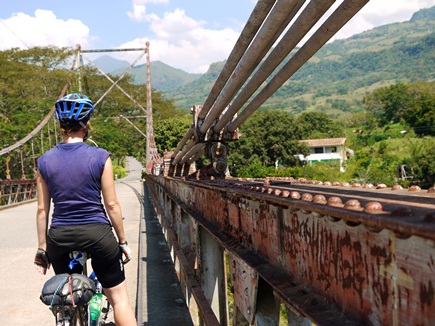
…y en el calor del mediodía empezamos la subida de 24km…
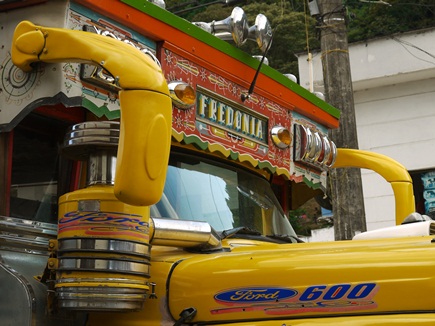
….que finalemente nos lleva a Fredonia. Recorrido: 53km, 5h03m.
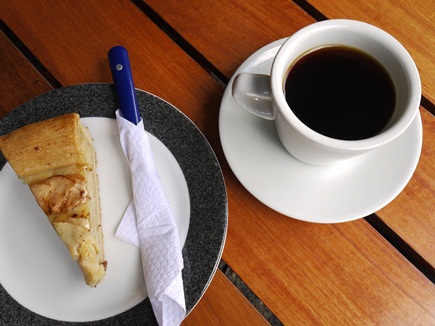
Día 8: Desde Fredonia, nos espera una etapa rápida hacia la ciudad por Los Palomos, Camilo C y Caldas…para llegar al Kaldi Kaffe en Carlos E, donde pedimos doble espressos con torta de celebración. Recorrido: 63km, 4h11m. Recorrido total: 410 km, 6½ días pedaleando.
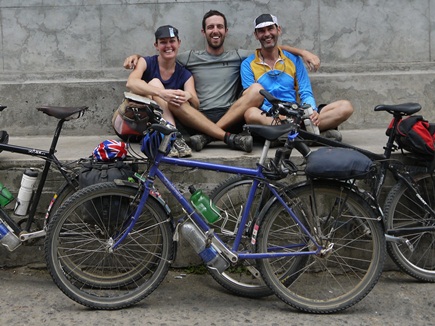
Mil gracias hermano Pachito “Electro Willy” López – quién sabe cuando será, pero esperamos el próximo recorrido con anticipación!
James
Adiós Medellín…
January 16th, 2013
Gracias por…
…los mejores recuerdos: nuestra primera SiCLeada en disfraz para la noche de las brujas, nadando en el pozo cristalino de San Rafael para despedir el guayabo, sudando en el camino para Santa Fé con Harold, conociendo al Tinno – el maestro de los marcos, subiendo al Parque Arví en el metro cable con Jorge, Flaca y Patrick, jugando “…de San Rafael viene un barco cargado de…TEQUILA!”, cuidando a Thor y Thora con super-mecánico Diego Palacio, conociendo a Milo y su café rico en la finca Los Alpes, trabajando con el equipo de EnCicla, subiendo a Santa Elena en El Turpial con más perros que personas, despidiendo a los parásitos gracias a nuestro médica Luisa, la fiesta de la bici de los alumbrados con cinco mil personas, pasando una navidad especial con la “Familia Bull”, conociendo al chicharrón peludo, montando en cicla con Don Mario y Tinno por el oriente, tomando cervezita y planificando nuestra ruta al sur con Carlos “Pedaleando Alma” Carvajal, relajando en nuestra casa tranquila con Nora, encontrandonos con nuestros buenos amigos ciclistas Raul y Marta, y por supuesto prendiendo el “Electro Willy” de Fredonia…
…la comida paisa: nuestra primera bandeja paisa con Jorge y Flaca, la natilla navideña de la finca López, los buñuelos de todos tamaños (los buñuelitos de la Loma de los Bernal, los caseros de Nora y los buñuelotes de Sabaneta), las arepas de chocolo con quesito de Santa Elena con Jaime y Cecilia, el sancocho de pescado con Jorge en el almuerzo de Nochebuena, las hamburguesas de los martes con George, la “quesada” de Raul y Lina, el sancocho de pollo navideño de Gloria, el chicharrón y chorizo en La Mansa, Chocó, los pasteles de guayaba con Flaca, las almojabanas en El Boqueron con Harold, las empanadas calientes del hueco con Carlos y Balthi, el mondongo con la familia López, la lasaña y el tiramisú de Carlos, los fríjoles de Amparito, el asado argentino con Mario y Patrizia, el chorizo con Jaime y Gladys en Bolívar…
…los buenos tragos: los tintos de Pachito, el chocolate con panela y pescaditos con Don Raul, haciendo la mazamorra en la finca, tragos de grey goose vodka, el limoncello de Jonny, Club Colombia roja y negra en Carlos E, la avena casera de las panaderías, milo bien frio, Pony Malta en todas partes, el café Los Alpes cada mañana, los jugos de maracuyá y lulo al estilo “Memo”, la chicha de piña michelada al estilo “Carlos”…
…los lindos perritos: Pookie, Carola, Chócolo, Tita, Toña, Canela, Chola, Peluso, Canelo, Chiripa, Chapeto, Korozo, Tulio, Camilo, Horatio, Ursula, Lucretia, Gerónimo, Lorenzo, Pimienta – y Ágata la gata…
…y finalmente, el mantenimiento corporal: no podíamos salir de la capital mundial de la cirugia estética sin realizar unos sueños personales de la belleza y la seguridad víal…
Sarita y Juancho (medio paisas)
Jardín & Valle de Cocora
February 1st, 2013
Leaving Medellín after three wonderful months, that allowed our lazy non-cycling legs to turn to jelly and our hardened camping selves to go soft, was always going to be tough. The exit from the city was as ugly as we expected but we were pleased to be back on the move and making progress.
Perhaps a reflection of the fact that we’re a bit out of the cycling groove, is that for me, the two most memorable sections of the last few weeks back on the road have been where we’ve been stopped for longer than expected, had time off the bikes (again) and made the most of some of Colombia’s most picturesque places.
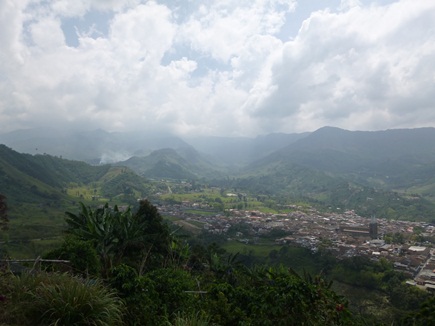
Only two days out of Medellín, we were invited to stay in Jardín, Antioquia. Nestled in the mountains and a bit further than planned, it made our second day of riding tougher than I'd have liked but worth the effort.
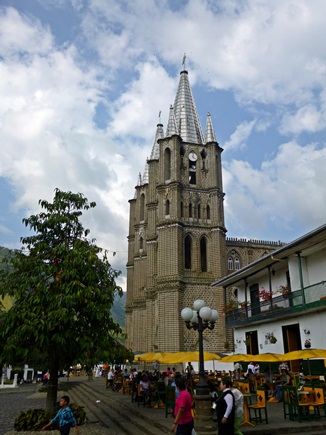
Having made friends with Carlos, a fellow bicycle tourist who organises the Fiestas de la Bici in Medellín, he all but insisted that we pass by his pretty home town on our way south and who were we to refuse?
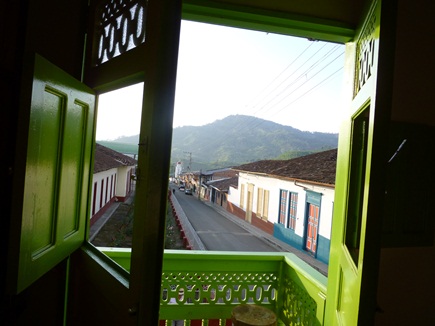
Relaxing with Carlos and his family was just too enjoyable. We arrived late on a Friday night with plans to spend the day in Jardín on Saturday and then leave….we were there until Tuesday.
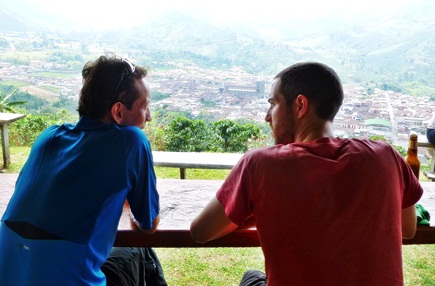
First on Carlos' introduction tour to his home town was a trip up to a lookout over the town, where we lazily drank beer in the midday sun and James and Carlos talked endlessly of “urban bike strategy” and converting the potential of cyclists in Medellín into a reality.
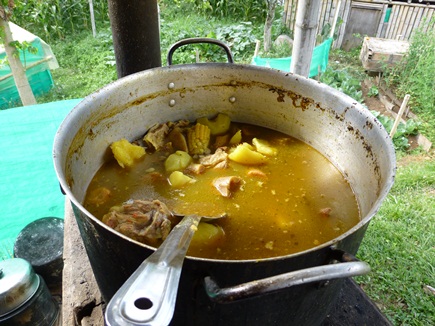
Carlos' brother Alvaro – who just happens to be the mayor of Jardín – then invited us to join him in the countryside for sancocho. A dish that is the pride of Colombia and containing yucca, corn, potatoes, pork and plantains it's a cyclists' carbohydrate filled dream.
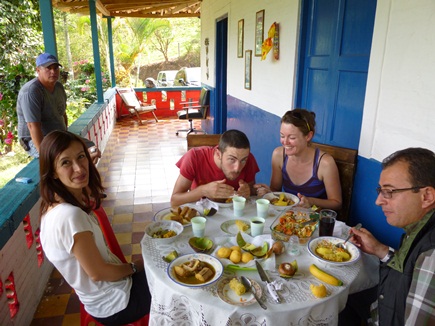
It was evidently becoming hard to tear us away from our favourite department in Colombia; the food, the culture and the hospitality of Antioqueños is going to be hard to forget.
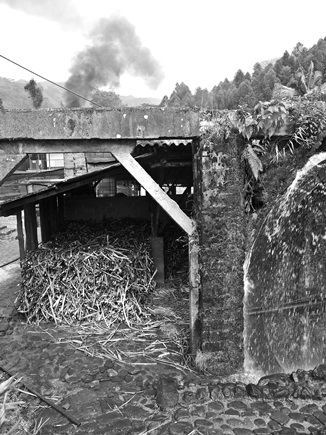
We've been eating a lot of “panela”, dried sugar cane juice, with our morning porridge, so we were keen to see it being made. Carlos took us to a “trapiche” the mill where the cane is gathered…
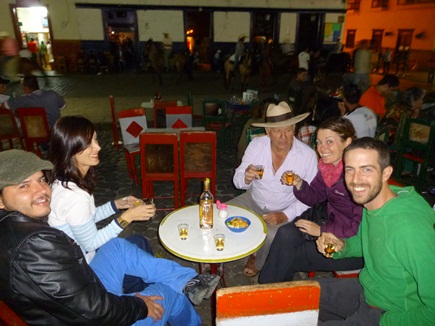
Carlos was an incredible host and treated us like royalty. We flinched a little when he suggested a night on tequila but before you could say “salt and lemon” we were doing shots in the town square.
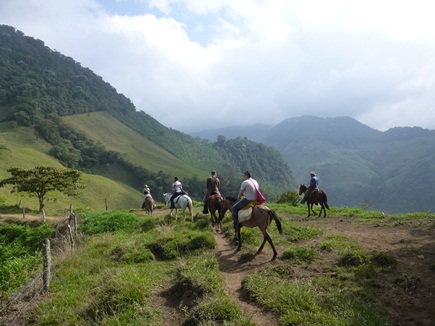
The following morning was thankfully hangover free. We had an an early start and found ourselves swapping the comfort of our trusty bikes for the less predictable saddles of local horses, for a trek into the mountains. It's more than ten years since either of us have ridden a horse so we were a little nervous…
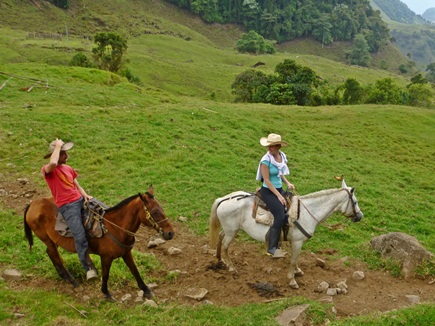
…but thanks to some authentic Colombian headwear to put us in the mood and a pair of trusty and docile steeds, we soon got into the swing of it.
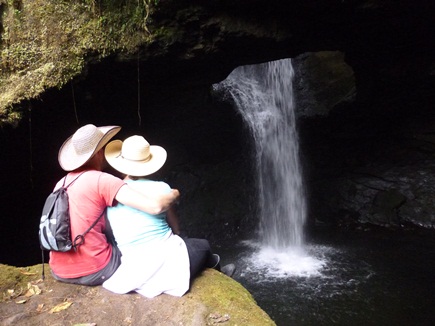
The ride took us to the pretty waterfalls at Cuevas del Esplendor, where we dutifully posed for a photo to show off our splendid, borrowed, hats.
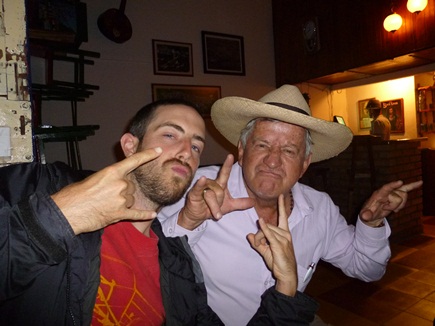
And then another unplanned night of shots – this time it was tasty Colombian rum, with Carlos' dad, Don Eduardo in a little bar on the town square…this photo was taken after the second of three bottles.
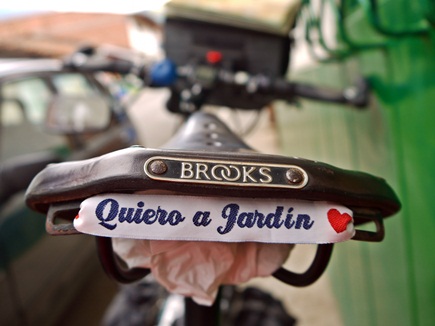
Finally we tore ourselves away from Jardín, graciously declining the generous offer of the Carvajal family to terminate our travelling plans and live indefinitely with them in Antioquia. We were delighted to find our bikes had been decorated with various souvenirs of Jardín while we were sleeping…
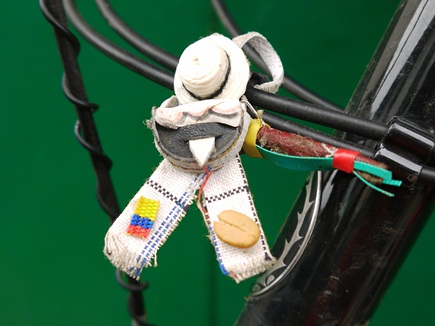
…a reminder of our time with wonderfully generous Paisas. This souvenir represents a typical Paisa campesino from this area – with his trademark hat, coffee been, machete, Colombian flag and carriel satchel.
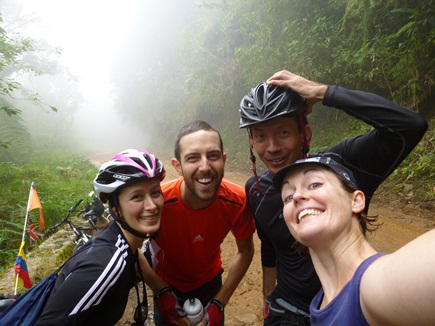
Carlos and his friend Clara accompanied us on their bikes along the beautiful but misty dirt road towards Río Sucio and we said cheerio on an incongruous bend shrouded in drizzle…we hope it's not a permanent goodbye and we'll have a chance to ride bikes or horses again with Carlos one day.
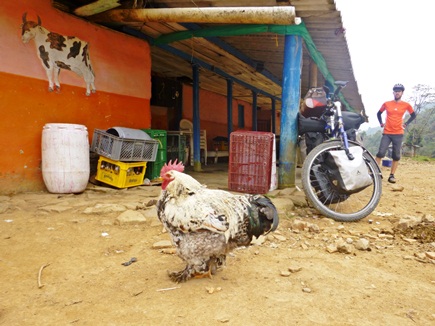
Linking us from Jardín to the next beautiful spot was the Eje Cafetero, Colombia's coffee growing region. First down the dusty hill, past the fluffy chicken to Río Sucio…
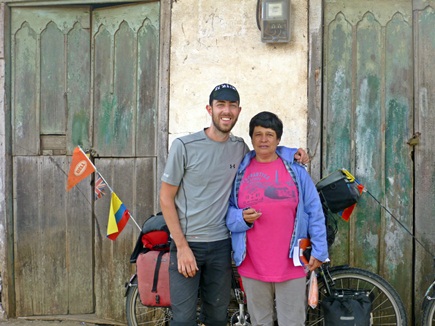
…on to San José, a tiny village in the heart of coffee land where a chance meeting with Gloria on her motorbike led to the offer of an emtpy house where we could camp for the night…
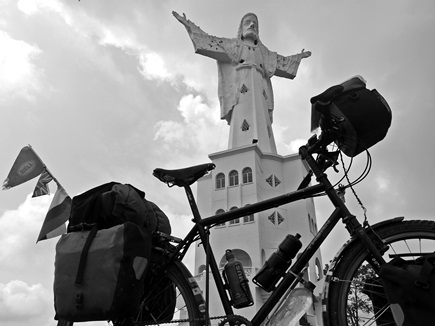
…from there, past the second biggest (and somewhat out of proportion) Christ statue in South America at Belalcázar…
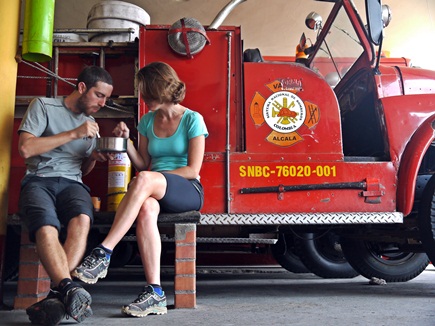
…a brief overnight stop and breakfast in front of an ancient fire engine, with the hospitable firemen at Alcalá…
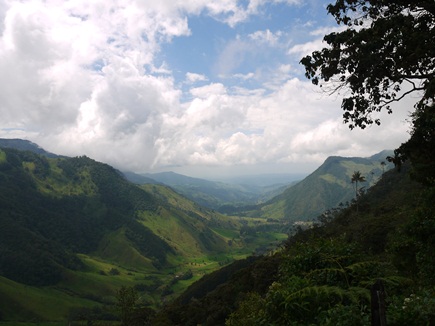
…before the 10km slog from Salento up to the Valle de Cocora. Acting on another recommendation – this time thanks to our other cycle touring buddies Raul and Marta – we made the trip into a valley of incredibly tall and beautiful wax palms and we didn't regret it.
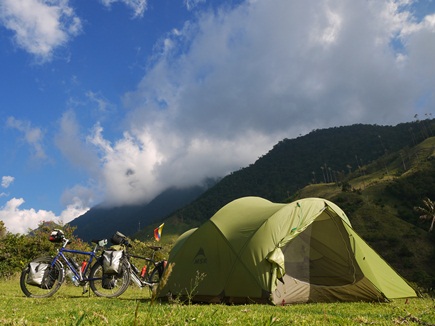
We had to dust off the cobwebs and try to remember how to put up the tent for the first time in nearly four months…a live action version of the tent raising can be seen here.
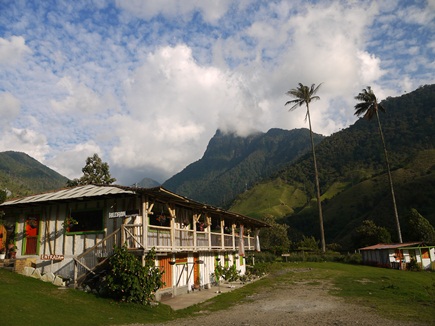
…before treating ourselves to some of the yummy food at Valle Hebron, the spot we had chosen to camp:
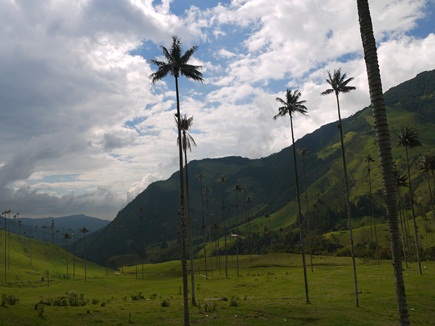
We spent a day trekking up the valley, through the majestic fields of palms. We realised that part of the reason they seem so striking is because the rest of the land has been cleared for grazing cattle, making the trees (over 200 years old and more than 60 metres) seem even more impressive.
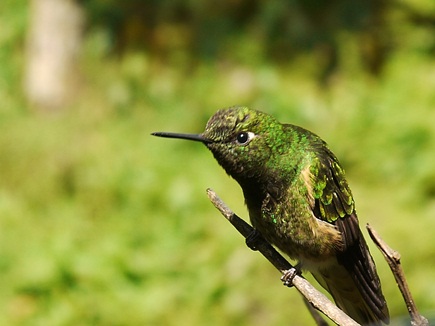
Up into the woods, to a hummingbird sanctuary where there were hundreds of these incredible little birds…
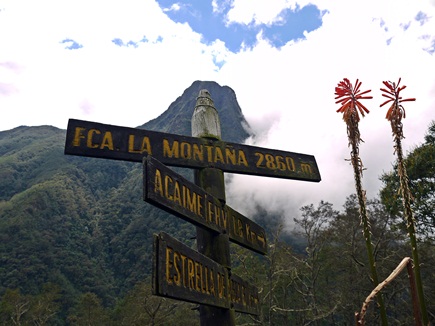
Onwards and upwards to the highest spot of our walk, La Montaña – at 2,680m it kind of puts stumpy old Ben Nevis into perspective!
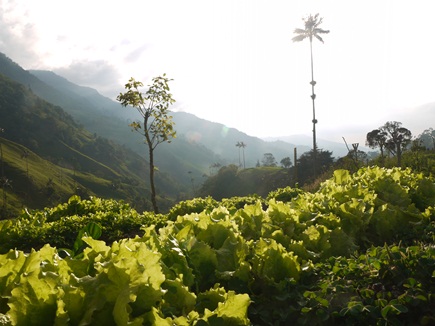
Luz, the owner of Hebron had gone home for the day and we had the place to ourselves but before she left, she invited us to delve into her organic garden, so with the last of the light, we raided the lettuce patch…
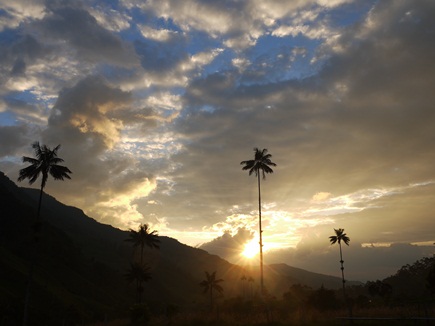
With the sun setting on Cocora we munched on delicious fresh organic veg and breathed in the incredible view…a perfect end to a couple of magical rest days.
Sarah
Riding El Trampolín: Mocoa to Ecuador
March 2nd, 2013
It seems that my camera memory card has become a fairly reliable barometer of how much I’ve enjoyed a ride on this trip. A full memory card usually means I’ve been inspired – invariably by exploring back roads, discovering small villages and towns and meeting lots of locals. If however all I find are a few dutiful but lame snaps of us standing in front of something vaguely touristy, then chances are we’ve relapsed (or occasionally been forced) into “destination” riding mode: busy highways, big towns and minimal human interaction.
By this theory, my near-empty memory card would suggest that much of our southerly Colombian leg from Valle de Cocora down to Mocoa fell into the second category – or “auto-pilot” as I’ve come to call it. It’s not that didn’t have its moments: the stunning walk to visit the tombs at Tierradentro; a night spent with a wonderful campesino family high up on the Páramo de las Delicias; and the impressive statues of San Agustín were all highlights. Yet it just didn’t quite inspire us in the way that most of our riding in Colombia up until then had.
Firstly I think we chose our route badly, opting to head south through the Cauca Valley instead of crossing towards the Magdalena through the Nevados del Ruiz. You’d think that we’d have learned by now that although valleys and coastal plains might mean flat and fast, for us they also usually mean hot and tedious.
Then we managed to time our passage through the departments of Cauca and Valle del Cauca just as the FARC were dusting off their guns from the Christmas ceasefire, and things got caliente (“hot”) in the very Colombian sense of the word. The minor road that we were planning to take through the foothills to avoid Cali suddenly became a focus for FARC activity. Then the alternative route took us towards Puerto Tejada, a town where cars were stopping in the road to tell us that we were “guaranteed” to be robbed, and we eventually succumbed to a 30km police escort. We didn’t feel at risk at any point – especially by the FARC action which was all targeted at the police and military – but it did represent a distinct change of atmosphere from the carefree riding we’d enjoyed further north.
Perhaps it was also just because we could sense the end of our time in Colombia finally closing in on us. I guess after six months in this captivating country, an anti-climax of sorts was inevitable. But I think as much as anything it was because – in our heads at least – the last few weeks have felt like they were just leading up to this famous road from Mocoa to Pasto.
Nicknamed El Trampolín de la muerte (“The Trampoline of Death”) because of the regularity with which bus and car drivers seem to manage to drive over its precipitous drops, it is equally famed in cycling circles as a tough but essential part of the Colombian touring experience. Fortunately for us, the Trampolín lived up to its hype, restoring our enthusiasm for the road and filling that empty camera memory card.
Over the course of just 155km we pedalled from the steamy edge of the Amazon up to the misty páramo of the high Andes. It felt like a fitting end to our Colombian experience, encapsulating in just a few days the incredible variety and contrasts of this wonderful country.
James
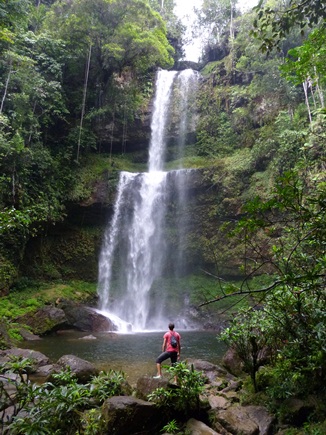
Before setting out from Mocoa, we spent a couple of days camped out with the monkeys and toucans in the garden of the friendly Casa del Río hostel. In between the rain, we found a way through the mud up to the spectacular Hornoyaco waterfall…
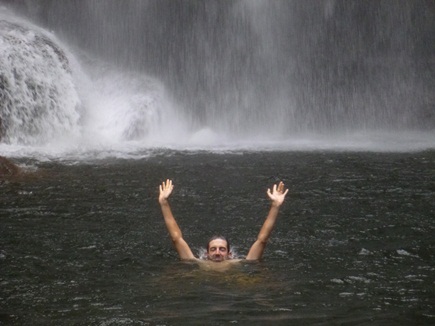
…where we didn’t need much persuasion to dive in and enjoy the best power shower I think we’ll ever have.
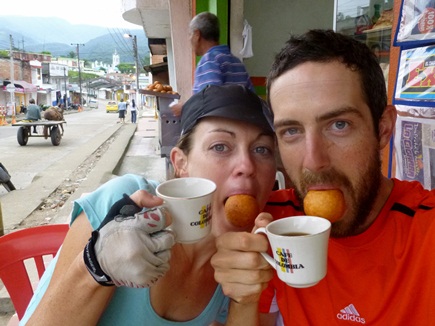
We set out early from Mocoa with the best of intentions – at least until I spot these buñuelos by the road. If six months in Colombia have taught me anything, it’s that cold, old buñuelos are best avoided – but fresh, hot ones like these are not to be missed. Cue a second breakfast – we might need the extra calories, I reason…
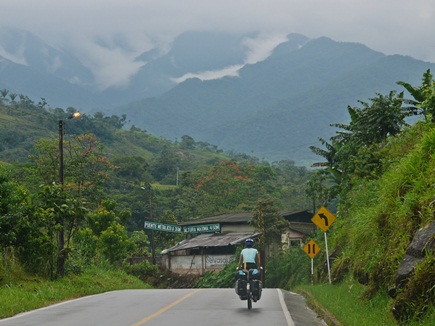
The first 15km out of Mocoa are paved and smooth, with only the looming mountains in the distance giving a hint of what’s to come…
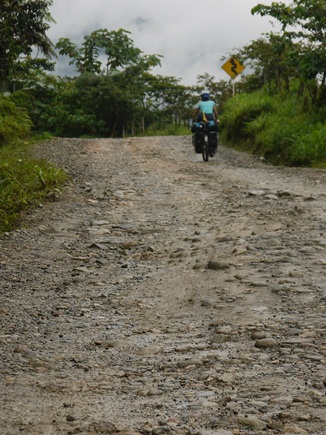
…but soon the pavement ends and the dirt begins, winding its way gradually up into the forest. The gradient is steady at least, and the surface good – better in fact that many of the other dirt roads we’ve ridden elsewhere in Colombia.
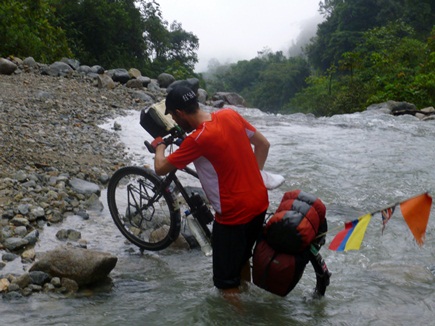
After numerous rodent attacks in the US, the undersides of my front panniers now resemble colanders; they gave up being waterproof a long time ago. This calls for some lifting over the numerous streams to try and at least keep some kit dry.
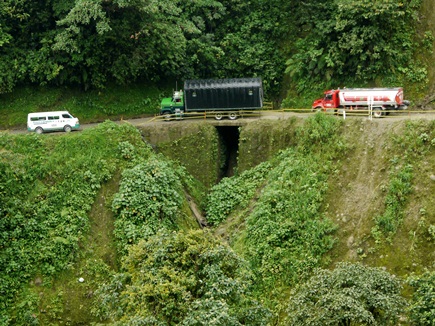
Despite being single lane in many places, this is the main route between the departments of Putumayo and Nariño, and so sees a fair amount of traffic. This leads to some interesting reversing manoeuvres…
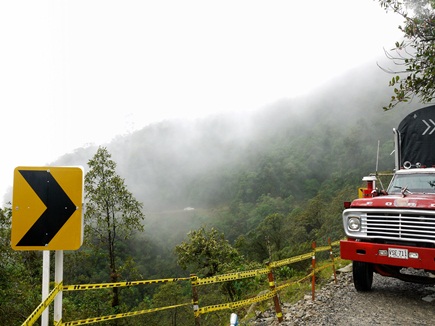
…and calls for some precision steering on the curves. Unfortunately, not everyone quite makes the bend…
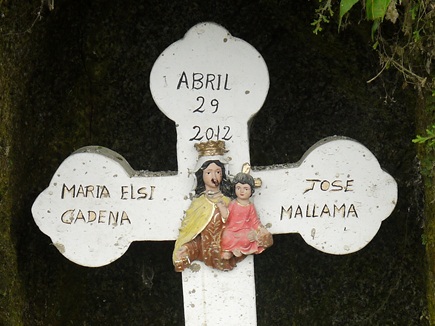
…as the roadside shrines attest – this one from just last year.
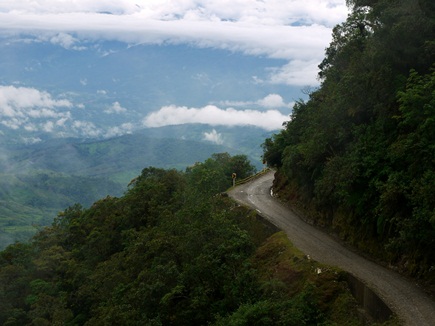
A few glimpses of where we had come from below, and then the clouds and mist roll in and unleash a vicious rainstorm, drenching us. This is where the climb really helps – keep pedalling, and you will keep warm.
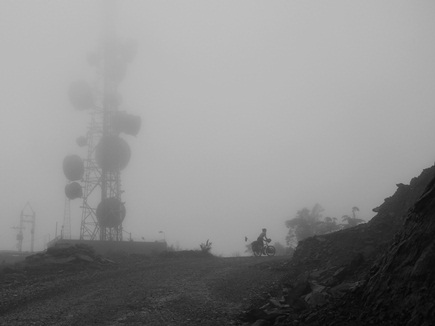
You know you’re getting near a pass when the communication towers appear, looming ominously out of the mist…
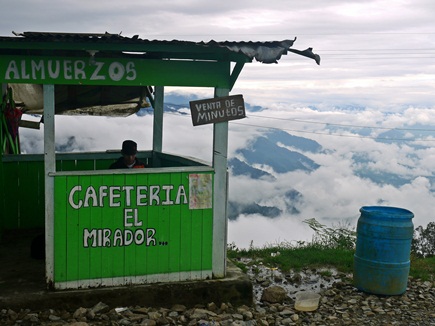
…and sure enough we emerge out of the clouds at a mirador, complete with police station and a huddle of cafés. We order soup to warm up, and a few minutes later our new cycling friends Mike and Karen arrive – they started in Canada back in 2011 and we had camped together in Mocoa.
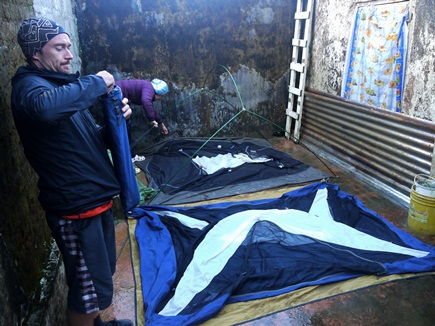
It’s still early and we have only come 35km, but we are cold and wet, and the police tell us we will struggle to find anywhere flat to camp until much further ahead. The friendly café owner offers to clear a deserted building for us to camp in. We don’t need much persuading, and squeeze in the tents.
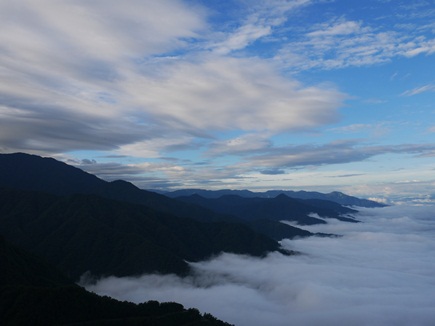
Late afternoon reveals an incredible view from our perch: a duvet of cotton clouds nestled over the Amazon, nudging against the edge of the Cordillera Central. We make friends in the little community of police, cafe owners and roadworkers. The police tell us how in 2002 this zone was home to some fierce fighting – apparently the guerrillas managed to blow up the police station three times. I spend much of the evening translating Adele’s “Someone like you” into Spanish at the request of one of the roadworkers – all good practice…
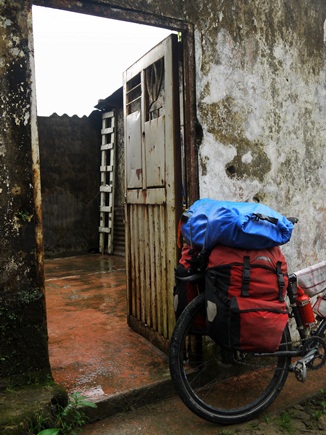
After a good night’s sleep, tents are packed and bikes ready to roll.
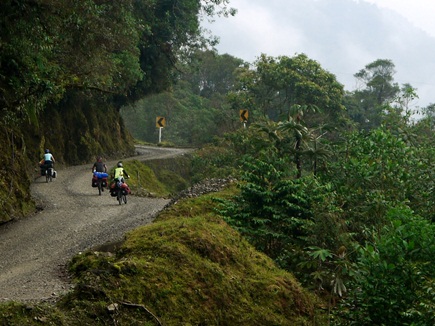
Our new foursome sets off…
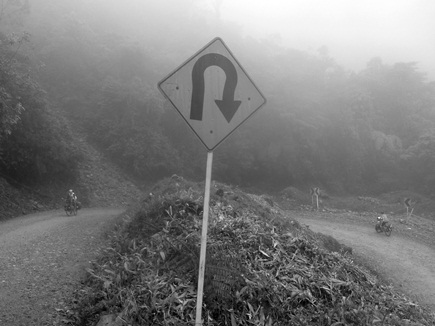
…around steep hairpins as the mist closes in again.
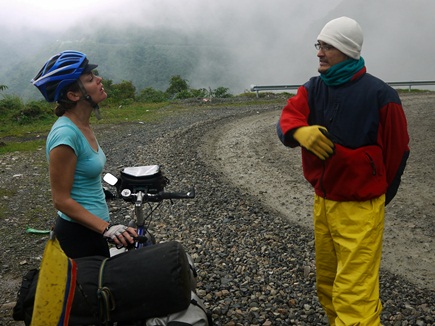
A local on a motorbike stops for a chat – note the slight difference of clothing between cyclist and motorcyclist. It turns out he is a cyclist too, and – as so many times before in Colombia – he passes us his contact details, making us promise that we will come and stay with him next time we are here.
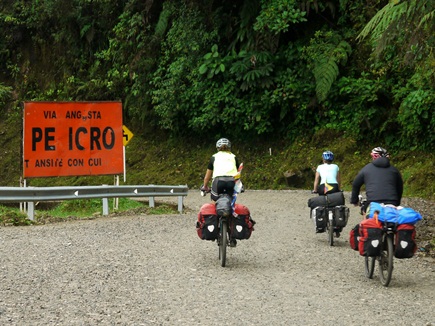
A brief downhill respite, past danger signs helpfully warning us that the road is narrow (just in case we hadn’t noticed), into gullies…
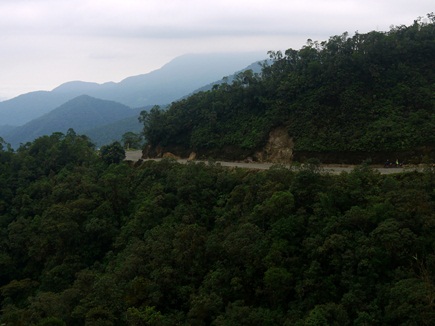
..and along narrow ledges. Spot the cyclists!
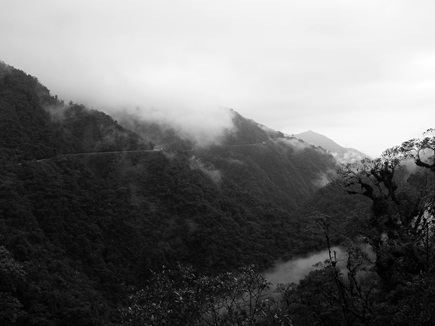
Photos just don’t do it justice, but this section of road is truly breathtaking, clinging to the side of the mountain through seemingly untouched cloud forest. A long, steep climb which seems to go on forever…
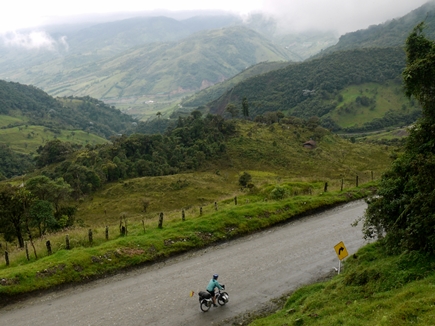
…before finally sweeping down towards the Valley of Sibundoy. Clearly sensing our elated mood, this is when a rogue dog decides to jump out and give Bedders a nasty bite on her leg – our second dog bite of the trip after my encounter in Costa Rica.
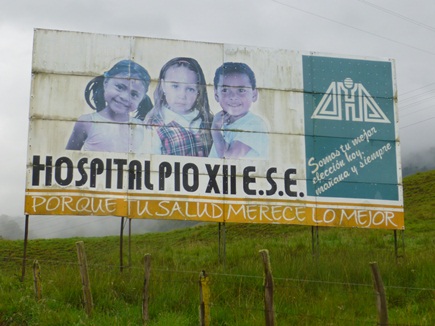
Fortunately we both had our initial Rabies shots before we left home, and so we just need to find someone who can give us the two booster jabs and a course of antibiotics. We get lucky – the local hospital in Colón has the vaccine and even better, won’t charge us.
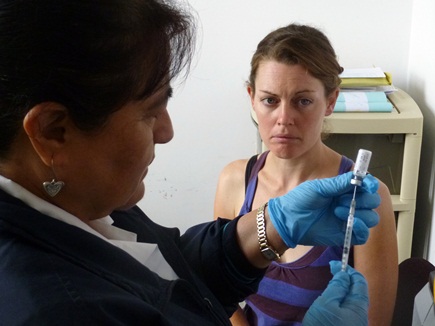
And so we leave Karen and Mike to continue towards Pasto, while Sarah heads for the hospital with some trepidation…
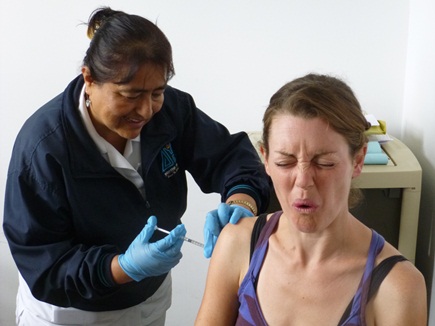
…where the jab is delivered with a typically Colombian smile from Ruby the nurse, and received with an impressive grimace from Sarah. Thank you Ruby for your help!
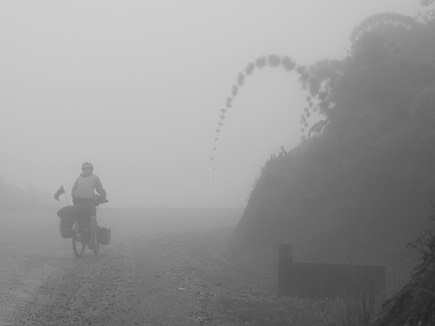
The next morning we decide to ride on towards Pasto, from where we’ll be able to catch a bus back to Colón in a few days time for Sarah’s second jab. It’s a tough climb out of the Sibundoy Valley through the rain, with only overhanging triffid-like plants hinting at the páramo beyond the mist.
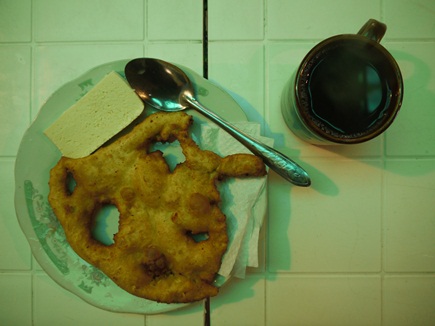
Morning snack: it might not look appetising, but when you’re cold and wet this hojaldra (sweet dough fritter), served with queso (soft cheese)…
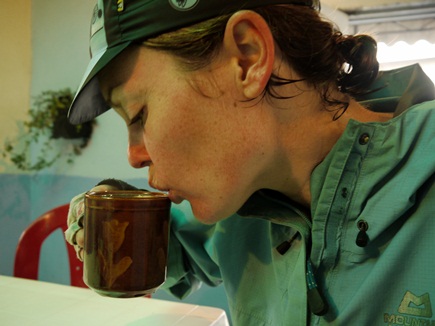
…and steaming agua de panela (hot sugar cane juice) really hits the spot.
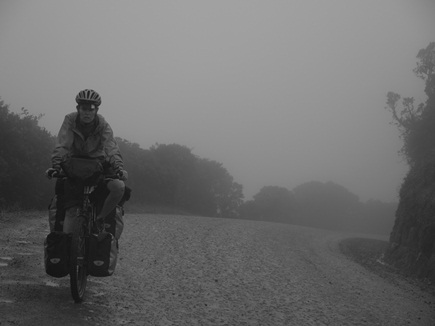
Finally we crest the pass – sadly I was too slow to catch Bedders turning round and making a very rude gesture at the hill behind her as she came over the top – and then it’s downhill…
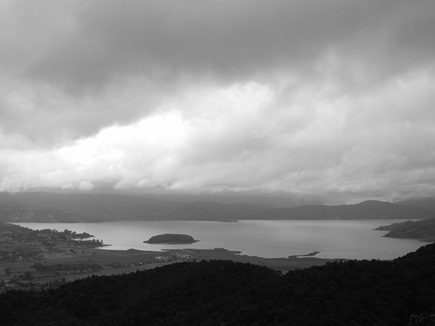
…until the Laguna de la Cocha comes into view, looking suitably moody in the mist.
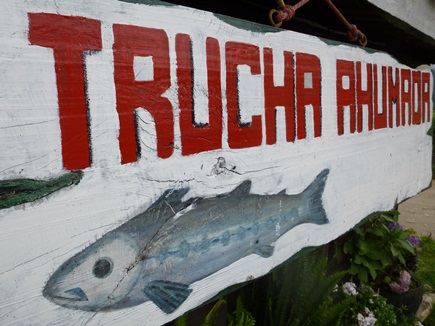
A tip from our Medellín friend Carlos sends us in search of a restaurant called Naturalia…
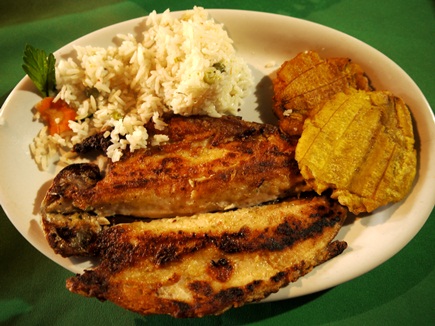
..where we tuck into the local speciality, trucha ahumada (smoked trout). It is truly delicious – by far the best we have eaten in Colombia. Stuffed, we gratefully accept their invitation to set up our tent on their balcony.
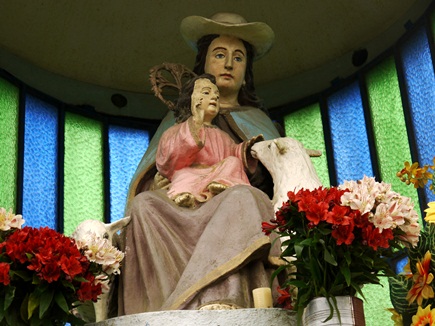
The next morning it’s a short climb up to the pass – guarded by a slightly moody looking Mary in a sombrero – followed by a beautifully long descent into Pasto. The next day we take a vomit-inducing minibus shuttle back to Colón for the second Rabies jab, realising just how grateful we are to be travelling through the Andes on two wheels instead of four.
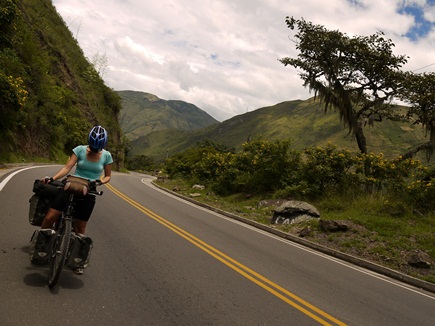
From Pasto, it’s a beautiful rollercoaster ride on the Panamerican towards the border…
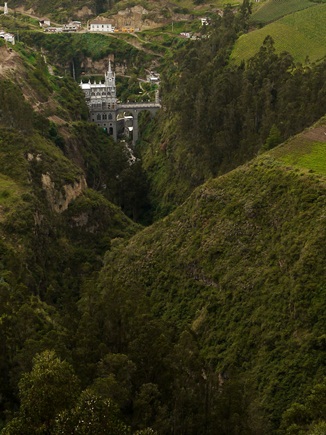
…with just enough time for a detour to visit the sanctuary of Las Lajas, perched dramatically across a ravine outside Ipiales. Our last night in Colombia is spent in a convent with the nuns, emotions whirling at the prospect of leaving a country which after six months has become home to us.
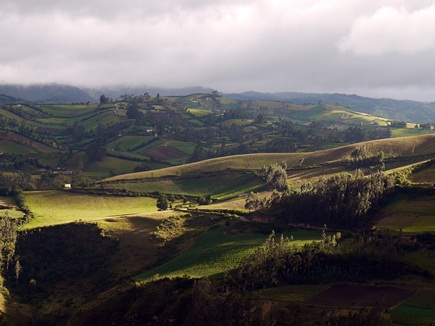
The next morning we cross, and Ecuador awaits – its patchwork fields are at once strange and yet reassuringly familiar, looking for all the world like a high-altitude version of the Yorkshire Dales. You never know, they might even have Yorkshire pudding…
Caras de Colombia
March 5th, 2013
When I sat day-dreaming about this trip at my desk (and indulging myself in far more Pan-Am cycle touring blogs than was probably healthy), it was images of epic landscapes that made up my mind’s picture of what this adventure would be. Stunning photos of cyclists blazing a trail through the endless spruce of the Alaskan wilderness; of tiny specks crawling their way up herculean Andes climbs; and of figures bent double battling their way into the ferocious Patagonian headwinds. These were the landscapes I came for.
Yet the reality has been very different. Not that we haven’t already seen some of those epic landscapes – we have seen plenty, and I’m sure many more await us to the south. But a trip that was supposedly all about the landscapes has instead turned out to be as much – or maybe even more – about the people we have met along the way.
The landscapes provide the backdrop, but it is the thousands of human interactions which burn most strongly in my memory of the last year and a half. Most have been fleeting – a few minutes outside a shop or at a junction; others have invited us into their homes or gardens for the night; some have even welcomed us into their families for days at a time.
And nowhere have the people we have met along the way been more at the forefront of our experience than in Colombia. Partly this is because – as every cycle tourist before us has discovered – of the innate warmth and friendliness of pretty much every Colombian we have met. But it is also because after six months here, Colombia will probably be the country in which we will have spent the most time in the whole trip.
We spent three of those months in Medellín, giving us the first real chance of the trip to put down roots and really connect, beyond the usual twenty questions we face in our roadside encounters. We left Medellín with a group of true friends who I hope we will see again on one side of the world or other. And so, it seems fitting to wrap up our Colombian adventure with just a few of those faces that have made our last six months here so memorable.
James
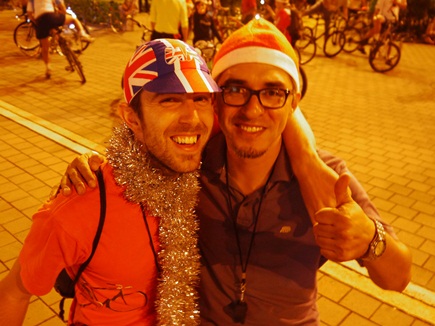
Jorge, aka George: Friend, riding partner and bike promoter extraordinaire. Jorge was the man who encouraged us to come to Medellín, and who welcomed us into his extended cycling family with open arms and a bottomless stomach that matched even mine – from our first bandeja paisa to Tuesday night hamburguesas. Gracias parcero – buena vibra, buena biela y buen Brooks!
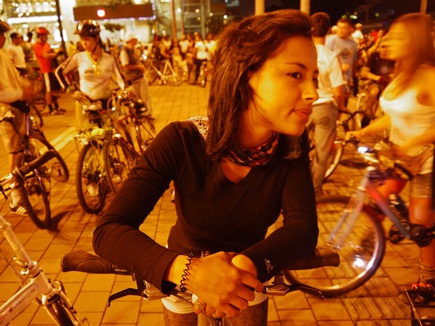
Dorancy, aka La Flaca: Jorge's other half and Sarah's Spanish conversation partner. An endless source of patience in correcting the faux pas of the bumbling English – from Spanish pronunciation to the correct time of day to be eating a buñuelo.
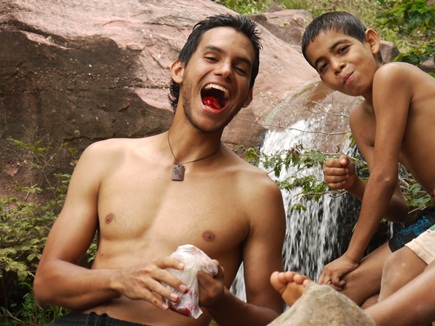
Julian: Julian and his wonderful family initiated us into the world of Colombian hospitality in Bucaramanga. A quick stopover turned into two nights and then three, followed by a beautiful if altitude-curtailed joint visit to El Cocuy National Park.
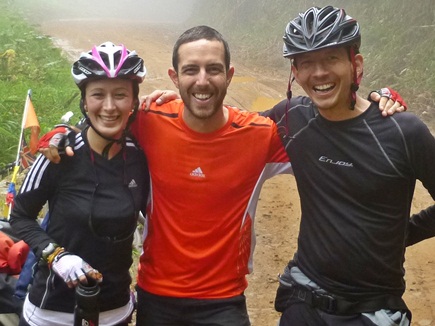
Carlos, aka Caliche: The man who persaudes up to 5,000 cyclists to take to the Wacky Races-esque streets of Medellín every month in the critical-mass inspired Fiestas de la Bici . Carlos is an ever-smiling, ever-charming ball of pedal-powered fun who has himself toured South America by bike and spent hours poring over maps with us, giving us countless tips for the journey south. He also invited us to spend a memorable few days in his beautiful home town of Jardín…
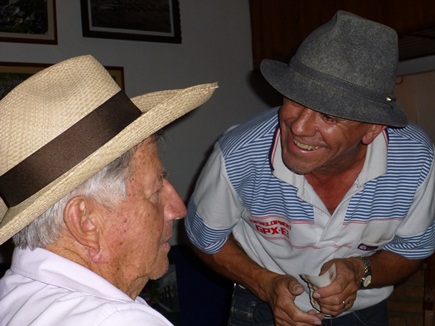
Don Ed and Toto: …including the funniest night we have spent for a long time in the company of his dad, Don Ed(uardo), the owner of their favourite local bar, Toto, and several bottles of Antioquia's finest rum. Over the course of the night – in true Mr Ben style – Toto worked his way through the contents of his very deep fancy-dress cupboard. Suffice to say I will never forget his Colombian interpretation of Rod Stewart.
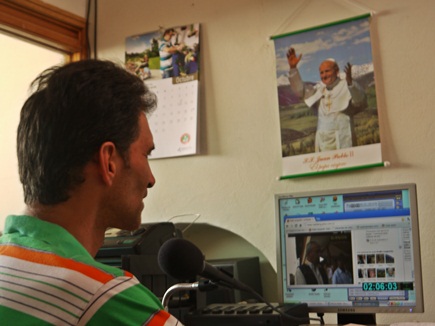
Eduardo: News travels fast in Zapatoca, and so when two gringos on bikes rolled into the village square, local radio presenter Eduardo was there in minutes with his mic and camera. What started as a five minute interview turned into an overnight stay on his finca and a a fantastic ride the next day to Guane with Eduardo and his cycling buddy, Manuel.
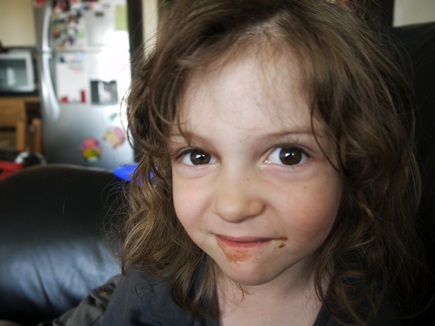
Balti, aka El Monstruo: Husband of a friend of a friend (yes, we are becoming masters of the tenuous connection), Balti and dad Carlos welcomed two tired and malodorous cyclists into their Medellín apartment while we found our feet in the city. Carlos broke our porridge and spaghetti routine with delicious Colombian dishes, while Pony Malta-fuelled Balti kept us on our toes with endless toy car races around the apartment.
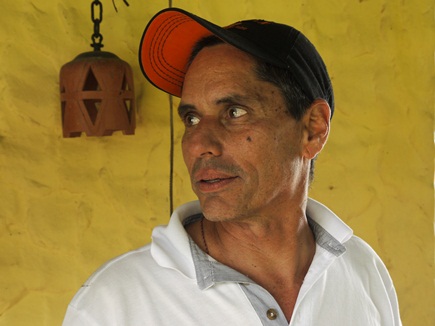
Milo: You'd think good coffee wouldn't be hard to find in Colombia, but sadly most of the good stuff disappears overseas or into exclusive coffee shops before most Colombians get even a sniff of it. Fortunately there are farmers such as Milo, who are leading a drive to create a mainstream culture of high quality coffee within Colombia. We were lucky enough to spend a day on his organic finca outside Medellín, and returned converts. Cafe Los Alpes: the best coffee we've drunk on the whole trip.
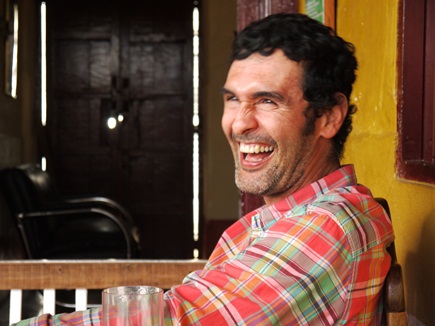
Pacho, aka El Chicharrón Peludo: Dancing around the Christmas natilla, day-dreaming of far-flung bike adventures while sipping Milo's coffee in Kaldi Kaffee, or dropping us on a dirt road climb in south west Antioquia – Pacho and Família López were at the heart of our Medellín experience…
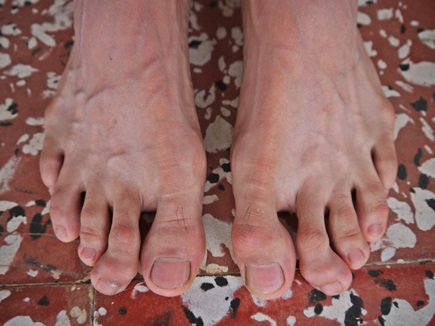
Pacho's feet:…even if his feet did make him look like he'd just stepped out of the lower reaches of the Magdalena.
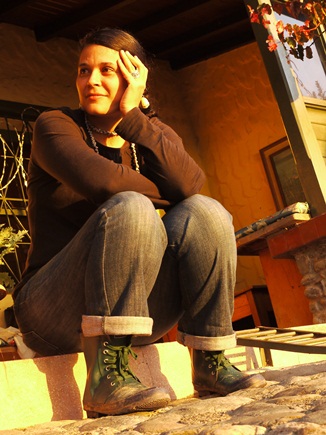
Catalina: Luckily his partner Catalina was always on hand to keep his feet covered, explain the latest double entendre which had left us baffled, and roll her eyes with her trademark “Ayyyyy nooooo, este Pacho!”
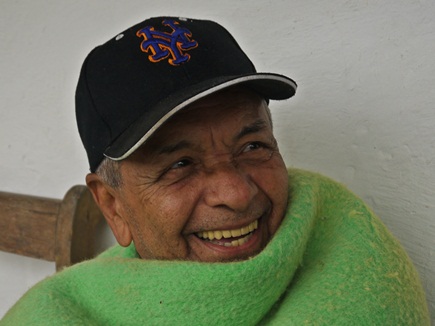
Don Raul: And if you wondered where he gets it from, meet Don Raul – Pacho's dad, and by far the most mischievous 82-year old I have ever met. Us two mugs roll in on bikes with funny accents and, well, let's just say we provided plenty of ammunition. A man whose infectious sense of fun was matched only by…
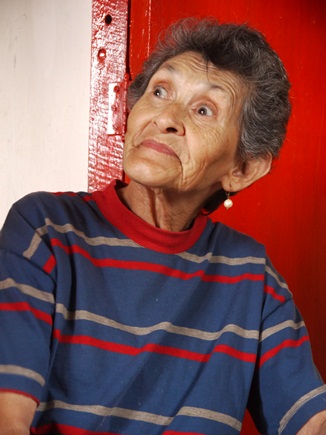
Doña Teresita:…the sweetness of his wife Teresita. A calm and heart-warming presence amidst the boys' banter, she would often suddenly appear beside you and give you an enormous, spontaneous hug. A truly wonderful lady.
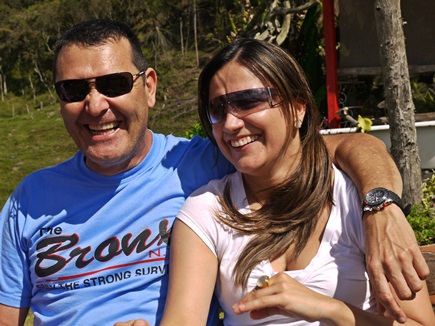
Raul y Lina: For me, no-one embodied the the irresistible Antioquian sense of slapstick humour and fun more than Pacho's brother Raul and his wife Lina. Put it this way – wherever we travelled, they always carried a remote-controlled whoopie cushion (yes, they exist) – and they weren't afraid to use it.
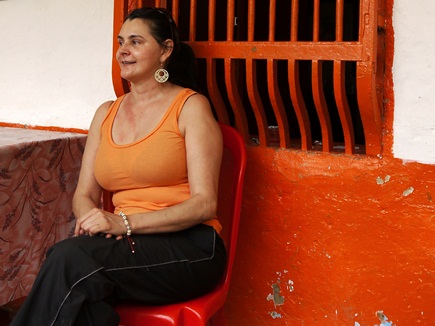
Marta: Pacho and Raul's long-suffering sister who lives in New York, and who we got to know while she was visiting. We took a ride out to the old finca outside Ciudad Bolívar where the kids grew up, where Marta sat in exactly the same chair on the same veranda she used to as a child. A moment full of memories for them, and special for us to watch.
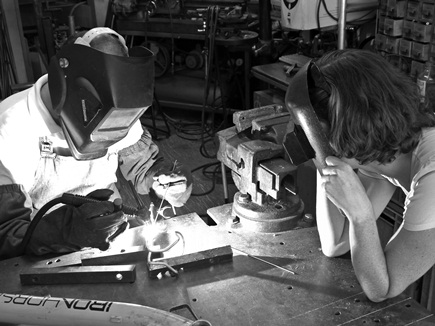
Tinno: “Steel is easy to love, because it loves you back.” So says the maestro of the forgotten art of bike frame building and Colombian legend, Tinno – who we were lucky enough to get to know during our time in Medellín. We loitered around his workshop, learned our first words of parlache (a Medellín slang), rode bikes together in the Oriente, and had our measurements taken just in case. You never know, one day we might find enough money to order our custom made Tinno bikes…
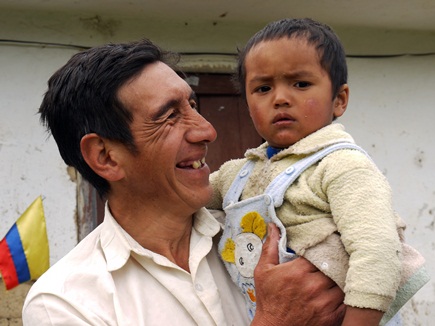
Sebastián y Eliseo: We spent some amazing nights in the Colombian campo, where we experienced warmth and humbling hospitality, from people whose lives are far more precarious than ours will ever be. I'll certainly never forget one night high on the páramo with Eliseo's family, huddled around their wood fire, laughing and sharing experiences of our different countries and cultures…
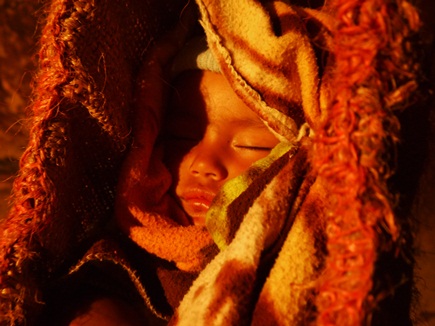
Sebastián:…while their newest-born, Sebastian, slept peacefully in a homemade hammock of knitted coffee sacks.
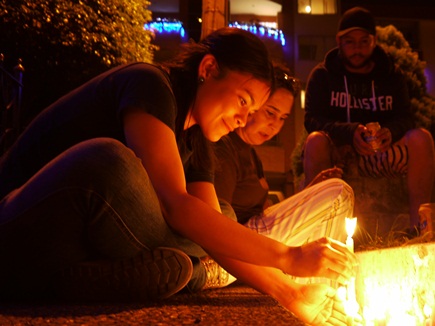
Nora: Our home for 3 months in Medellín, Los Colores was a haven of peace and tranquility. Our neighbours welcomed us like family, our landlady Nora was the perfect hostess, and we were tempted to sneak her pets into a pannier…
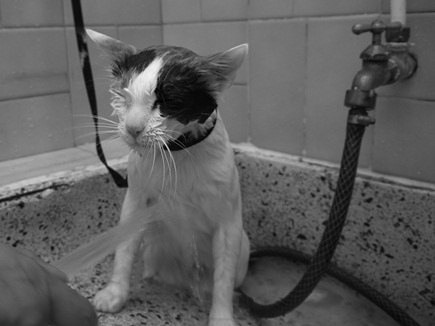
Agata:…none more so than her cat Agata, who definitely ruled the house – except when she was submitted to her fortnightly shampoo and rinse, when she definitely lost some of her cool.
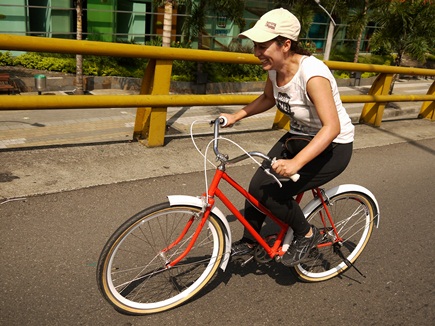
Ana Paulina: The definition of demure, Ana Paulina welcomed us into her wonderful family for Christmas with open arms, amazing fríjoles, world-class chicharrón and slightly too much tequila. Happy memories. We even managed to coax her back onto her long-neglected bike for a Sunday ciclovía.
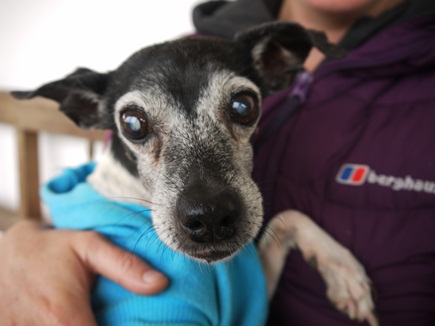
Peluso, aka Tembleke: After Bedders' farewell bite, dogs really shouldn't be on our list of Colombian highlights. However, the cute ones far outnumbered the vicious ones – from Don Mario's pack of 17 to Pacho's troop of six squeezed into the Turpial on the way up to Santa Elena. Peluso – 16 years old, half-blind, skinnier than a touring cyclist and with a constant tremble – stole my heart.
Mitad del mundo
March 12th, 2013
My head full of Colombia as we crossed the border at Tulcán, it was difficult to concentrate on Ecuador and what it might be like. Fit to burst at saying goodbye to a country I had fallen in love with and knowing that it would be a long time before I saw the friends I made there again, it was with some reluctance that I handed my passport over to gain entry into Ecuador.
Thankfully Ecuador had ample distractions waiting for me. We were instantly wooed by three successive days of beautiful dirt riding, and began to discover a wider range of tastier food with more flavour than we had recently enjoyed. The thrill of entering a new country came flooding back. After six months in Colombia, I had felt at home where things had become comfortable, easy. Now in Ecuador with a new currency, a new cuisine, a new backdrop, it was time to start discovering again.
As we got our bearings and adjusted to bigger landscapes with jaw dropping views, another moment grabbed my attention. There was a marker in our journey that I hadn’t really acknowledged, until we arrived right there, on the line…we had reached la mitad del mundo – the Equator. As we slowed to cross the line hand in hand – on bikes we had pedalled all the way from Alaska – I felt quite proud.
I realised that we can say that we have pretty much cycled halfway down the world, clocking up 18,200km in the process. Feeling impressed with that, and happy to be in Ecuador, I took a moment to mark the occasion with a big hug for my ever- patient riding partner, a celebratory munch on a banana (of course) and the obligatory poses for a series of silly photos on top of the line itself at the monument just outside Quito.
Sarah
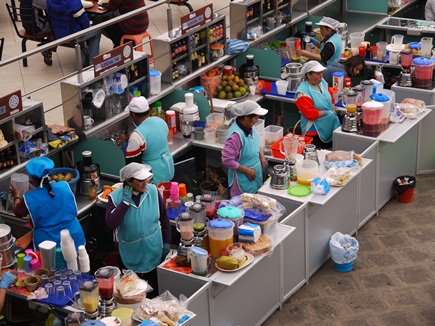
The border town of Tulcán isn't Ecuador's most picturesque place but its newly renovated market with delicious fruit juice stalls, free wi-fi and cheap set lunches were enough to give us pleasant welcome into the country.
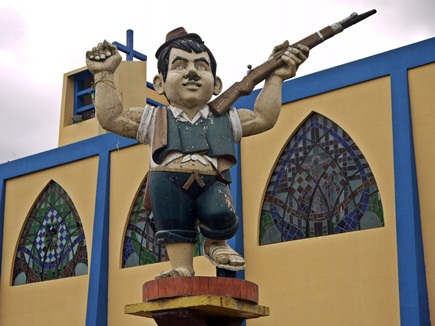
We'd heard from other cyclists of a road leaving Tulcán leading up into the páramo highlands that was found by looking for the statue of a dwarf resembling Hitler, brandishing a rifle outside a modernist church….with such weird and specific instructions we couldn't really go wrong and sure enough, we found the statue and followed our road…
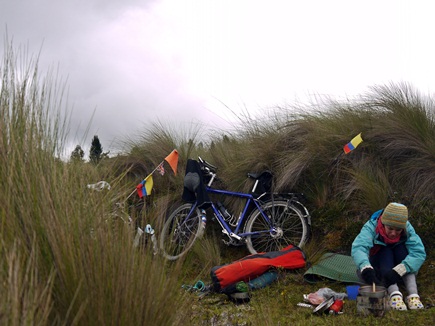
…to a remote camp spot at around 2800m where we dropped the bikes, put on all of our clothes and fired up the stove to make a hot chocolate in an attempt to warm up in Ecuador's cooler climes.
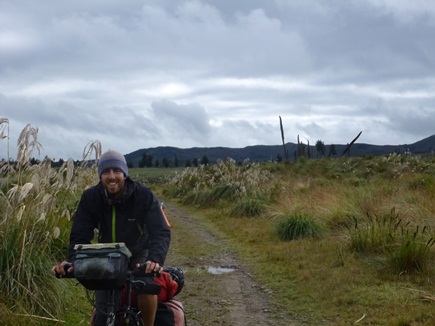
After a night of pure silence, camped under a blanket of crisp, crystal stars we were up early and raring to go across the páramo…
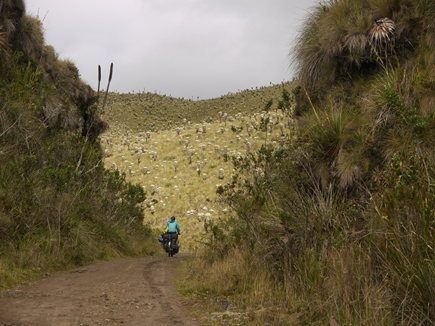
Around every corner these plants, which are only found above 3000m in Venezuela, Colombia and Ecuador, were waiting to welcome us….
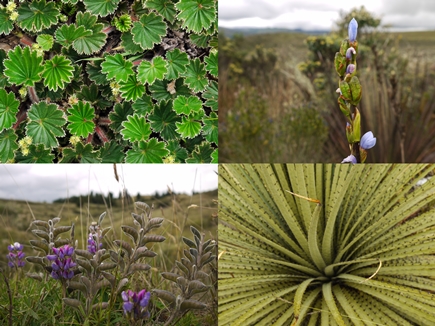
There are other species of plant that thrive here too…delicate colours and textures we were surprised to find in such harsh conditions.
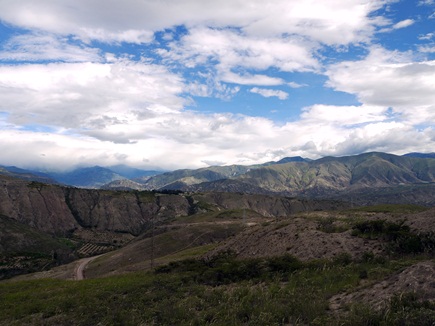
…down and down and into more rugged terrain that reminds us we have truly reached the Andes. Those mountains looming ahead of us today, will be the climbs we have to undertake tomorrow, and the next day, and the next day.
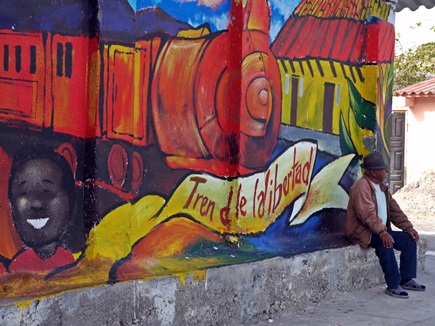
Reaching Salinas, just off the Pan American which we have (smugly) successfully avoided so far, we encounter a sleepy forgotten town on the edge of the mountains…
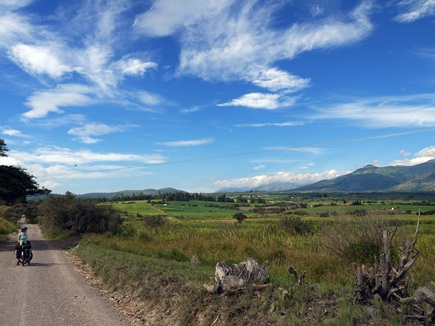
…and on leaving, in another attempt to avoid the main road, we kind of make up a route as we go along. Using Volcano Cotacachi as a landmark, we stumble upon the old route to Ibarra…
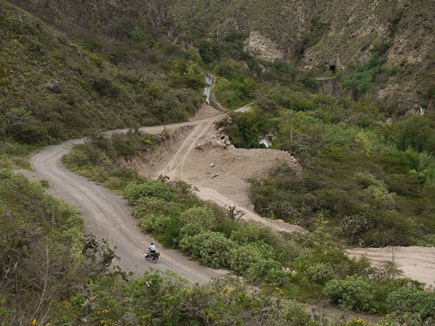
…which at first glance makes us think we've been a bit ambitious with our wanderings and we've hit a dead end. Beady eyed Jams spots an exit however and…
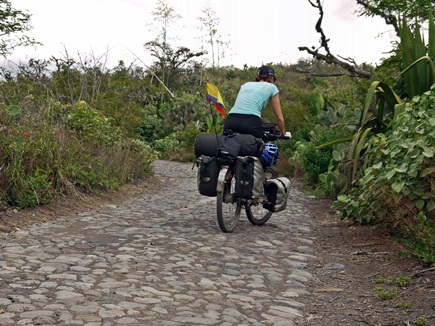
Throughout Central America, I wailed with discomfort whenever we reached a colonial town because it inevitably meant saddle-sore inducing cobbled streets. Imagine my dismay then at arriving in Ecuador to find that cobbled roads are not something reserved only for pretty towns here, but are seen as a legitimate road building technique. So it seems James will have to suffer much more of my complaining if all of the ascents ahead of us are to be cobbled.
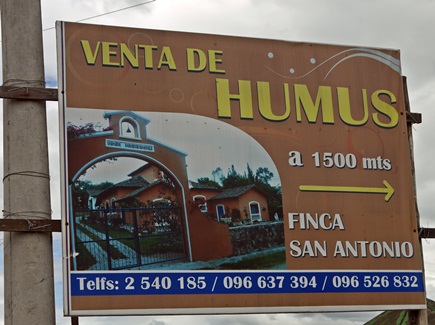
Excitement levels went up considerably when I saw this sign, thinking my favourite chickpea snack was for sale nearby…whilst I was salivating with anticipation, Jams helpfully pointed out that “humus” in this case is the Spanish word for soil…I know, I know, it's not even spelt the same way but after nearly two years of craving, you can't blame a girl for getting excited.
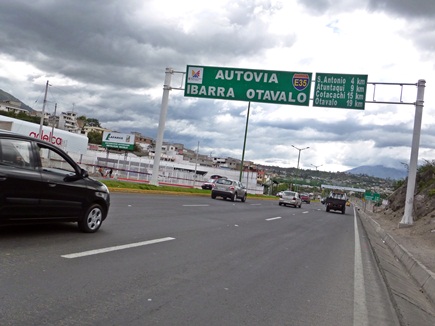
It couldn't have felt more different to our morning's ride when we hit the Pan American at Ibarra. From field tracks to four lane highway in just a few hours. Thankfully we only had to do 4km on this monstrosity before exiting again for a more peaceful route to Otavalo.
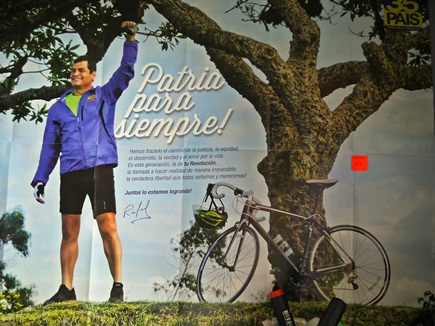
Along the way, we learned, from a helpful poster in a fruit and veg shop, that the current president of Ecuador, Rafael Correa, shares our passion for two wheels.
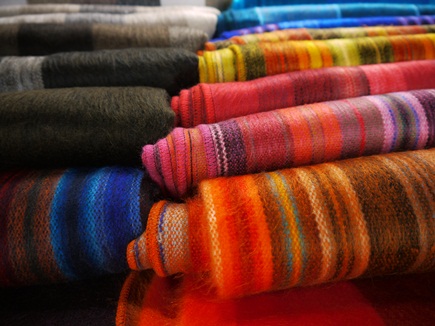
Ahead of us lie more mountains, greater altitude, more snow and colder weather than we will have experienced on this trip so far. We take the chance to stock up on woolly winter warmers in Otavalo, a town famous for a market selling deliciously snuggly clothing made from llama and alpaca wool.
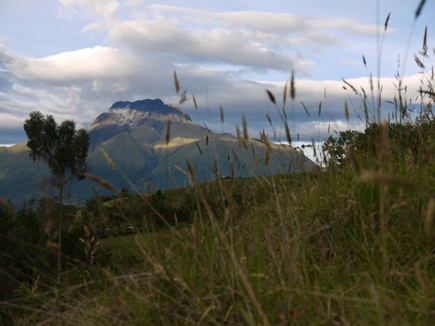
Another cobbled climb led us to a wonderful camping spot between two volcanoes. Looking right we had Imbabura standing majestically in the last of the evening light and…
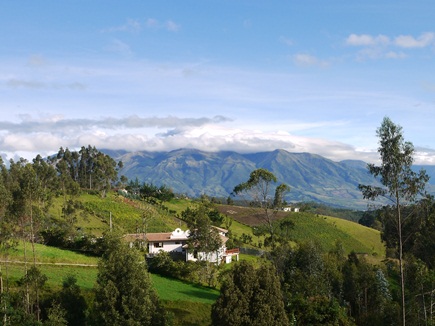
…looking left the summit of Cotacachi was shrouded in clouds but still there…looming from the other side. Ecuador, land of volcanoes.
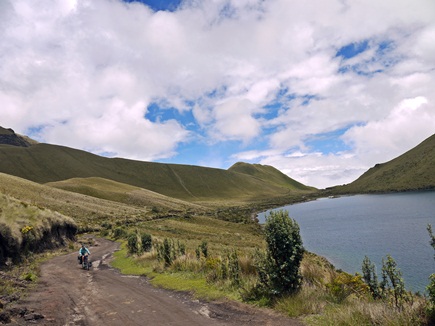
There are no pictures of our 14km cobbled climb up to the Lagunas de Mojanda, a series of lakes at 3700m, partly because it was extremely misty but also because it took every breath, every cell of the body to turn the pedals to get up there. We are definitely still adjusting to the altitude here, but it's all good training for when we expect to reach dizzy heights of 5000m in Bolivia. This was the first we saw of the lakes as we rounded the corner at the top of (what I thought was) the end of the climb.
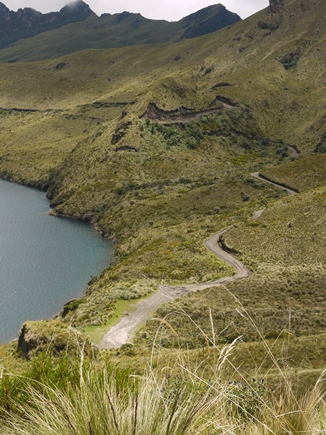
We had the place to ourselves and as the mist cleared and a deliciously warm sun showed itself, we followed the twisting path alongside these beautiful lakes.
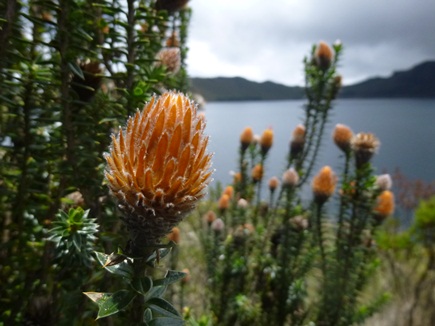
As with the páramo between Tulcán and El Angel, we were discovering stunning nature we'd never seen before. South America's version of thistles perhaps?
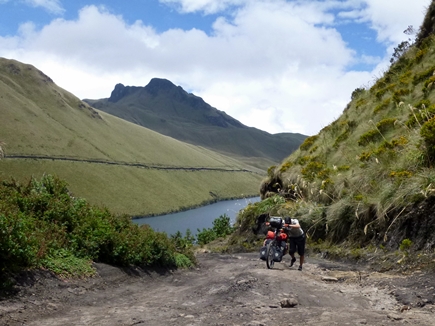
Rounding the lake, we were foolish to think the hard work was over and this steep section had us both off and pushing – we are thankful that we've got the weight of the bikes down as low as possible to be able to – just about – tackle tracks like this.
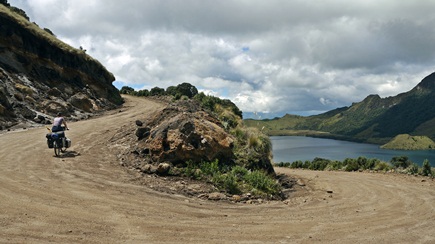
After lunch, sheltering out of the wind at an deserted tourist complex, the realisation slowly dawned on me that there was more climbing to come. If the lakes were in a basin, it was inevitable that we had to climb back out of it…steep grade on loose dirt after lunch…there was a lot of swearing. But at least the view was nice.
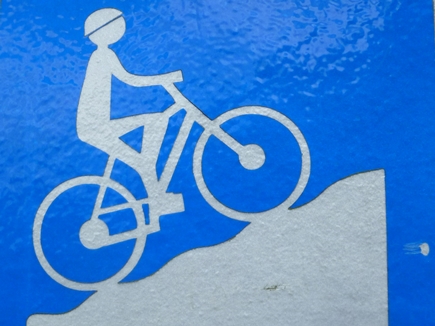
As I was choking to take in air when we got to the top, this sign managed to bring a grin to my face…a reminder, in case we needed it, that cyclists can expect steep climbs on uneven surfaces around here.
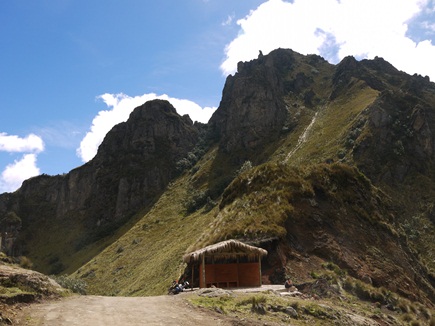
Finally we reach the top and at 4000m it's the highest climb of our trip so far. The rugged backdrop, fluffy white clouds and bright sunshine make it all seem worth it…
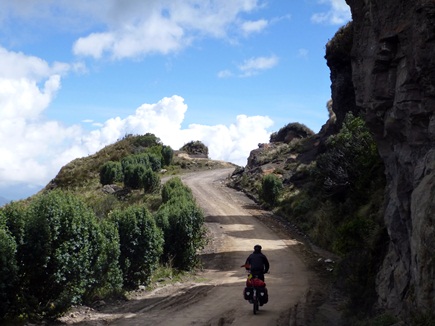
Setting out on the descent to Tabacundo, James looks as thought he's about to ride right off the edge and into the clouds.
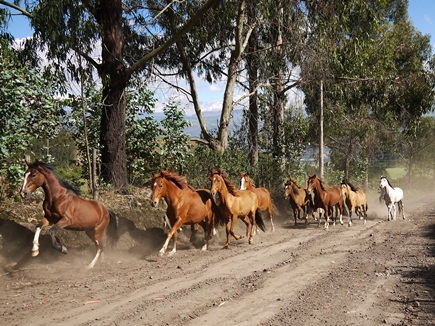
Halfway down the descent we are stopped in our tracks by a team of horses who demand all the space on the road as they gallop on by.
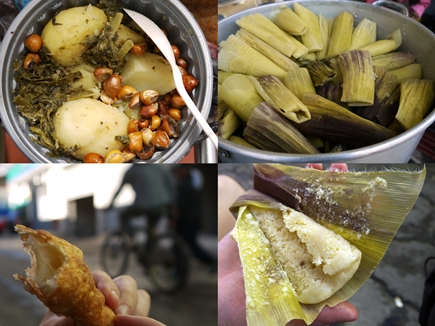
Arriving in Tabacundo, we decide it's time to try out some Ecuadorian snacks and we waste no time in ordering one of everything…so we can make some discerning choices of course. Clockwise from top left: potatoes with greens and toasted maize, wrapped humitas (maize dumplings with cheese and sugar), an unwrapped humita ready for eating and cheese empanadas…thankfully, everything was yummy and passed the test.
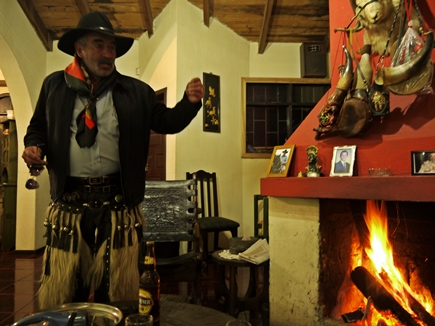
While I was stocking up with veg at the market, James was approached by Germán who runs a paintballing ranch just outside Tabacundo. He generously invited us to camp at his house where he and his wife Fabiola made us incredibly welcome. We were treated to an open fire, beer and delicious food, and even an exclusive performance of traditional costume and local dancing – usually only seen at the month long festival for St Peter and Paul held in June.
Snuggle up
March 31st, 2013
It’s been a chilly couple of weeks, mostly because we’ve been cycling around some of Ecuador’s highest points. Leaving the comfortable casa de ciclistas (and the perpetually generous Santiago and family) in Tumbaco near Quito felt like leaving a micro climate. Warm days – with sunshine and birdsong – and cool nights – perfect for sleeping in our tent in Santiago’s garage – gave way to snow-capped volcanoes and icy winds.
Climbing up to Volcán Cotopaxi and then up again to Lago Quilotoa had us digging out every scrap of warm clothing we’ve been carrying, and developing a new found respect for those who live their lives at high altitudes.
Sarah
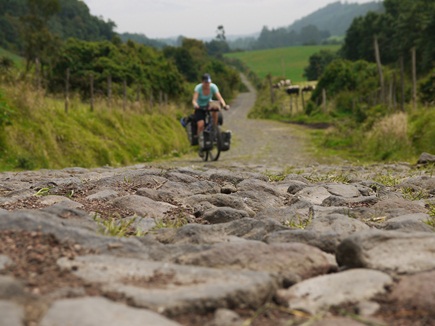
Cobbles keep you warm. A massive cobble sceptic, I found that they do have a benefit after all…tackling a 15km climb on cobbles definitely maintains a cosy body temperature.
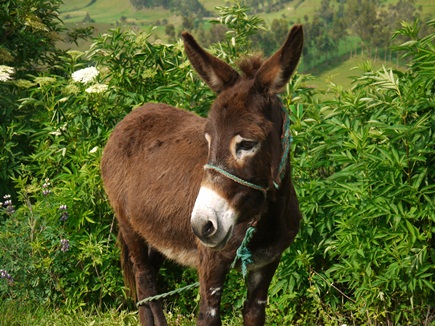
This donkey, just near volcano Cotopaxi, has just the right amount of snuggly fur to keep a smile on his face…ascending higher, the donkeys put on more fur, getting shaggier and hardier.
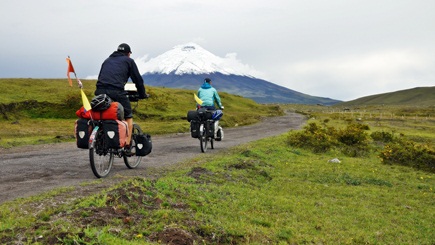
On the approach to Volcán Cotopaxi = layer up with all the clothes you've got and then sit back, pedal and enjoy the view. Riding your bike doesn't get much more spectacular than this.
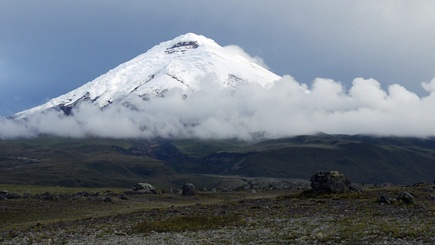
Determined to soak up this incredible view, we search around a boulder field for a good sized rock to shelter behind…
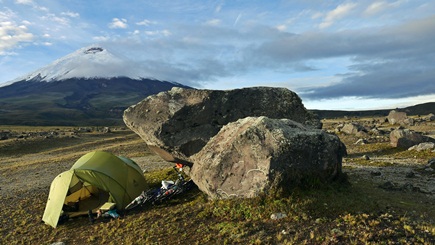
Not all of our campsites are as idyllic as this and we were so lucky that the volcano came out to play having been shrouded in cloud for most of the day.
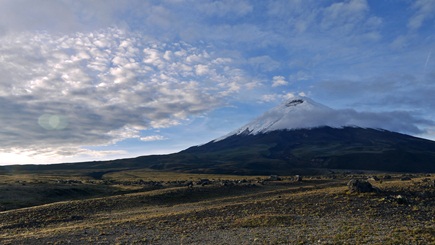
With just a few clouds and soft morning sunshine, Cotopaxi knows very well how to show off all of its 5897 metres.
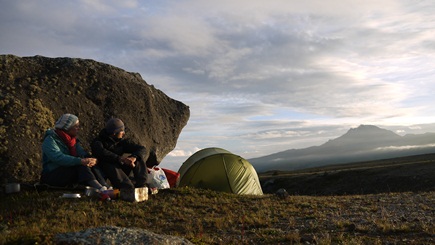
Never more grateful for our trusty little stove, we are making hot drinks throughout the day to keep warm. A shame then, that on this particularly crisp morning, we run out of fuel for our stove and have to abandon plans for coffee and porridge.
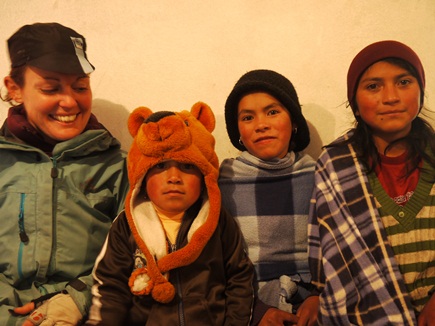
Arriving in the bleak little village of Yanaurcu Grande, we find Patricio pushing his five year old daughter home in a wheelbarrow. Everyone shelters together in his little shop from the miserable weather and then he kindly invites us to camp at his place across the square.
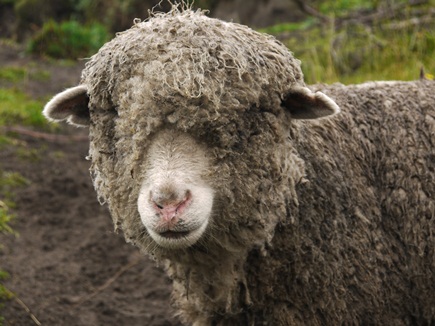
Not only bears trying to stay snuggly around here. The sheep in this neck of the woods have developed a dashing furry coat to keep the warm in and the chills out…quite how they manage to see anything is another story.
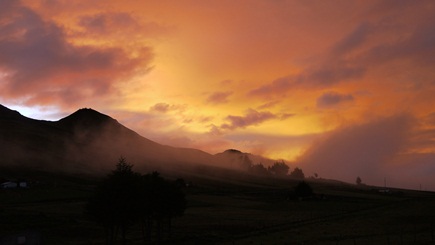
Camping in Patricio's sheltered yard is a blessing as the mist rolls in and the rain comes down; not before the day goes out with a spectacular sunset…
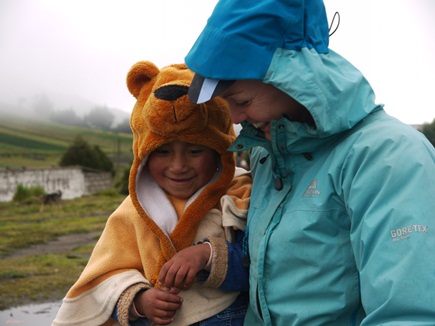
…and then an early morning farewell. Standing in the rain, with La Osita perched on my bike, we have a last minute giggle and wave goodbye before disappearing into the mist. The little bear is off to school and we are headed for the Quilotoa Loop, a series of roads taking us past Lago Quilotoa, a crater lake at 3800m.
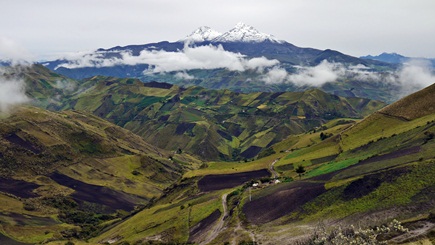
Climbing out of Yanaurcu Grande, another volcano comes into view. The snow covered twin peaks of Illiniza.
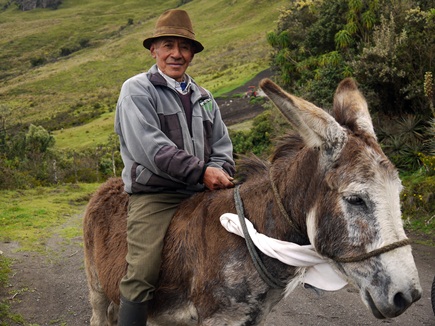
On a bitterly cold descent to the village of Isinliví, we meet Patricio's father coming towards us on his donkey. With only the traditional felt hat common in these parts and a fleece jacket to keep him warm, I am surprised he's not shivering away like us.
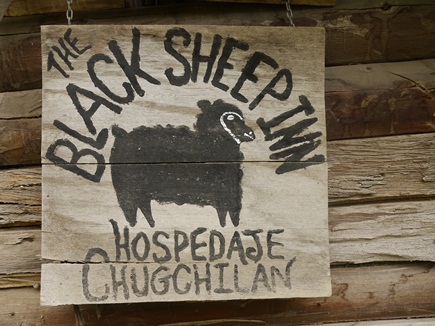
After a couple of nights camping in the cold, we're grateful to come indoors at Chugchilán. Thanks to a very generous gift from Raul & Lina in Medellín, we can splash out and spend a night at the lovely Black Sheep Inn…
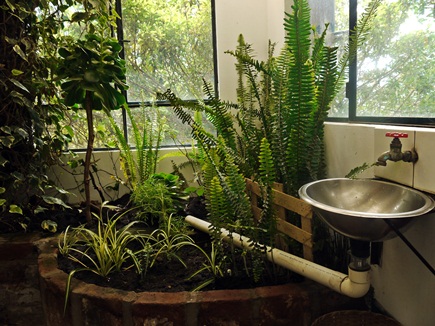
…where the eco-tourism credentials are impressive. Recycled rainwater feeds a living flower bed in the toilet…
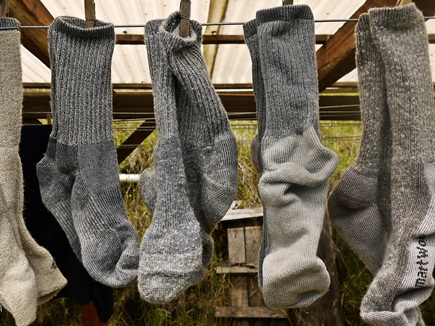
I am half tempted to pinch a pair of these snugglies while we are at the Black Sheep. My thick smart wool socks are currently my most prized possessions and seeing these beauties all lined up makes me crave a second pair.
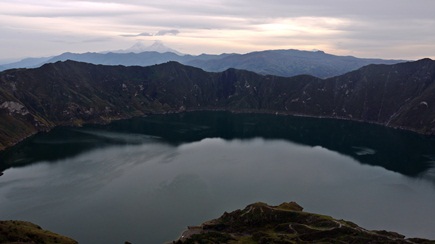
Half a day's climbing through ugly roadworks and in freezing rain brings us to the beautiful Lago Quilotoa. We're not lucky enough to see the famous turquoise colours in the water but we do catch it at sunrise the next morning with Illiniza lurking in the background.

We visit the colourful Saturday market in Zumbahua and take note of how the locals wrap up against the cold. I'm still not convinced that the trademark felt hats worn in these parts are enough to keep you warm but teamed with a colourful poncho and layers of blankets, they do look very fetching.
Rollercoaster to Riobamba
April 2nd, 2013
There’s something about the first couple of hours riding every morning. For me these are the golden hours, the times when my head is full of freedom and optimism, and I feel like I could just keep riding and exploring forever.
The early morning caffeine has kicked in, and every sense is heightened, on edge. I fill my lungs with clean, crisp mountain air. My legs feel fresh, the fatigue of yesterday’s riding long forgotten. The gradients which had me wobbling to grind out the last few kilometres the day before no longer feel so steep. Even my bike feels lighter – now part of me, rather than just a heavy weight trying to drag me back down each hill. Pedalling seems like the most natural state in the world; the possibilities endless.
This is when the Andean light is at its best; a pure, high altitude light in which colours become more vivid and objects more alive than I’ve ever seen before. An Ecuadorian colour palette: the cobalt blue of the sky and the rich greens of the patchwork fields, broken only by the splashes of red or purple from the shawls of figures high on the hills.
Old men in ponchos grin, and doff their felt hats as we ride past. “Pa’ dónde van?” (“Where are you going?”) they ask, twisting their palm upwards in that questioning latino way. We shout the name of the next village, and they just laugh. “En bici?! Suerte!” (“By bike?! Good luck!”). Pigs on leads run through the streets, driven out to pasture for the day by children wielding sticks. Toothless old ladies suddenly pop up out of the verges, knitting in hand while they watch over their roadside flock of sheep, goats or llamas.
And it is always on backroad rides like this one from Quilotoa to Riobamba that I feel my early morning freedom most intensely. This route was no exception; a real rollercoaster through beautiful valleys, sleepy villages and lively markets – all with a healthy dose of mud and lung-busting Ecuadorian climbs thrown in for good measure.
A big thank you once again to Cass Gilbert for trailblazing this route, and for tempting us off the tarmac and onto the dirt with his account.
James
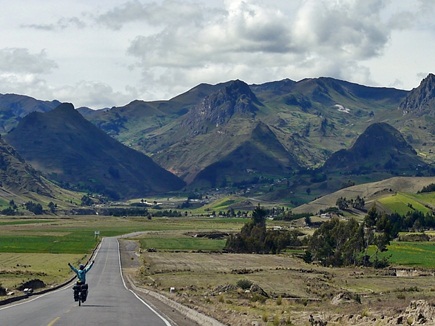
Not many rides in Ecuador start like this: a smooth, fast descent from Quilotoa…
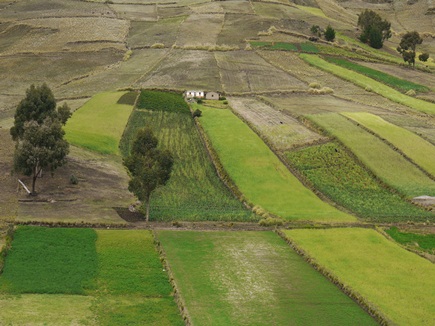
…past more of those classic patchwork fields of green…
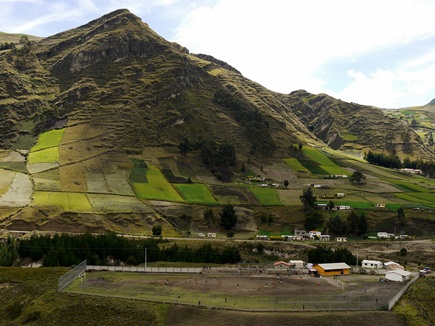
..and towards Zumbahua, where we'd visited the market the day before. Today, the town feels sleepy, hungover even – but not enough to stop Sunday League football, which is in full swing against a looming Andean backdrop.
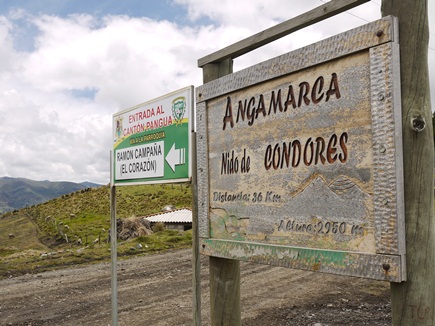
From Zumbahua, we wind our way slowly up on the paved road towards Quevedo, before turning off onto a dirt road across the páramo towards Angamarca – “Nido de Condores”, or “The Condors' Nest”.
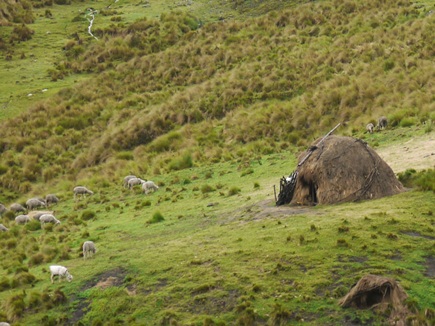
As the road winds its way up past thatched shepherds' huts, the clouds close in, the rain begins to fall and we start to get that cold and wet páramo feeling. A bus driver stops to ask where we are headed. “Angamarca!” we reply. He bursts out laughing, and rolls on.
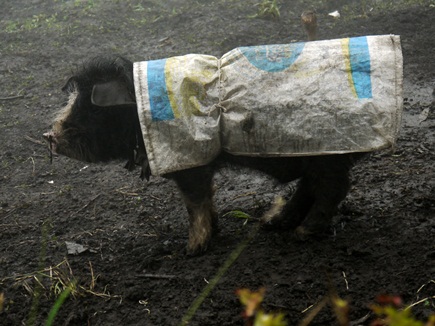
Eventually we hit the top of the pass and begin a freezing descent, pausing to defrost our fingers and admire this Superpig in his fertiliser bag cape. You know it's wet when even the pigs are wearing their rain gear…
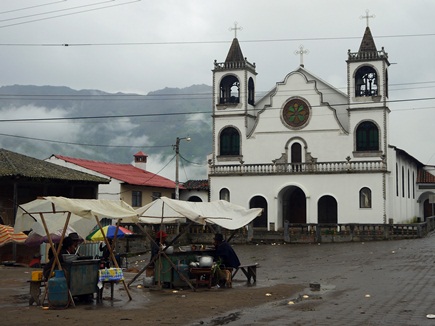
…and we are truly sodden by the time we roll into Angamarca. We get lucky – it turns out the village is home to an Italian mission, and the priest takes pity on the two soggy cyclists asking for permission to camp on his very nicely-tended lawn. Within half an hour we are set up with bunk beds, sipping espresso and tucking into a pasta meal. Grazie mille Padre Bautista e Mario!
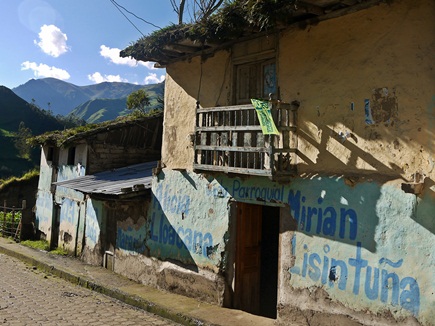
The next morning the sun is shining, revealing Angamarca in all its tumbledown, friendly charm.
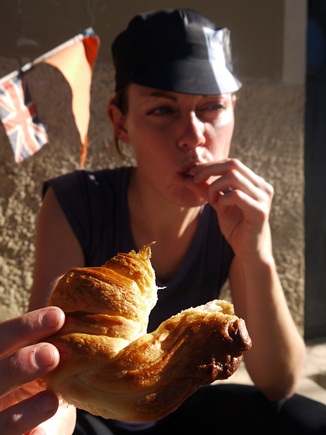
We head for the village bakery to begin our daily search for cheap, filling calories. To our delight, Ecuador seems to have far more sophisticated bakery tastes than Colombia. Baguettes, brown bread that's not sweet, and, best of all… croissants, or cachos as they are known here. We sit in the sunshine and devour a batch fresh out of the oven.
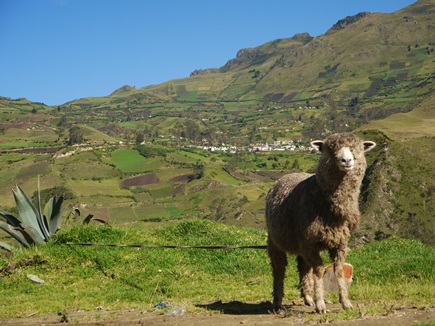
From Angamarca, the Cordillera begins to drop away towards the coast, and we descend – past sheep, cows and goats brought out to the roadside to graze, watched over by young children and old ladies…
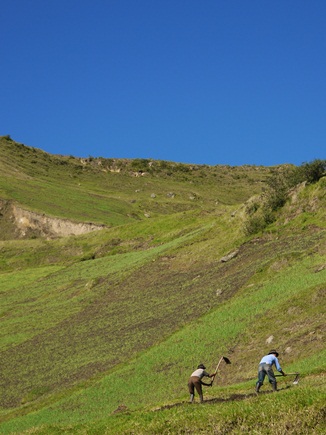
…and past farmers working the impossibly steep fields. Before reaching the town of El Corazón, we turn off in Pinllopata onto a seasonal track which should lead us towards Simiátug.
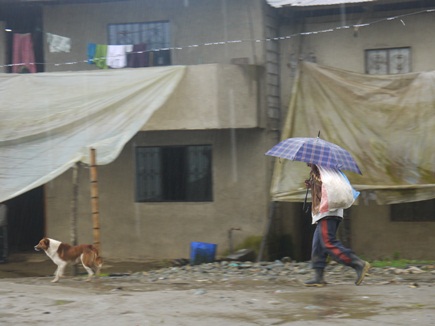
Just as the now regular afternoon deluge begins, we make it to Quishpe, a sorry cluster of houses draped in plastic sheeting for the rainy season. We shelter in the porch of Maria's shop, and watch as the basketball court where we are planning to camp begins to fill up like a swimming pool…
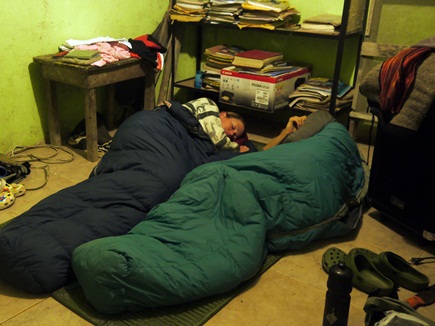
…and so when Maria offers us a spare room to roll out our mats, we are quick to accept.
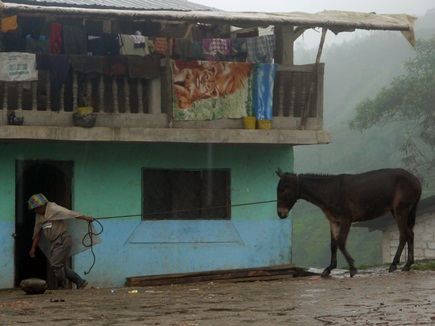
The next morning the rain is still falling, and even the donkeys are refusing to budge. Gradually though, the downpour eases and we set off nervously, expecting a mud-bath…
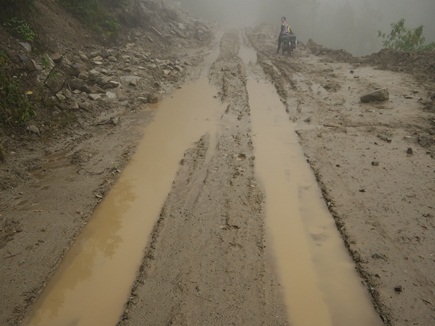
…and we're not disappointed. Luckily though, most of the route is still rideable…
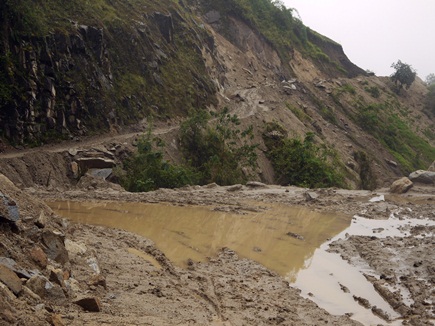
…give or take the odd minor landslide, which calls for a bit of push and shove. Somewhere under here, there is a track.
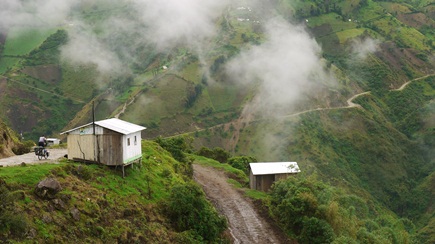
By mid-morning the clouds begin to disperse, breaking the misty bubble we have been riding in, and revealing the road snaking ahead, ever upwards.
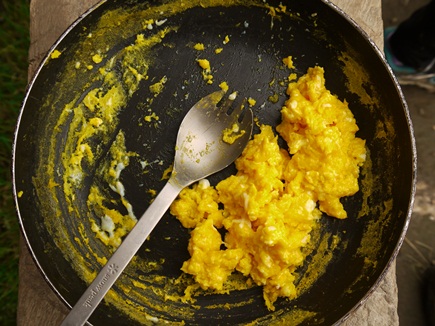
By Mindina, a calorie crisis is looming and we set about finding the village shop. It's dusty and half-empty, but with the stove on hand you can always rely on bread and eggs to plug the gap. Possibly the yellowest eggs I have ever eaten – somehow I think they may have been free-range.
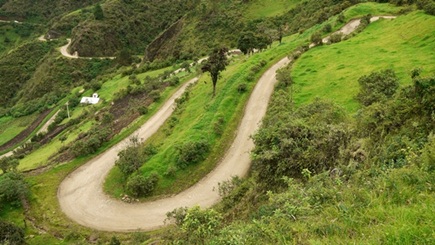
We had been warned that this leg to Simiátug had a sting in the tail, and so it proves. Some very thoughtful, very un-Ecuadorian switchbacks provide the warm up; followed by a far more typical, brutally steep and direct last few km into Simiátug.
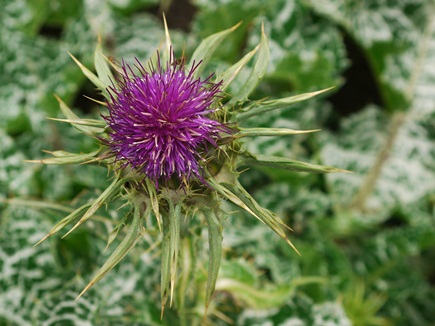
The scenery as ever does its best to distract, as we crawl our way up through a beautiful lush valley peppered with wild flowers. Not for the first time in Ecuador, it feels like we had been transported back to Scotland or the Lake District.
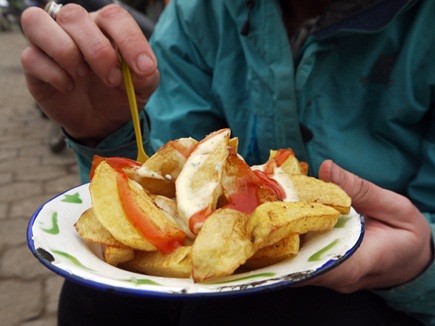
Gourmet street food, Ecuadorian style. After days of fantasising about chips (our food fantasies go through these phases), we make it to Simiátug and Sarah finally gets to indulge. It definitely feels like we've earned them.
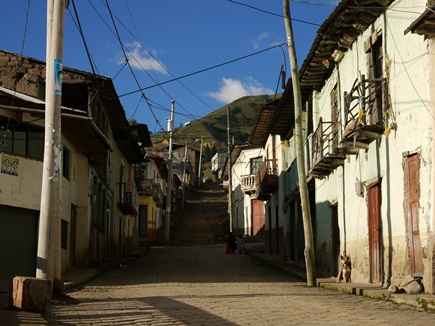
After a night snoring peacefully on the floor of the office of the Ministry of Agriculture (long story), we set out to explore Simiátug in the morning sunshine. It's a friendly, well-worn place – all ramshackle wooden balconies…
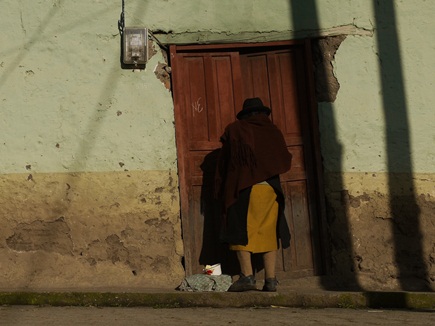
…peeling walls and intriguing doorways.
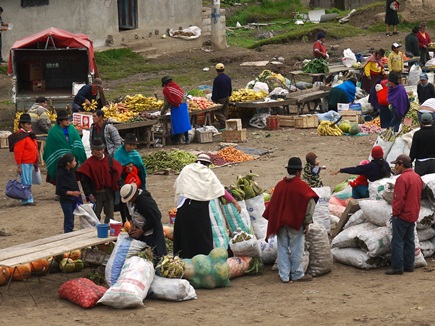
By pure luck, we've managed to coincide with the town's weekly market. It's by far the least touristy and most interesting we've seen so far – piles of fresh veg laid out on simple wooden tables…
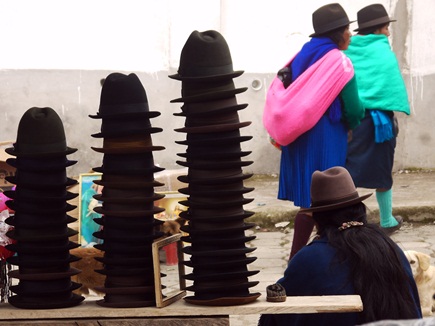
…and the effortlessly cool Ecuadorian felt hats. Gringos need not apply.
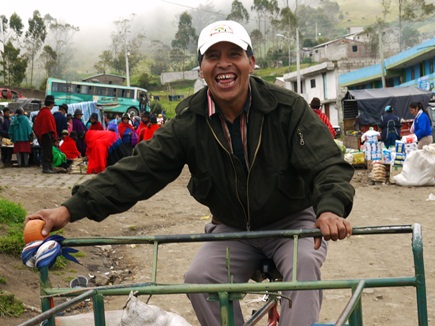
Forget poncy cycle tourists, these guys are the real heroes of the Latin American cycling world. They spend all day every day hauling massive loads on their cargo bikes – and still manage a friendly grin.
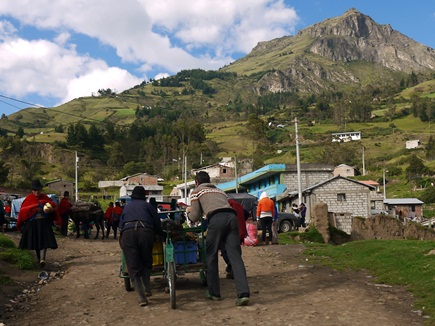
We come across a guy who must be in his seventies struggling to push his bike loaded with chairs, tables and salted fish up the slope into the market place, and so I offer to lend a hand. Don't worry, I say, I've had a bit of practice at pushing heavy bikes up hills around here.
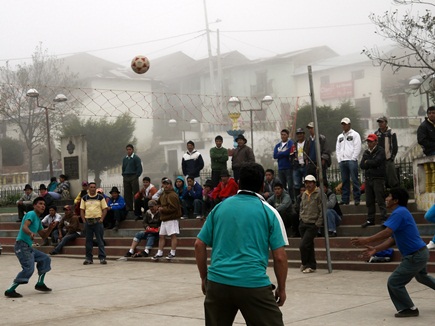
Back in the main square, the local volleyball tournament is in full swing as the mist rolls in. This seems to be Ecuador's national sport, with courts squeezed into flat spaces in even the most tiny of villages.
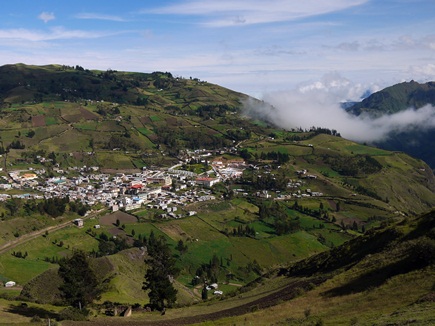
The next morning, we set off towards Chimborazo and Riobamba, hoping to make it in time for Easter. In accordance with Bolívar's First Law of Andean Town Placement, Simiatúg is conveniently nestled halfway up the mountainside – meaning that as well as a climb into the town, we are treated to a climb out of it as well…
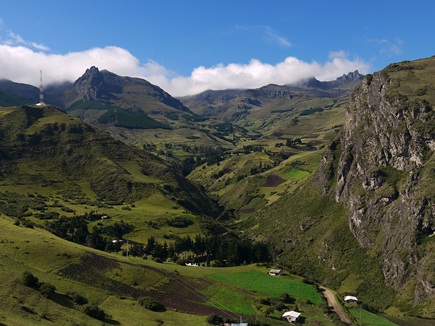
…up towards the distant radio masts.
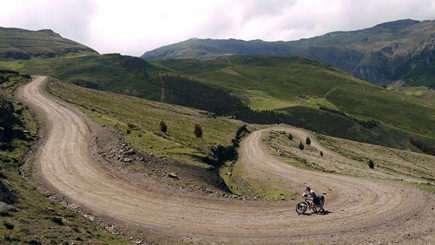
Even on rested legs, it's not easy, gaining 1,000m over just 14km into a vicious headwind…
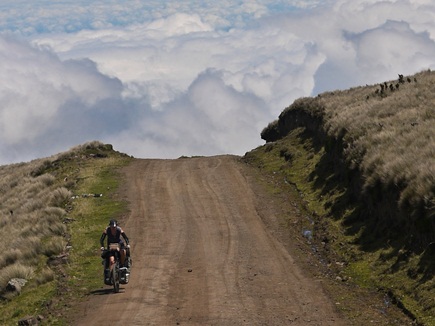
…but by the top, we really are up above the clouds. At least, you'd think, we'd be rewarded with a decent descent…which we are – except it's cobbled. And so after 10km of truly unsatisfying, bone-rattling descent, we pop out onto the Vía Flores, feeling like we've just stepped out of a blender.
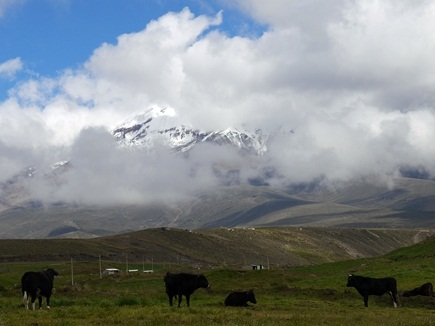
However, this is where we do get our reward – a first view of the snow-capped Volcán Chimborazo, the highest point in Ecuador's chain of volcanoes at 6,310m.
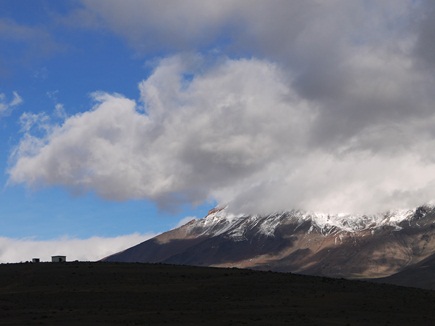
With time running short, we decide to take the paved loop around Chimborazo instead of the tempting dirt option through the middle. It turns out to be a good decision, as we are treated to spectacular views of the mountain in the evening light…
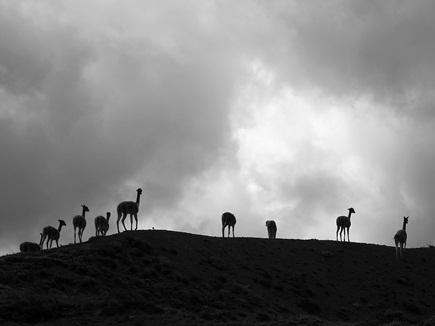
…with herds of beautiful vicuñas (a wild, more athletic type of llama) grazing on the lower slopes.
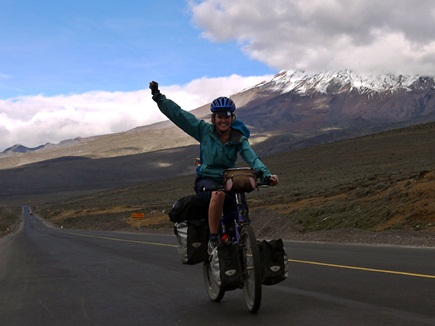
Surely we're allowed at least one cheesy “girl conquers volcano” shot, right? Go Bedders!
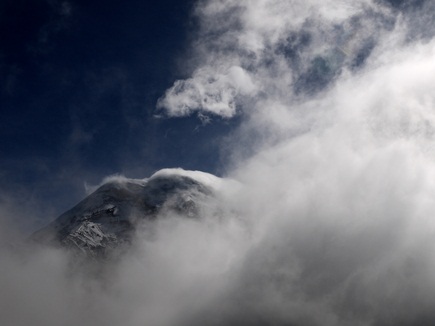
After probably our most freezing night to date sleeping in the half-constructed Chimborazo visitor centre at 4,350m, all that's left the next morning is an easy coast down towards Riobamba – but not before Chimborazo allows us a sneaky summit glimpse in the early morning light.
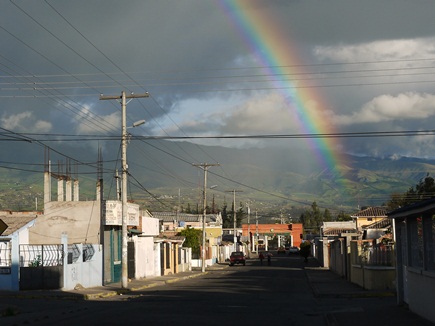
We roll into Riobamba on Good Friday, hoping to sample the traditional Ecuadorian Easter dish of fanesca – a soup made with 12 different grains and topped with cheese, salted fish and boiled egg. Within minutes of arriving, Ecuadorian hospitality strikes again – we are adopted by Ruperto, and spend a brilliant afternoon with his family of 40 sampling the fanesca they have spent the last two days preparing.
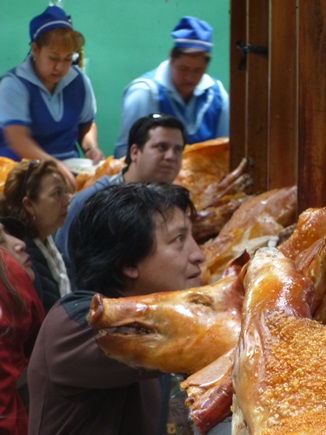
Appetites still raging, on Easter Sunday we head to the market to experience another Ecuadorian culinary tradition: chancho horneado, or roast pig. It's like a scene from a vegetarian horror film – imagine a room with wall-to-wall pig heads and parts, presided over by ladies in blue surgeons' uniforms wielding huge carving knives. Now I know what happens to all those roadside pigs – but it has to be said: the crackling is to die for.
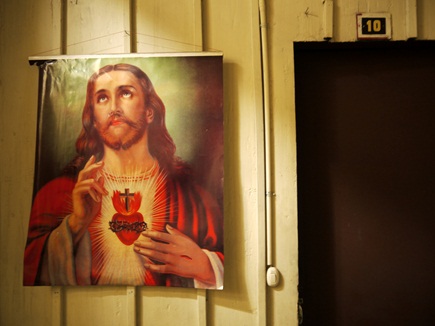
Finally sated, we head back to our characterful hotel room, which – in keeping with the Easter theme – is presided over by a beautifully coiffeured Jesus. “Please Lord,” he seemed to be saying…”Just spare them the cobbled descents.”
Route tips:
We used Cass Gilbert’s excellent route description in the Need to Know section of this blog post.
In Angamarca, we found out about a more direct up-and-over dirt route to Simiátug. This would have avoided the descent to Pinllopata and subsequent climb back up, but we were told that it would be pretty much impossible in wet season with heavily-loaded bikes. It sounded like it could be an interesting dry season alternative though.
We were also sorely tempted by Cass’s dirt route between Volcán Chimborazo and Carihuairazo, but in the end opted for the paved, more direct option into Riobamba. The cobbled descent from Simiátug drops you onto the Vía Flores (a paved, quieter road out of Ambato). Turn right and it’s about 10km to the main Ambato-Guaranda Road, where you can then pick up the loop road towards Riobamba. The first Chimborazo refugio is not at the park entrance as we thought – it’s another 8km of dirt uphill. Luckily, the guards allowed us to sleep in the half-finished new visitor centre, as we arrived just as it was getting dark. It looks like this visitor centre will also have accommodation eventually though.
